OF THE













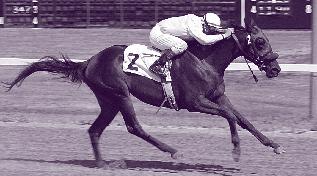














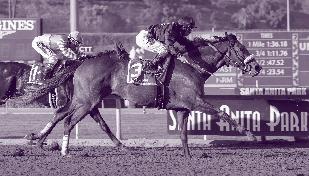

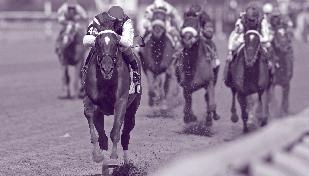

















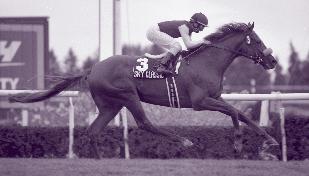


CELEBRATING THE MOST DISTINGUISHED CANADIAN-BRED THOROUGHBREDS OF THE PAST 50 YEARS




















































CELEBRATING THE MOST DISTINGUISHED CANADIAN-BRED THOROUGHBREDS OF THE PAST 50 YEARS
CELEBRATING THE MOST DISTINGUISHED CANADIAN-BRED THOROUGHBREDS OF THE PAST 50 YEARS
© Copyright 2024 The Jockey Club of Canada
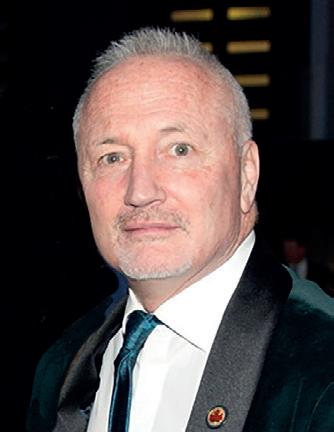
Throughout 2023 and into 2024, we have been celebrating the 50th anniversary of The Jockey Club of Canada. In honour of this milestone, we are proud to present “50 of the Finest”, a collection recognizing the most distinguished and breed-shaping Canadian thoroughbreds of the past half century.
The selection committee surveyed the past 50 years and put together a “short list” of horses for consideration, then conducted a vote among our members to determine the horses they felt best fit the criteria. Because of the considerable success of so many of these equine athletes we have also added a section which includes “Honourable Mentions and Ones to Watch”.
While there are numerous breeders and owners from coast to coast that have horses included in this compilation, the legacy of families led by Mr. Ernie Samuel, Mr. Gustav Schickedanz, Mr. Steve Stavro, Mr. Frank Stronach, Mr. E. P. Taylor (our founder), and Mr. Donald “Bud” Willmot and Mr. David Willmot are perhaps most noteworthy and must be considered exemplary by any international standard.
Our industry is not without considerable challenges, but we have a legacy of greatness to build on that includes the peerless Northern Dancer.
On behalf of the members of The Jockey Club of Canada, we hope you find this publication informative, entertaining, and an inspiration to further explore the legacies of these outstanding horses and this remarkable industry.
Yours Sincerely,
R. Glenn Sikura Chief Steward, Jockey Club of Canada
Edward Plunket Taylor founded The Jockey Club of Canada in 1973. It was one of his many significant initiatives to promote and support thoroughbred racing and breeding in Canada.
His involvement with racing and breeding was transformative: He forever changed the profile and impact of Canadian racing and breeding in the eyes of the world. What we experience today in our successes as Canadians involved in this pursuit are the direct result of his vision and determination.
A successful inventor, entrepreneur, and business leader, he was introduced to thoroughbred racing while studying at McGill University in Montreal. He started racing thoroughbreds through Cosgrave Stable in the 1930s, winning the 1938 Breeders’ Stakes and Maple Leaf Stakes with future Canadian Horse Racing Hall of Fame inductee Mona Bell.
He and his wife, Winifred, began breeding thoroughbreds in the 1950s. They imported stallions from the United States, most notably Chop Chop, the sire of four Queen’s Plate winners, including Canadiana and Victoria Park.
Along the way, he employed his talent and experience in business to consolidate and upgrade racing in Ontario, closing antiquated tracks and focusing racing in Toronto and Fort Erie. In 1956, he opened Woodbine Racetrack on what was then the outskirts of Toronto. The “new” Woodbine replaced “old” Woodbine, which was renamed Greenwood. Canadians had a newly built world-class racing venue that could accommodate 40,000 spectators.
In the spring of 1960, Natalma, bought by Mr. Taylor as a yearling at the Saratoga yearling sale in 1958, had her racing career end prematurely. Though late in the breeding season, he decided to send her to his first crop stallion, Nearctic. The resulting foal would make history on the racetrack and in the breeding shed as Northern Dancer. Northern Dancer was little more than 15 hands, but his impact on the breed continues to be gigantic.
Mr. Taylor was the first person to breed the winner of the Kentucky Derby and the Epsom Derby. Northern Dancer had won the 1964 Kentucky Derby and his son Nijinsky II, from his second crop of foals, won the Epsom Derby in 1970. Since that time, Northern Dancer and his sons and daughters bred by Mr. Taylor have shaped the breed worldwide.
Widely respected in the thoroughbred industry, Mr. Taylor's Windfields Farm is considered the most successful breeder in the history of thoroughbred horse racing. His relationships in the world of racing and breeding provided Woodbine patrons with the privilege of seeing one of the all-time greats of racing close out his career there. Penny Chenery, as a way of thanking him for the very helpful direction he provided her family in their bloodstock dealings, brought Secretariat to Woodbine for the 1973 Canadian International.
The members of The Jockey Club of Canada are deeply indebted to Mr. Taylor’s legacy and honour him on the 50th anniversary of the Club’s founding.
Northern Dancer has been called by bloodstock commentators and analysts the greatest sire of the 20th century, the greatest sire of the past 100 years, and, by some, the greatest sire in the history of thoroughbred breeding and racing.
Northern Dancer was born, raced, and retired to stud in the decade that preceded the founding of The Jockey Club of Canada in 1973.
We honour him with this primary position in our selection of the 50 of the Finest because of his profound impact on thoroughbred breeding – in Canada and around the world.
Northern Dancer is a national treasure, exemplifying the best qualities of Canadians – determination, pluck, and excellence on the world stage.
Among the thoroughbreds in this compilation, 34 of them are descendants of Northern Dancer through their sire or dam or both. The earliest foaled are sons or daughters of Northern Dancer. Then they proceed through second, third, fourth, and fifth generation offspring. This is typical of the thoroughbred population where close to 70% trace their lineage to Northern Dancer.
It’s somewhat common knowledge how his racing career began. Offered in E. P. Taylor’s annual yearling sale for a reserve of $25,000, he failed to sell. Prospective buyers were dissuaded by his small, but stocky stature and his late, May 27, foaling date.
Mr. Taylor sent him to trainer Horatio Luro who developed him to win the 1964 Kentucky Derby and Queen’s Plate – the first Canadian-bred horse to win the Derby and the only one to win both the Derby and Plate. The Dancer would attempt, unsuccessfully, to win the American Triple Crown, finishing third in the Belmont Stakes. In a two-year career of 18 races, he won 14 times – 10 stakes –and never was worse than third. He was Canadian Champion Two-year Old Colt in 1963, and Champion Three-year Old Colt in the United States and Canada and also the Horse of the Year in Canada in 1964. In 1999, Northern Dancer was named 43 on The Blood-Horse list of the top 100 thoroughbred racehorses of the 20th century.
Northern Dancer was inducted into both the Canadian Horse Racing Hall of Fame and the National Museum of Racing and Hall of Fame in 1976.
His career as a stallion is unparalleled. He made his mark quickly and dramatically. In his second crop was Nijinsky II, the winner of the English Triple Crown in 1970. It had been 35 years since the last Triple Crown winner, and it has not happened again. His success propelled the interest in North American
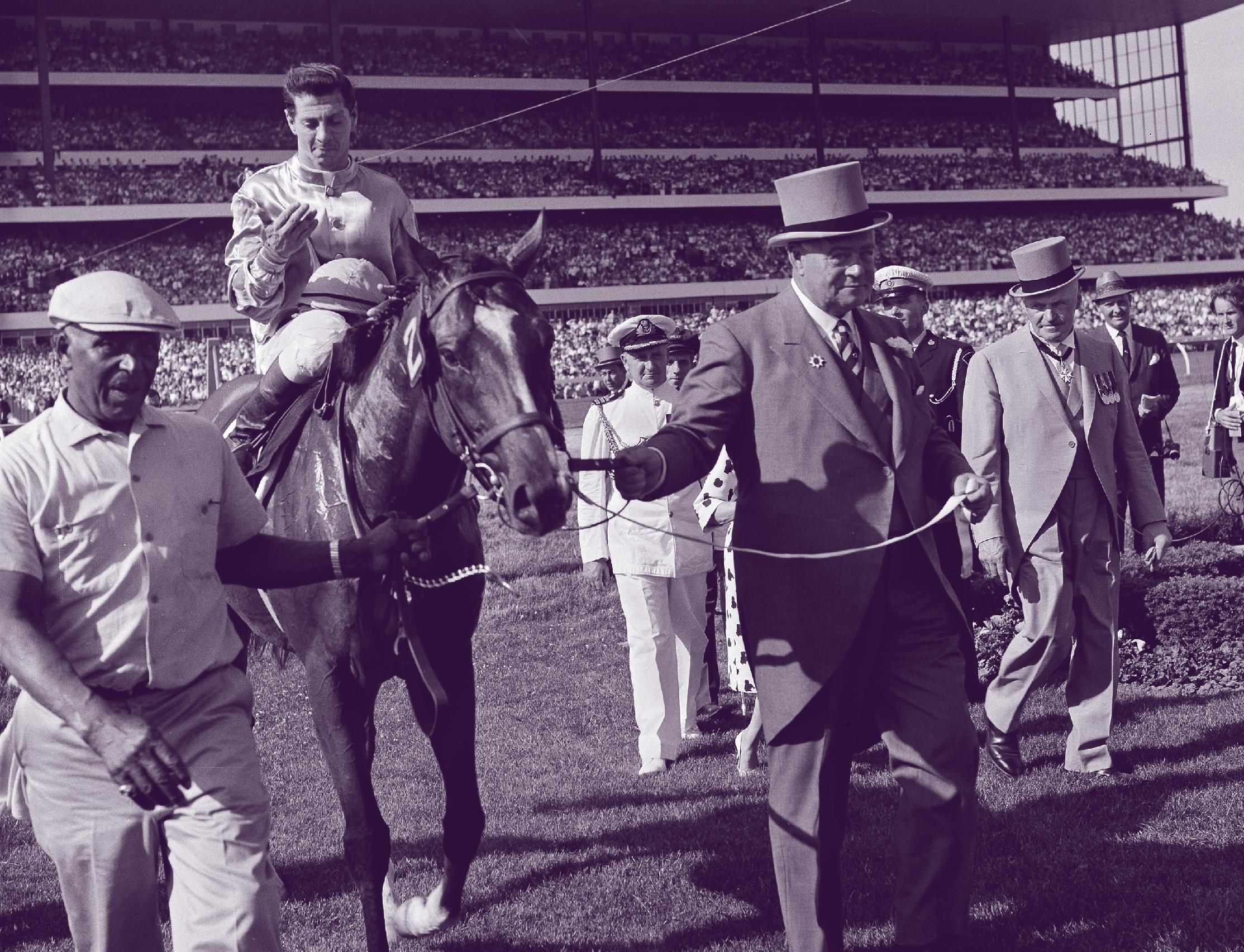
bloodstock for European racing. Typical of Northern Dancer’s sons, he went on to a very successful career at stud, producing sons and grandsons who themselves became prominent sires.
Other sons, such as Danzig, Lyphard, Nureyev, Storm Bird, Sadler’s Wells, and Vice Regent have themselves well-developed sire lines, perhaps no more so than Sadler’s Wells. He is deemed to be one of the most influential sires of all time, having held the record for most all-time stakes winners. The record was broken by Danehill, the son of Danzig who has shaped the breed in both the Northern and Southern Hemispheres, having shuttled between Ireland and Australia. Sadler’s Wells’ son, Galileo, among his many accomplishments at stud, has sired the record five winners of the Epsom Derby.
To look at the branches of the Northern Dancer sire line, is to be in awe. The classic and other stakes winning fillies and colts are too many to count. This space cannot contain the breadth and depth of achievement.
Two descendants of Northern Dancer, indomitable in their racing careers, are poised to make their significant mark on the breed. Frankel and Justify are descended from Northern Dancer through both their sire and dam.
Frankel has produced many Group 1 winners, including Cracksman – his first Group 1 winner, from his first crop in 2014. Now Cracksman has achieved significant breeding success as the sire of 2023 Prix de l’Arc de Triomphe winner and European Horse of the Year, Ace Impact.
Justify, from two crops to race, sired three two-year old champions of 2023 –City of Troy, Opera Singer, and Just F Y I.
Northern Dancer is a national treasure, exemplifying the best qualities of Canadians – determination, pluck, and excellence on the world stage.
OWNER
Richard Kennedy and Taylor Made Farm BREEDER
Richard R. Kennedy PEDIGREE
1984 ch. h.
Mr. Prospector – Polite Lady, by Venetian Jester
CAREER RECORD
Starts 1st 2nd 3rd Earnings 15 7 4 2 $995,235
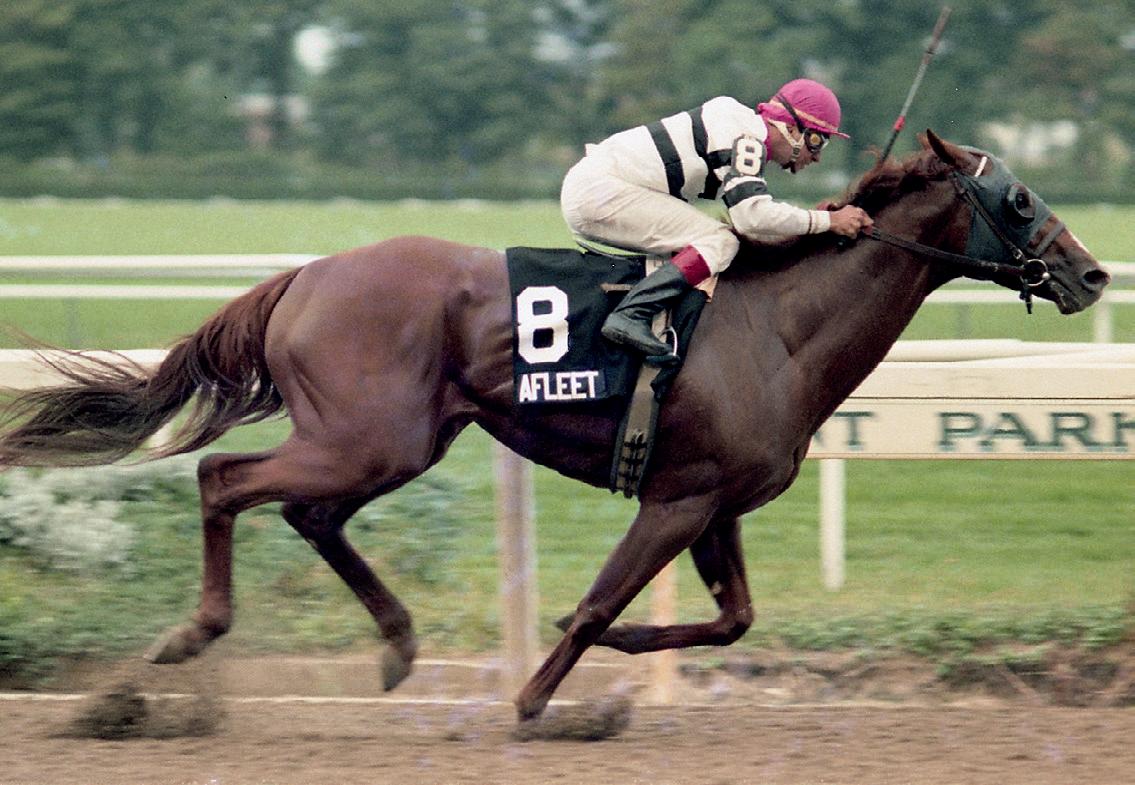
Jerome Handicap – Grade 1 | Pennsylvania Derby – Grade 2 | Toboggan Handicap – Grade 3 Friar Rock Stakes | Plate Trial Stakes | Queenston Stakes
BIOGRAPHY
Richard Kennedy’s homebred Afleet had it all: the flashy pedigree, looks, and talent. The handsome chestnut colt was a Grade 1 winner in New York and Canadian Horse of the Year and Champion Three-year Old Colt. In retirement, Afleet found success as a stallion in the United States and Japan.
A son of one of the world’s leading sires, Mr. Prospector, Afleet did not race as a juvenile. But Phil England, who trained Kennedy’s successful, boutique stable, galloped Afleet every day and knew what power he had under him.
When he was finally unveiled for his career debut in a maiden race at Woodbine in the spring of 1987, Afleet won by a stunning 10 lengths. He powered through consecutive stakes wins in the Friar Rock Stakes one week later and the Queenston Stakes two weeks after that before finishing fifth in the Marine Stakes in his first attempt at 1 1/16 miles. Afleet bounced back in a big way, winning the 1 1/8 mile Plate Trial Stakes by 2 1/2 lengths, stamping himself the heavy favourite for that year’s Queen’s Plate.
Held just two weeks after the Plate Trial, the 1 1/4 mile distance would prove too far for Afleet. The colt rolled to the lead turning for home, but was caught late by longshot Market Control.
Afleet’s career was managed by Reade Baker and he knew the colt could hold his own against American competition. After a short rest, Afleet returned in the prestigious Grade 1 Jerome Stakes at Belmont Park and flew to a 3 1/4 length win, racing the mile in 1:33 4/5, at that point the second fastest time in its history.
The Grade 2 Pennsylvania Derby at Philadelphia Park was next for Afleet. He hooked up with millionaire Lost Code early in the 1 1/8 mile race, and when his rival edged clear
into the stretch, it appeared that Afleet was beaten. That is, until the colt found another gear and rallied to beat Lost Code in a spectacular performance.
Afleet came within inches of winning the 1 1/4 mile Meadowlands Cup in October of 1987, but top older horse Creme Fraiche won the photo. Afleet tried the 10-furlong distance once more in his three-year old finale, finishing tenth behind Kentucky Derby winners Ferdinand and Alysheba in the Breeders’ Cup Classic at Hollywood Park.
His four-year old season began in March of 1988 with a win in the Grade 3 Toboggan Handicap at Aqueduct for his new ownership group of Kennedy and Taylor Made Farm of Kentucky. Taylor Made would stand the colt at stud upon his retirement.
Favoured for the Grade 1 Carter Stakes at Aqueduct, Afleet finished a close second behind the excellent Gulch. That same rival edged him again in the Grade 1 Metropolitan Handicap at Belmont Park in his next start. Following a thirdplace finish to Lost Code in the Grade 2 Massachusetts Handicap at Suffolk Downs, Afleet’s team pointed him to the Grade 1 Breeders’ Cup Sprint at Churchill Downs in November. They elected to bring him into the race fresh, having not raced since June, but he was slow from the gate. By the finish, Gulch was holding off another Canadian star in Play the King, and Afleet was roaring past everyone else, only to come up just short in third place.
His lucrative stallion career began at Taylor Made in 1989 before he was sold to Japan in 1990. Among his offspring were millionaire A Fleets Dancer, Grade 1 winner Flat Fleet Feet, and Japanese Group 1 winners Big Wolf and Sterling Rose. Afleet passed away at the age of 30 in Japan. He was inducted into the Canadian Horse Racing Hall of Fame in 1992.
OWNER
Kinghaven Farms
BREEDER
Anderson Farms
PEDIGREE
1989 dk. b./br. h.
Shadeed – Bialy, by Alydar
CAREER RECORD
Starts 1st 2nd 3rd Earnings 18 9 2 2 $930,689
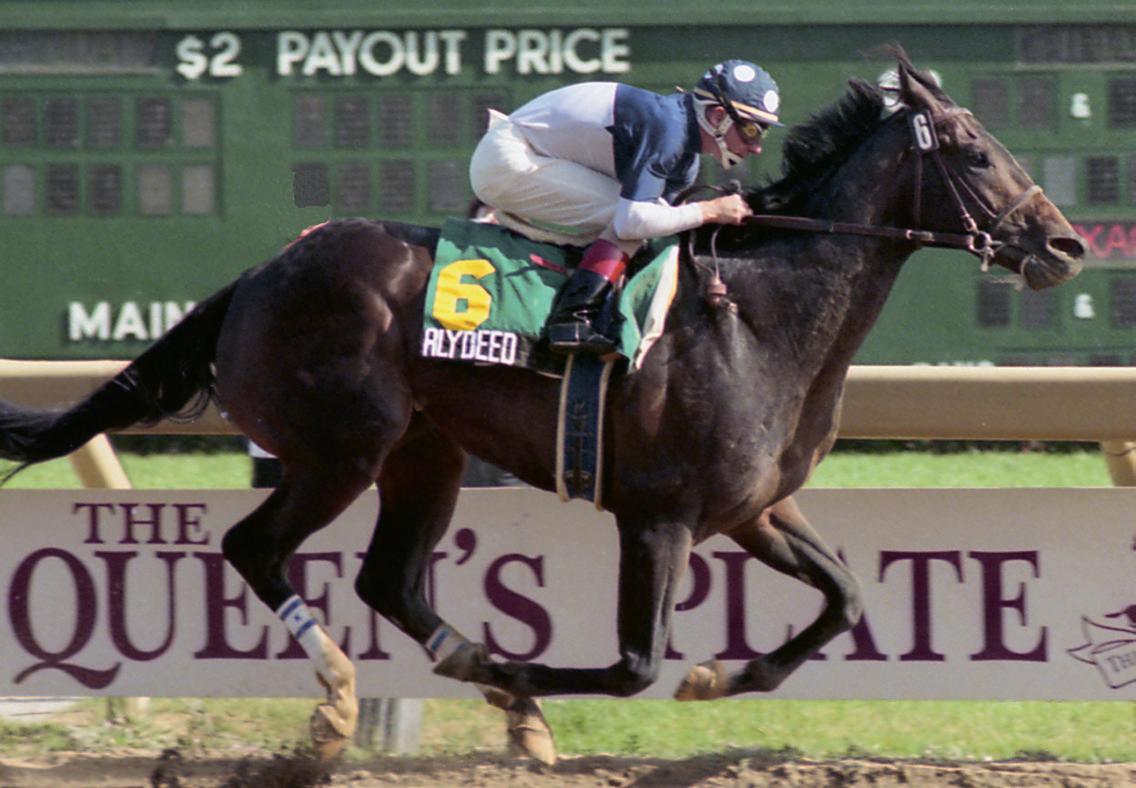
Carter Handicap – Grade 1 | Commonwealth Breeders’ Cup Stakes – Grade 3 | Derby Trial Stakes – Grade 3 Marine Stakes | Plate Trial Stakes | Queen’s Plate Stakes | Victoria Stakes
Eleven and a half lengths.
That was the spectacular winning margin by Alydeed in the 1992 Queen’s Plate. Positioned fourth during the early going, Alydeed ranged up on the outside around the final turn, guided expertly by jockey Craig Perret. Perret, with a snug hold on the reins, constantly scanned for competition over his shoulder, finding none in sight.
Bet down to 10 cents on the dollar, it was a classic romp. His opponents gasping for air, Alydeed opened up seven lengths at the top of the stretch. The rest simply a formality, Alydeed won as he pleased. The overwhelming support for Alydeed led to a minus show pool of nearly $34,000. Reflecting on the race, Perret remarked, “It just shows he’s going to be something regal. I don’t think we know how good he is. I just think he’s going to get a lot better.”
Alydeed’s dominance wasn’t limited to the Queen’s Plate; he had previously cruised to victory in the Plate Trial Stakes and the Marine Stakes. Additionally, his impressive performance in the Grade 1 Preakness Stakes, where he finished a game second, showcased his prowess on the international stage. Alydeed’s prep races also included the Grade 3 Derby Trial Stakes at Churchill Downs, which he took easily.
Following his Queen’s Plate romp, Alydeed would run second in the Prince of Wales Stakes on a muddy Fort Erie strip to longshot Benburb.
Trained by Roger Attfield and owned by Bud and David Willmot of Kinghaven Farms, Alydeed was a standout from the beginning. Purchased for $100,000 from Ontario breeder Bob Anderson at the 1990 Keeneland September Yearling Sale, Alydeed’s career debut in the 1991 Victoria Stakes at Woodbine was a testament to his potential, winning by more than three lengths.
After winning half of his 10 starts as a three-year old, Alydeed won three consecutive starts to begin his fouryear old season, including an allowance race in which he equaled Gulfstream Park’s track record. He then won the Grade 3 Commonwealth Breeders’ Cup Stakes by a head. He followed that up with one of his most impressive performances, capturing the Grade 1 Carter Handicap at Aqueduct after duelling throughout with Loach and winning by a scant nose.
Alydeed entered stud at Windfields Farm in 1994, siring 11 stakes winners and 221 winners overall. Among his stakes winners were 1997 Canadian Champion Two-year Old Filly Primaly and Grade 1 winner Hedonist. In 2001, he was Canada’s leading sire. As a broodmare sire, Alydeed was responsible for more than 20 stakes winners, including millionaires Bound for Nowhere and War Dancer.
In 2004, he was sold and stood at Jack and Linda Johnston’s Peaceful Valley Farm, in Didsbury, Alberta.
Alydeed was a quirky horse, especially as he aged. He loved bananas and got an apple every day and two peppermints at noon.
“As a two-year old he was quite easy to manage,” said Attfield. “As he got older, he got very aggressive in his training. He had all the ability in the world but his temperament would change in a second. He was like a Jekyll and Hyde! He would change from being a really nice horse to a really aggressive horse. I had to take him with the pony a lot and sometimes he would just freeze and you had to just work along with him."
Despite his quirks, Alydeed’s undeniable talent and legacy as a sire make him a great among Canadianbred racehorses.
OWNER
Kinghaven Farms BREEDER
Kinghaven Farms PEDIGREE
1991 b. m.
Alysheba – Triple Wow, by Coastal
CAREER RECORD
Starts 1st 2nd 3rd Earnings 19 7 6 3 $648,431

Nijana Stakes – Grade 3 | Canadian Breeders’ Cup Handicap | Canadian Maturity Stakes Lady Dean Stakes | Natalma Stakes
BIOGRAPHY
The decorated champion was, among many things, the very definition of “wow factor.”
Bred and owned by David S. Willmot’s Kinghaven Farms, Alywow, under the tutelage of dual Hall of Fame conditioner Roger Attfield, was destined for greatness.
When it came to breaking her maiden, the third time proved to be the charm for the bay filly. The milestone victory came at about seven furlongs in maiden special weight company over the Woodbine inner turf on August 13, 1993.
After a second straight score, Alywow faced stakes company for the first time in the Natalma Stakes and earned a hard-fought half-length triumph in the onemile turf event. In the final start of her rookie campaign, contested over a sloppy main strip in the Princess Elizabeth Stakes, she settled for runner-up honours in a race won by Canada’s 1993 Sovereign Award Champion Two-year Old, Term Limits.
The daughter of 1987 Kentucky Derby and Preakness Stakes winner Alysheba began her three-year old campaign with a victory at Pimlico in the Lady Dean Stakes. She managed two stakes placings in her next three starts before displaying her preference for the turf after a victorious turn in the Grade 3 Nijana Stakes at Saratoga.
Her next engagement was one for the history books, as she won the first race over Woodbine’s new E. P. Taylor Turf Course as the odds-on favourite in the Canadian Breeders’ Cup Handicap on September 10, 1994.
She then trekked to Belmont Park for the Grade 1 Flower Bowl Handicap and finished second before returning to Woodbine for the Grade 1 Rothmans Ltd. International Stakes. As the only filly in the race, Alywow came up with a spectacular performance, narrowly losing to 18-1 Raintrap (GB) who set a new track record in the 1 1/2 mile turf classic.
She concluded her three-year old season with a headscratching defeat in the Grade 1 Matriarch Stakes at Hollywood Park, which was believed to be rooted in a developing hairline fracture in her hind leg.
The result did nothing to tarnish the brilliant year Alywow constructed and, at the Sovereign Awards, she was a triple threat, delivering her connections with trophies for Canada’s Horse of the Year, Champion Grass Horse and Champion Three-year Old Filly.
After off-season surgery, she returned to the racetrack at age four, notching a pair of seconds and finishing out of the money in her penultimate start, the 1995 Rothmans Ltd. International Stakes.
In fitting fashion, she was at her best in her final start when she faced six rivals, including 1994 Queen’s Plate winner Basqueian, in the Canadian Maturity Stakes, at 1 1/4 miles over the Woodbine turf. With Dave Penna riding, Alywow got away third over the yielding course. The pair took over the proceedings ahead of the mile marker and were three lengths clear of their closest pursuer. That lead extended to eight lengths at the stretch call and 13 at the wire.
As a broodmare, Alywow produced Grade 2 winner Century City (IRE), a colt by Danzig who sold for $2.2 million as a yearling before winning multiple stakes and earning Grade 1 placings in Ireland and California, including a second-place finish in the Entenmanns Irish Two Thousand Guineas and a third-place finish in the 2003 NetJets Breeders Cup Mile. She also produced the stakes-winning filly Hidden Cat, by Storm Cat, and Suitably Discreet, by Mr. Prospector, herself the dam of Irish and North American stakes winner Speaking of Which, a successful sire in India.
Alywow was inducted into the Canadian Horse Racing Hall of Fame in 2009.
OWNER
Maktoum R A (Sheikh Mohammed)
BREEDER
E. P. Taylor
PEDIGREE
1979 b. m.
Snow Knight – Royal Statute, by Northern Dancer
CAREER RECORD
Starts 1st 2nd 3rd Earnings
14 4 0 1 $311,270

Gran Premio del Jockey Club – Grade 1 | Yorkshire Oaks – Grade 1
BIOGRAPHY
Awaasif, an Arabic term meaning ‘tempest,’ was certainly a name befitting a horse who ran like the wind throughout a decorated career, on and off the racetrack.
Fashioning a white star, Awaasif was bred at Windfields Farm in Ontario by E. P. Taylor. She was sired by 1974 Group 1 Epsom Derby winner, Snow Knight, who was the 1975 Eclipse Award Champion Grass Horse, and produced from the Northern Dancer mare, Royal Statute.
Royal Statute was a highly successful broodmare, producing several winners including Konafa. Konafa went on to produce Korveya, the dam of multiple Group 1 winners in Bosra Sham, Hector Protector, and Shanghai, while another of Royal Statute’s daughters, Victoress, was the granddam of 2011 Group 1 Epsom Derby winner, Pour Moi.
As a yearling, Awaasif was purchased for $325,000 (U. S.) by representatives of Sheikh Mohammed at the 1980 Fasig-Tipton Kentucky Selected Summer Yearling Sale. Sheik Mohammed would spend $2.4 million at that sale, but none of his eight yearlings would come close to what Awaasif achieved for him on the racetrack – she was his first Group 1 winner – and in retirement.
She was sent to race in Europe under the tutelage of trainer John Dunlop at Arundel in West Sussex where, after winning once in two starts as a two-year old in 1981, she established herself as an upper level middle-distance runner the following campaign and was the top-ranked filly on the English Free Handicap for three-year olds. Following a facile victory to start her 1982 season, she finished fourth in the Oaks Stakes at Epsom. After recovering from mastitis, she was best of all in the Group 1 Yorkshire Oaks, the first Group 1 win for Sheikh Mohammed, and was then sent to France to prepare for the Group 1 Prix de l’Arc de Triomphe. A disappointing seventh in her prep race, the Prix Vermeille,
led to her dismissal at 90-1 odds in the French fixture. A prolonged, courageous run would see her cross the wire a close third, just a head and a half-length back of Akiyda and Ardross. Her final start of the year was an unplaced effort in the Grade 1 Washington, D.C. International at Laurel Park. She would finish fourth in her first two starts at four and well behind All Along in her second try at the Prix de l’Arc de Triomphe that year. Returning to the races just two weeks following her Arc run, she would record an impressive win in the Group 1 Gran Premio del Jockey Club in Milan for which Timeform described her form as “majestic.” Although successful in Italy, she again finished unplaced after traveling to the U. S., ending her season and her career in the Grade 1 Oak Tree Invitational at Santa Anita.
As a broodmare, Awaasif produced several winners, most notably Group 1 winner Snow Bride, who won the Group 1 Epsom Oaks. A daughter of Blushing Groom, she was Awaasif’s second foal. She finished second in the Oaks but was elevated to first after the disqualification of firstplace finisher Aliysa. Snow Bride, who also won a pair of Group 3 events, is best known for producing Lammtarra.
A son of Nijinsky II, Lammtarra won Europe’s three greatest prizes: the Group 1 Epsom Derby, Group 1 King George VI and Queen Elizabeth Diamond Stakes, and Group 1 Prix de l’Arc de Triomphe. He was named the 1995 Cartier Champion Three-year Old Colt. Bred by Sheikh Maktoum’s Gainsborough Farm, Lammtarra raced for Sheikh Maktoum’s son, Saeed Maktoum. Lammtarra, who went undefeated in four lifetime starts, was sold for stallion duty to Japanese breeders for $30 million.
Other group stakes winners produced by Awaasif included Jarraar (by Mr. Prospector) and Ibn Al Haitham (by Zafonic). Awaasif died in May 2004 at the age of 25.
OWNER
Stronach Stables BREEDER
Frank Stronach PEDIGREE
1994 b. h. Deputy Minister – Primal Force, by Blushing Groom (FR) CAREER RECORD
Starts 1st 2nd 3rd Earnings 12 9 0 2 $4,374,590
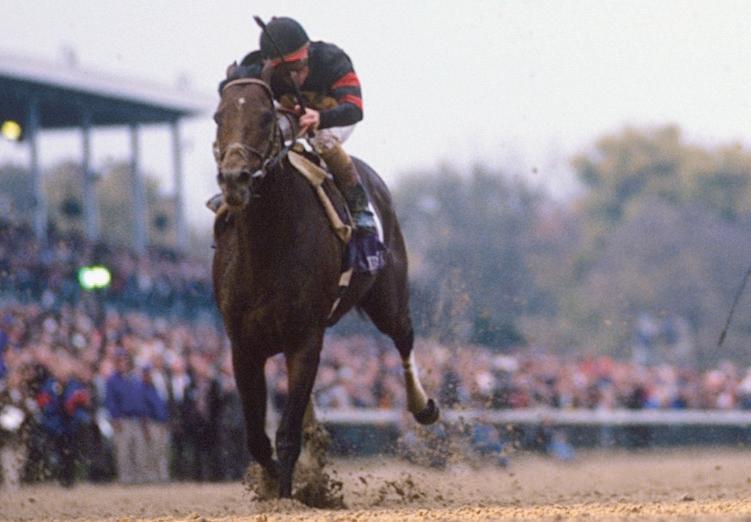
Breeders’ Cup Classic – Grade 1 | Whitney Handicap – Grade 1 | Jim Dandy Stakes – Grade 2 Saratoga Breeders’ Cup Handicap – Grade 2 | Stephen Foster Handicap – Grade 2
Hawthorne Gold Cup Handicap – Grade 3 | Queen’s Plate Stakes
The 1998 Grade 1 Breeders’ Cup Classic has been called one of the greatest fields ever assembled in the history of the 40-year-old World Championship series. Among the starters at famed Churchill Downs that day were champions on three continents and winners of each leg of the American Triple Crown; but, it was Canadian-bred Awesome Again who burst between millionaires such as Silver Charm, Swain, Skip Away, and Touch Gold to win the $5 million Classic, completing a spectacular, undefeated four-year old campaign for his owner and breeder, multiple Sovereign Award winner Frank Stronach, master of Adena Springs.
Awesome Again, an elegant and muscular bay son of Canadian Horse of the Year Deputy Minister, was produced from the Blushing Groom (FR) mare Primal Force who was purchased by Andy Stronach for her brilliant speed.
The Stronachs would need to employ a lot of patience, however, as Awesome Again, sent to California trainer David Hofmans, would not make his racing debut until late May of his three-year old campaign. He finished third but came back just 11 days later and broke his maiden by six lengths. The Stronachs had a good idea that their colt was a special one, so they sent Awesome Again back to Ontario where he would join a couple of stablemates in the field for the Queen’s Plate, attended in 1997 by Her Majesty the Queen. Despite gawking at the big crowd, Awesome Again, under jockey Mike Smith, won the 1 1/4 mile Canadian classic by more than three lengths.
Then it was off to the U. S. once again for Awesome Again, who got his first taste of top American colts in the Grade 2 Jim Dandy Stakes at the prestigious Saratoga meeting. Despite catching a deep and sloppy surface, Awesome
Again powered to a three-length win, which made him favourite for the Grade 1 Travers Stakes. The colt would finish a good third and was given a well-earned rest for the remainder of the season.
Awesome Again joined the stable of trainer Patrick Byrne in 1998. In only his second outing of the season, the Grade 2 Stephen Foster Handicap at Churchill Downs, the colt and his new rider Pat Day upset the previous year’s Kentucky Derby champion, Silver Charm. Stronach’s colt marched through three more graded stakes wins, including the Grade 1 Whitney Stakes, before his brilliant Classic victory, which pushed his career earnings to $4,374,590, making him the richest Canadian-bred in history. He was inducted into the Canadian Horse Racing Hall of Fame in 2001.
In the breeding shed, Awesome Again began a stallion dynasty for Stronach’s Adena Springs. He became the first Breeders’ Cup Classic winner to sire a Classic winner, with Ghostzapper (now one of the world’s leading sires) taking the 2004 edition. He sired three more Breeders’ Cup winners – Ginger Punch, Round Pond, and Wilko – plus $6 million earner and champion Game On Dude, and some 70 more black-type winners. Awesome Again’s daughters have had their own share of success, producing more than 80 stakes winners including 2018 Breeders’ Cup Classic winner, Accelerate.
The Stronach family retired Awesome Again from stud duty in 2019 and donated him to Old Friends Thoroughbred Retirement in Georgetown, Kentucky in October 2020. He passed away just a couple of months later but his influence on racing and breeding in Canada and the world lives on.
OWNER
Kinghaven Farms BREEDER
Kinghaven Farms, Limited PEDIGREE
1983 ch. m.
Great Nephew (GB) – Carrot Top II, by High Hat (GB)
Starts 1st 2nd 3rd Earnings
41 12 8 5 $1,287,232
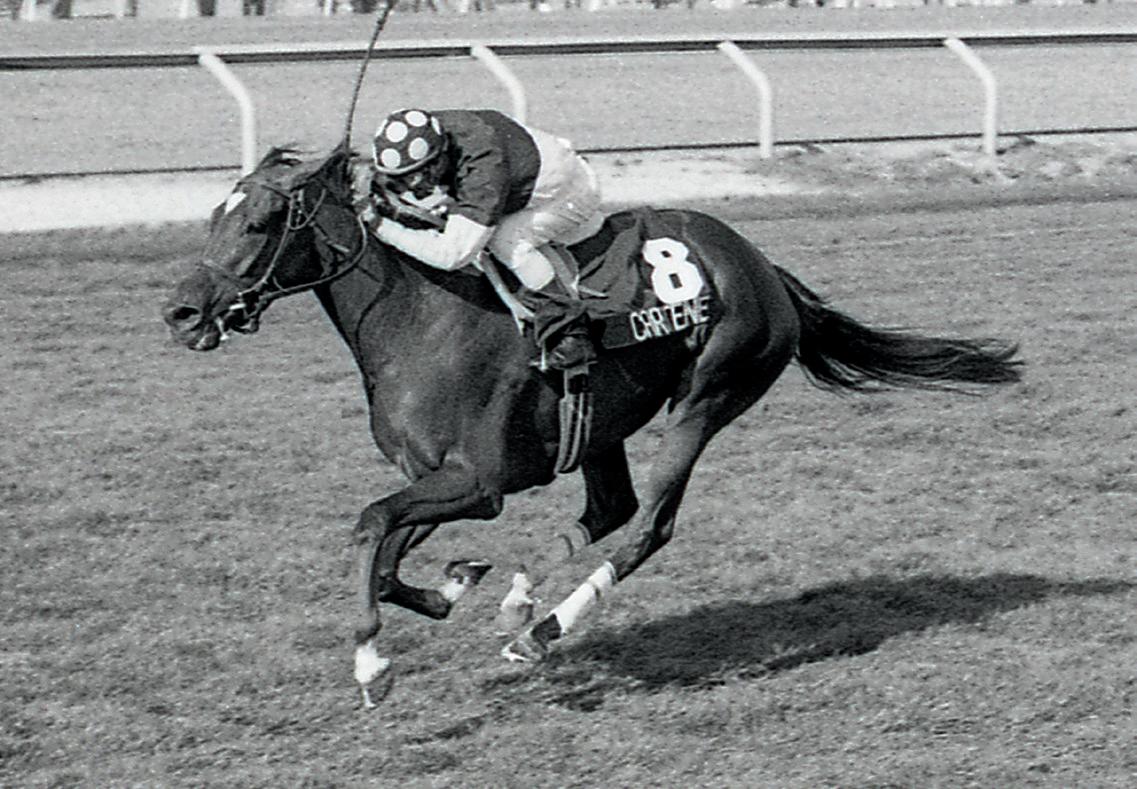
Pan American Handicap – Grade 1 | Yellow Ribbon Invitation Stakes – Grade 1 Matchmaker Stakes – Grade 2 | New Hampshire Sweepstakes Handicap – Grade 3 | Breeders’ Stakes Nassau Stakes | Toronto Cup Handicap | Wonder Where Stakes
With six Sovereign Awards to her credit, stretch running sensation Carotene stands alone. No filly or mare has won more of the national awards in the history of Canadian racing.
After winning her only start as a two-year old, Carotene won six of her 12 starts in 1986 to win the Champion Three-year Old Filly title. In 1987, she was named Champion Older Mare after winning four races. And then, in 1988, she repeated as Champion Older Mare despite winning just one of her 14 starts.
Bred and owned by Kinghaven Farms and trained by eighttime Sovereign Award winner Roger Attfield, Carotene was also feted with Champion Grass Horse honours in 1986, 1987, and 1988.
Highly regarded right from her birth, Carotene’s three-year old season was sensational. Skipping The Queen’s Plate, the first leg of the Canadian Triple Crown, Carotene was second in the second leg, the Prince of Wales Stakes, and then won the third and final leg of the Triple Crown, the mile and a half Breeders’ Stakes. She also won the Toronto Cup and the Wonder Where Stakes before ending her season with a second in the Grade 2 E. P. Taylor Stakes and a solid third-place finish in the Grade 1 Yellow Ribbon Invitational Stakes at Santa Anita, finishing less than a length behind the winner, Bonne Ile.
At four, in 1987, she was arguably even better as she won the Yellow Ribbon despite being last with half a mile to run while boxed in with nowhere to go. Kinghaven’s owners Bud and David Willmot picked up $240,000 for the victory.
In addition to the Yellow Ribbon, Carotene’s 1987 victories included the Nassau Stakes at Woodbine, the Grade 2 Matchmaker Stakes at Atlantic City and the Grade 3 New Hampshire Sweepstakes Handicap at Rockingham – the latter in record time against the boys. Carotene was also second in the King Edward Gold Cup and the Niagara – a pair of Grade 3 handicaps at home on the Woodbine turf.
Carotene’s lone victory in 1988, her final season of racing, was a huge one – she captured the Grade 1 Pan American Handicap at Gulfstream Park. Racing against males, Carotene came within a fifth of a second of the course record while going off at odds of 27-1. The victory made her a millionaire.
In addition to winning the Pan American, Carotene finished second in the Grade 1 Santa Barbara Handicap at Santa Anita, and had thirds in both the Grade 1 Sword Dancer Handicap at Belmont and the Grade 1 San Juan Capistrano Handicap at Santa Anita before retiring at the end of that year.
Carotene was the daughter of British stallion Great Nephew, sire of Epsom Derby winners Grundy and Shergar, and the British dam Carrot Top II, bought in foal by Kinghaven. As a broodmare, Carotene produced the first of her foals in 1990. While none of them lived up to their dam’s prowess on the racetrack, her daughter Bloemfountain produced Irish Group 2 winners Belle de Crecy and The Miniver Rose as well as Japanese stakes winner Whispering Hope.
In 2003, Carotene was inducted into the Canadian Horse Racing Hall of Fame.
OWNER
Joey Gee Thoroughbreds; Wachtel Stable, Gary Barber, R. A. Hill Stable and Reeves Thoroughbred Racing
BREEDER
Tall Oaks Farm
PEDIGREE
2014 ch. g.
English Channel – In Return, by Horse Chestnut (SAF)
CAREER RECORD
Starts 1st 2nd 3rd Earnings
56 10 6 5 $3,915,983

Joe Hirsch Turf Classic Stakes – Grade 1 (twice) | Man o’ War Stakes – Grade 1 Sword Dancer Stakes – Grade 1 | Bowling Green Stakes – Grade 2 (twice) | Elkhorn Stakes – Grade 2 Breeders’ Stakes | Grand Couturier Stakes | Vandal Stakes
BIOGRAPHY
Through eight seasons of racing, Ontario-bred Channel Maker epitomized class and longevity.
The popular gelding raced and won at the graded stakes level right up until his retirement at the age of nine in 2023. The tall, liver chestnut gelding holds the record for the most appearances at the Breeders’ Cup World Championships with six, and retired as the third richest Canadian-bred racehorse in history.
Channel Maker was bred by Ivan Dalos’ Tall Oaks Farm and foaled in February 2014. A son of American turf champion English Channel, the gelding did not reach his reserve at the 2015 Keeneland September yearling sale and was bought back by Dalos for $57,000. He was later purchased privately by relative newcomer Joe Guerrieri of Joey Gee Thoroughbreds and sent to two-time Sovereign Awardwinning trainer Dan Vella.
Channel Maker was precocious, flashing talent in workouts in May of his two-year old season, and breaking his maiden second time out in the Vandal Stakes on yielding grass at Woodbine. Following a troubled, third-place finish in the important Grade 2 Summer Stakes, Channel Maker drew the interest of American owners Gary Barber and Wachtel Stable. They each purchased a share in the gelding from Guerrieri and would later transfer the gelding to trainer Bill Mott. He then embarked on a series of races in the United States, including a start in the 2016 Grade 1 Breeders’ Cup Juvenile Turf.
Returning to his homeland in the summer of his three-year old season, Channel Maker managed to finish fourth in the Queen’s Plate behind Holy Helena. It was on the grass
that Channel Maker preferred to be, and he promptly came back and won the 1 1/2 mile Breeders’ Stakes, the third jewel of Canada’s Triple Crown, by a hard-fought nose. Later in 2017, Channel Maker was a close second in the Grade 1 Hollywood Derby at Del Mar and was voted Canada’s Champion Three-year Old Male at the Sovereign Awards. Guerrieri would sell his share in Channel Maker the following year and Reeves Racing and R. A. Hill Stable would join the partnership.
Easy to spot in his races as he had an unusually high head carriage, Channel Maker relished racing near the early lead. He used that style to win his first Grade 1, leading from start to finish to take the Joe Hirsch Turf Classic Stakes at Belmont Park late in his four-year old campaign. He added Grade 1s in 2019 and 2020, and finished his 2020 season with a close third in the Grade 1 Breeders’ Cup Turf. He earned the Eclipse Award for Champion Turf Male in 2020.
One of Channel Maker’s most impressive runs came just a few months later when he was second in the 2021 running of the $1 million Neom Turf Cup at Riyadh in Saudi Arabia.
Two years later, at the ripe old age of nine, Channel Maker earned his tenth victory, taking the Grade 2 Bowling Green Stakes at Belmont Park for the second time. A pair of unplaced runs followed and Channel Maker was retired. He was donated to Old Friends, a retirement farm in Georgetown, Kentucky, where he greets racing fans and horse lovers from around the world.
Channel Maker will be inducted into the Canadian Horse Racing Hall of Fame in 2024.
OWNER
Sam-Son Farm
BREEDER
Richard D. Maynard PEDIGREE
1993 ch. h.
Chief’s Crown – Amelia Bearhart, by Bold Hour
CAREER RECORD
Starts 1st 2nd 3rd Earnings
26 12 5 3
$3,381,557

Breeders’ Cup Turf – Grade 1 | Canadian International Stakes – Grade 1 | Manhattan Handicap – Grade 1 Elkhorn Stakes – Grade 3 | King Edward Breeders’ Cup Handicap – Grade 3 | Breeders’ Stakes
Niagara Breeders’ Cup Handicap | Sky Classic Handicap (twice)
He was known simply as “The Chief,” and for two years in the late 1990s, Sam-Son Farm’s rangy chestnut colt Chief Bearhart ruled the North American turf. The son of Chief’s Crown had an international following, as fans loved his exciting come-from-behind running style and breathtaking turn of foot.
Chief Bearhart was bred by Richard D. Maynard and purchased privately by Ernie Samuel’s Sam-Son Farm, which was being operated at the time by Samuel’s daughter, Tammy Balaz. Trainer Mark Frostad knew early that Chief Bearhart was going to excel in long grass races and after just a single start as a two-year old, waited until the following spring to race him again. The colt won two turf races with ease, finished fourth in the Queen’s Plate on dirt, and then won the 1 1/2 mile Breeders’ Stakes back on grass. His first Grade 1 attempt came in that year’s Canadian International and he was an impressive second to top English older horse Singspiel. The Grade 1 Breeders’ Cup Turf was being held at Woodbine for the first time that fall, and Chief Bearhart was given a chance against the world’s best. He wasn’t quite ready for that tough field, but still collected his first of six Sovereign Awards as the year’s Canadian Champion Turf Horse.
Frostad mapped out a concise 1997 campaign for Chief Bearhart that was to culminate with another attempt at the Breeders’ Cup Turf. The colt was paired with top American rider Jose Santos, and they began their year just missing in the Grade 3 Maker’s Mark Mile at Keeneland. That effort would set Chief Bearhart up perfectly for a win in the Grade 3 Elkhorn Stakes at his favourite distance of 1 1/2 miles just two weeks later, and then an easy win back on home turf in the Grade 3 King Edward Breeders’ Cup Handicap. The Chief saved his most impressive runs for his final outings of the year following an unlucky loss by just a head
in the Grade 3 Stars and Stripes Breeders’ Cup Handicap at Arlington Park in July. He won the Sky Classic Handicap by an easy six lengths before taking the Grade 1 Canadian International and earning another trip to the Breeders’ Cup.
Well-known for his high energy pre-race, the colt’s antics occasionally became concerning. That was the case at Hollywood Park when Chief Bearhart was getting tough to handle in the crowded paddock before the Turf. Fortunately, Frostad and his team were able to get Santos up on the colt and despite some nail-biting traffic trouble partway through the race, the pair came rumbling down the turf course to win the $2 million race in near-record time. He was named Eclipse Award 1997 Champion Grass Horse, and Canada’s Horse of the Year, Champion Grass Horse, and Champion Older Horse.
In 1998, Chief Bearhart had a slightly tougher schedule but captured the Grade 1 Manhattan Stakes at Belmont, the Niagara Breeders’ Cup Handicap and Sky Classic Handicap at Woodbine, before finishing a closing second in the Grade 1 Canadian International. In that year’s Grade 1 Breeders’ Cup Turf, held at Churchill Downs, he closed too late behind tough American turf star Buck’s Boy, finishing fourth. He was then invited to Japan to participate in the Grade 1 Japan Cup and once again closed ground to finish fourth before being named Canada’s Horse of the Year and Champion Grass Horse for the second consecutive year.
The Japanese had shown great interest in Chief Bearhart, and, the following year, Sam-Son sold their star to Shizunai Stallion Station where he stood his first year at stud in 1999. Chief Bearhart, who also briefly shuttled to New Zealand, sired some 400 winners and more than a dozen stakes winners before he died of heart failure in Japan in 2012. The Chief was inducted into the Canadian Horse Racing Hall of Fame in 2002.
OWNER
Sam-Son Farm
BREEDER
Sam-Son Farm
PEDIGREE
1981 b. m. Smarten – No Class, by Nodouble
CAREER RECORD
Starts 1st 2nd 3rd Earnings 9 5 3 0 $303,222
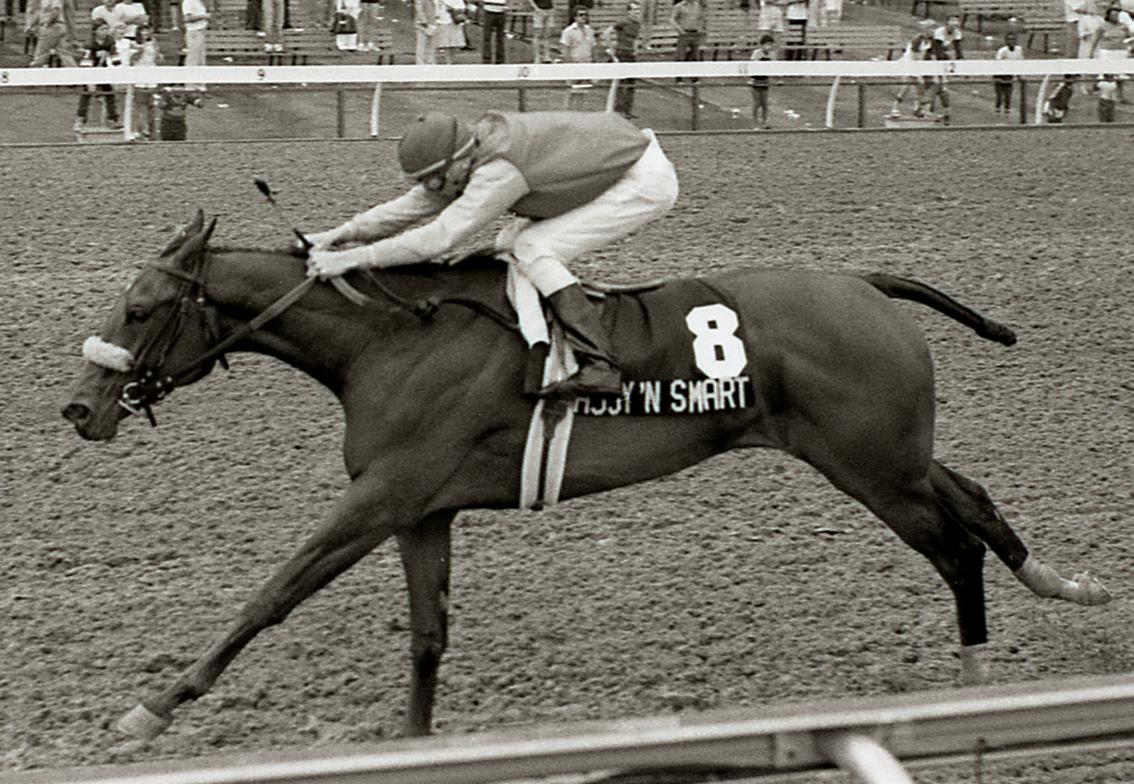
Canadian Oaks | Bison City Stakes | Fury Stakes
BIOGRAPHY
Extraordinary does not even begin to describe the contributions Classy ‘n Smart has made to thoroughbred racing in Canada.
Bred and owned by Sam-Son Farm, the daughter of Smarten and Canadian Horse Racing Hall of Fame inductee No Class didn’t start her racing career until the age of three. But it would be worth the wait for her high-profile connections, including trainer Jim Day.
After a winning debut in a maiden special weight engagement on May 20, 1984, Classy ‘n Smart climbed the ladder to the stakes ranks next time out. She handled the step up in class and took all the spoils in the Fury Stakes. After a second in the Selene Stakes, the bay mare was at the top of her game in the Canadian Oaks, winning the country’s pre-eminent race for Canadian-foaled three-year old fillies.
She was a formidable foe throughout that 1984 season, one in which she displayed her impressive versatility. Classy ‘n Smart won at various distances and over different surfaces, stamping herself as a gifted and adaptable competitor while adding the Bison City Stakes and Ontario Colleen Handicap to her list of victories.
The final race of her single-season career was a fifth in the Grade 1 Spinster Stakes at Keeneland, on October 27 of that year.
Sovereign Awards voters took notice of her accomplishments and abilities by crowning her as Canada’s Champion Three-year Old Filly in 1984.
As difficult as it may be to fathom, her body of work as a broodmare is even more impressive than her racing feats.
She is the dam of the incomparable Dance Smartly, inducted into both the Canadian Horse Racing Hall of Fame and the National Museum of Racing and Hall of Fame in Saratoga, New York. Dance Smartly also holds status as both an Eclipse Award and Sovereign Award winner. She was Canada’s Horse of the Year in 1991, capturing the Canadian Triple Crown and the Breeders’ Cup Distaff, becoming the first Canadian-bred horse to win a Breeders’ Cup race. Classy ‘n Smart was also feted at the 1991 Sovereign Awards ceremony, being named that year’s Outstanding Broodmare.
Additionally, Classy ‘n Smart is the dam of Grade 1 stakes winners Smart Strike and Full of Wonder and Grade 2 stakes winner Strike Smartly. Smart Strike is the sire of numerous Grade 1 winners and champions. Amongst them are the $10 million earner, Curlin, the $5 million earner, English Channel and two-time champion, Lookin At Lucky. All three have followed up their on-track success with impressive careers at stud. Amongst his other notable offspring are Sovereign Award champions Added Edge, Eye of the Sphynx, Gold Strike, Portcullis, and Soaring Free.
Classy ‘n Smart, the grand-dam of Queen’s Plate winners Dancethruthedawn and Scatter the Gold and 1999 Sovereign Award Champion Two-year Old Filly Hello Seattle, was designated a Reine-deCourse broodmare by pedigree analyst Ellen Parker.
In 2004, Classy ‘n Smart, who had passed away five years earlier, was inducted into the Canadian Horse Racing Hall of Fame, a fitting home for one of Canada’s all-time greats.
OWNER
Sam-Son Farm
BREEDER
Sam-Son Farm
PEDIGREE
1988 dk. b./br. m. Danzig – Classy ‘n Smart, by Smarten
CAREER RECORD
Starts 1st 2nd 3rd Earnings
17 12 2 3 $3,263,835

Breeders’ Cup Distaff – Grade 1 | Molson Export Million Stakes – Grade 2 | Breeders’ Stakes Canadian Maturity Stakes | Canadian Oaks | Natalma Stakes | Queen’s Plate Stakes Prince of Wales Stakes | Selene Stakes | Star Shoot Stakes
Dance Smartly had the look of a future great before she even set foot on the racetrack.
The star-shaped marking on her forehead was a sign of things to come for the regally bred daughter of Danzig, a son of Northern Dancer most accomplished as a sire of sires, and Classy ‘n Smart.
By the time her racing career would come to a close, Dance Smartly had left an indelible impression on the sport; she was a brilliant performer, world-class in every sense of the term.
Dance Smartly served notice of her talents in her two-year old season, a campaign that produced three wins in five appearances, including a victory in the Natalma Stakes, a second in the Ontario Debutante Stakes and a third in the Breeders’ Cup Juvenile Fillies at Belmont Park.
But that was only a small sample of what was to come for the bay.
In 1991, Dance Smartly recorded victories in the Star Shoot Stakes and Selene Stakes, before an easy score in the Canadian Oaks, the country’s premier race for Canadianfoaled three-year old filles.
She then went hoof-to-hoof with the boys in the Queen’s Plate, where she dominated her foes to take all the spoils in the oldest continually run stakes race in North America, and the first jewel in the Canadian Triple Crown. After another impressive win in the Prince of Wales at Fort Erie, Dance Smartly took to the grass in the 1 1/2 mile Breeders’ Stakes at Woodbine and proceeded to turf her rivals en route to Triple Crown glory, along with a one-million dollar bonus for her connections.
Dance Smartly, however, was only getting warmed up. After humbling the competition in her Triple Crown coronation, she met up with some of the top colts and geldings in North America in the Molson Export Million. Once again, she was much the best, defeating a field that included Fly So Free, the 1990 Champion Two-year Old Colt in North America.
She put a bow on her unbeaten year at Churchill Downs in the Breeders’ Cup Distaff, winning as the odds-on choice. The eight-for-eight campaign garnered Dance Smartly, trained by Canadian Horse Racing Hall of Fame trainer Jim Day, an Eclipse Award as North America’s Champion Three-year Old Filly, and a Sovereign Award as Canada’s Horse of the Year. Her purse earnings for 1991 totaled a head-turning $2,876,821.
After four races in her four-year old year, she was retired as the leading money-winning ($3.2 million) filly or mare in the world. She also held status as the first filly to win Canada’s Triple Crown and first Canadian-bred to win a Breeders’ Cup race.
As a broodmare, she produced Queen’s Plate winners Scatter the Gold (2000) and Dancethruthedawn (2001). She received the Sovereign Award for Outstanding Broodmare in 2001, adding to the three Sovereign Awards she had received during her racing career as Champion Two-year Old Filly, Champion Three-year Old Filly, and 1991 Horse of the Year.
In 2003, Dance Smartly was inducted into the National Museum of Racing and Hall of Fame at Saratoga, N.Y., eight years after she took her rightful place in the Canadian Horse Racing Hall of Fame.
OWNER
Sam-Son Farm
BREEDER
Sam-Son Farm
PEDIGREE
1998 dk. b./br. m.
Mr. Prospector – Dance Smartly, by Danzig
CAREER RECORD
Starts 1st 2nd 3rd Earnings 16 7 2 3 $1,609,643

Go for Wand Handicap – Grade 1 | Doubledogdare Stakes | Labatt Woodbine Oaks
Princess Elizabeth Stakes | Queen’s Plate Stakes BIOGRAPHY
High expectations. High results.
Dancethruthedawn, bred in the purple, was sired by Mr. Prospector, the leading North American sire in both 1978 and 1979. Then there was Dancethruthedawn’s dam, the Eclipse Award-winning Dance Smartly, who won the 1991 Canadian Triple Crown for Ernie Samuel’s Sam-Son Farm and became the first Canadian-bred to win the Breeders’ Cup Distaff.
Winning the Queen’s Plate 10 years after Dance Smartly, Dancethruthedawn also emulated her mother by winning the Labatt Woodbine Oaks in 2001.
In the Oaks, Dancethruthedawn broke a step slow; but, under a patient ride by Gary Boulanger, the Mark Frostad trainee edged off the rail with four furlongs to go. Swinging wide, she took command in the final sixteenth of a mile and won by a length and a quarter.
Contesting the Queen’s Plate three weeks later, Dancethruthedawn stalked the pace three wide before taking over with a quarter of a mile to run and then held Win City safe by half a length. It was only the fourth time in history that a filly secured the Oaks-Plate double.
“She got away a lot better today than she did in the Oaks,” said Boulanger. “It was just a matter of when I pushed the buttons. She may have gotten a little tired the last 30-40 yards but I don’t think she was going to let anybody go by. She showed today she’s the real package. I was yelling and crying, all at the same time after the wire. I don’t think it’s completely sunken in yet. It’s a great feeling, just unbelievable.”
“(Dancethruthedawn) really does look like Dance Smartly; she cocks her head the same way coming down the stretch and has a lot of those similar things,” owner Tammy SamuelBalaz told BloodHorse magazine. “To win the Queen’s Plate with Dance Smartly and to have her daughter win it, there
is nothing, nothing like it. It’s just unbelievable to have that kind of bloodline that continues on like that.”
That wasn’t all. One year earlier, Dancethruthedawn’s brother, Scatter the Gold, also won The Plate. Not surprisingly, it was the first and only time that full siblings won The Plate in back-to-back years.
After her Queen’s Plate score, Dancethruthedawn ran second in the Prince of Wales before shipping south to test American company in the Grade 1 Alabama Stakes at Saratoga, where she was fourth. Given the rest of the season off, she was later named Canada’s Champion Three-year Old Filly.
Dancethruthedawn ended up winning seven of her 16 races for earnings of $1,609,634.
In 2002, her final year of racing, Dancethruthedawn began her campaign by winning the listed Doubledogdare Stakes at Keeneland. More importantly, and impressively, Dancethruthedawn won the Grade 1 Go for Wand Handicap at Saratoga by a most convincing three and three-quarter lengths with Jerry Bailey along for the ride. She also placed in the Grade 3 Pimlico Breeders’ Cup Distaff Handicap, Grade 2 Fleur de Lis Handicap, and Grade 1 Personal Ensign Handicap.
Also the winner of Woodbine’s Princess Elizabeth Stakes as a two-year old, Dancethruthedawn was retired to the breeding shed in late 2002 after suffering an injury in the Grade 1 Overbrook Spinster Stakes at Keeneland. Despite an unlucky career as a broodmare, she produced three winners including Dance With Doves, the dam of Grade 2 placed stakes winner Dance Again, and Danceinthesunlight, the dam of 2014 Grade 1 Whitney Stakes winner Moreno.
Dancethruthedawn was inducted into the Canadian Horse Racing Hall of Fame in 2011.
OWNER
Centurion Farm; Kinghaven Farm; Due Process Stable
BREEDER
Centurion Farms
PEDIGREE
1979 dk. b./br. h.
Vice Regent – Mint Copy, by Bunty’s Flight
CAREER RECORD
Starts 1st 2nd 3rd Earnings
22 12 2 2 $696,964
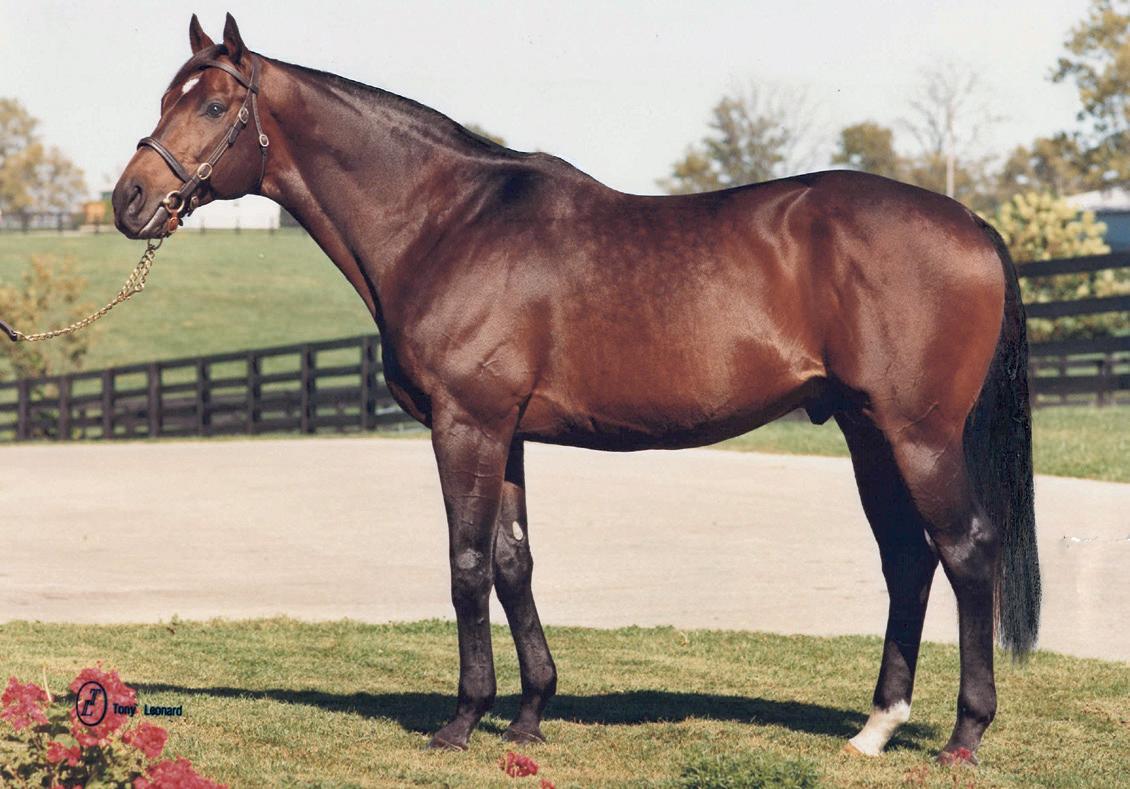
Laurel Futurity – Grade 1 | Young America Stakes – Grade 1 | Donn Handicap – Grade 2 Tom Fool Stakes – Grade 2 | Bull Page Stakes | Clarendon Stakes | Colin Stakes
Gulfstream Sprint Championship Handicap | Victoria Stakes | Youthful Stakes
Exceptional does not even come close to describing the prolific career of one of Canada’s all-time thoroughbred greats.
Deputy Minister, bred by Centurion Farms, nom du course of Ontario’s Mort and Marjoh Levy, was out of the mare Mint Copy, a horse her owners had claimed for the paltry sum of $6,250. The striking son of Vice Regent would be money-in-the-bank for his connections, both on the racetrack and in the breeding shed.
Deputy Minister orchestrated one of the most impressive two-year old campaigns on record. He burst onto the racing scene in 1981 and proceeded to stamp himself as a bona fide rookie sensation. His accomplishments included an Eclipse Award as North America’s champion juvenile, Canada’s Horse of the Year honours, and standing as the first Canadian-bred to top the U. S. Experimental Handicap.
That two-year old season yielded victories in the Bull Page, Clarendon, Victoria, and Colin Stakes at Woodbine, where he set a five-furlong track record. In the midst of those races, he trekked to the United States, capturing the Youthful Stakes at Belmont Park in his third career start. He ended that season by taking the Grade 1 Laurel Futurity and the Grade 1 Young America Stakes at Laurel Park and Meadowlands, respectively. The only blemish on his record that year came in the Champagne after time on the shelf battling a virus.
After his early successes for trainer Bill Marko, the Levys sold a half interest to Kinghaven Farms. One year later, Robert Brennan’s Due Process Stables bought a half interest in Deputy Minister and became the colt’s sole owner in 1983.
Injuries wreaked havoc on his 1982 season, but in 1983,
Deputy Minister, in a nod to his immense talents, won the Gulfstream Sprint Championship Handicap and Grade 2 Donn Handicap at Gulfstream Park, and the Grade 2 Tom Fool Stakes at Belmont Park for trainer Rey Nobles. He also placed in two Grade 1 stakes, the Vosburgh Stakes and the Meadowlands Cup.
Over a career that showcased 12 wins, 10 of those stakes, along with two seconds and a pair of thirds in 22 engagements, Deputy Minister put on a show in his native Canada and throughout the U. S.
Yet, for all his accolades, adulation, and accomplishments on the track, Deputy Minister would gain even more notoriety as a stallion. He was North America’s leading sire by progeny earnings twice, in 1997 and 1998.
After five years standing in Maryland at Windfields Farm, he was relocated to Brookdale Farm in Lexington, Kentucky. One of his highest-profile offspring, Awesome Again, who won the Breeders’ Cup Classic in 1998, became the first Classic winner to sire two Breeders’ Cup winners in one day after Ghostzapper won the Classic and Wilko took all the spoils in the Juvenile in 2004.
His daughters were equally successful.
Open Mind and Go for Wand were champion fillies at ages two and three, and both laid claim to Breeders’ Cup victories.
Other notable Deputy Minister-sired stars include Belmont Stakes winner Touch Gold and Dehere, an Eclipse Award recipient at age two. Diva’s Debut and Hello Seattle were Sovereign Award winners.
Deputy Minister, inducted into the Canadian Horse Racing Hall of Fame in 1988, died September 10, 2004, and was buried at Brookdale Farm.
OWNER
Jim Dandy Stable BREEDER
North American Bloodstock Agency, Ltd.
PEDIGREE
1978 dk. b./br. m. Northern Answer – Bon Debarras, by Ruritania
CAREER RECORD
Starts 1st 2nd 3rd Earnings 44 18 11 2 $642,177
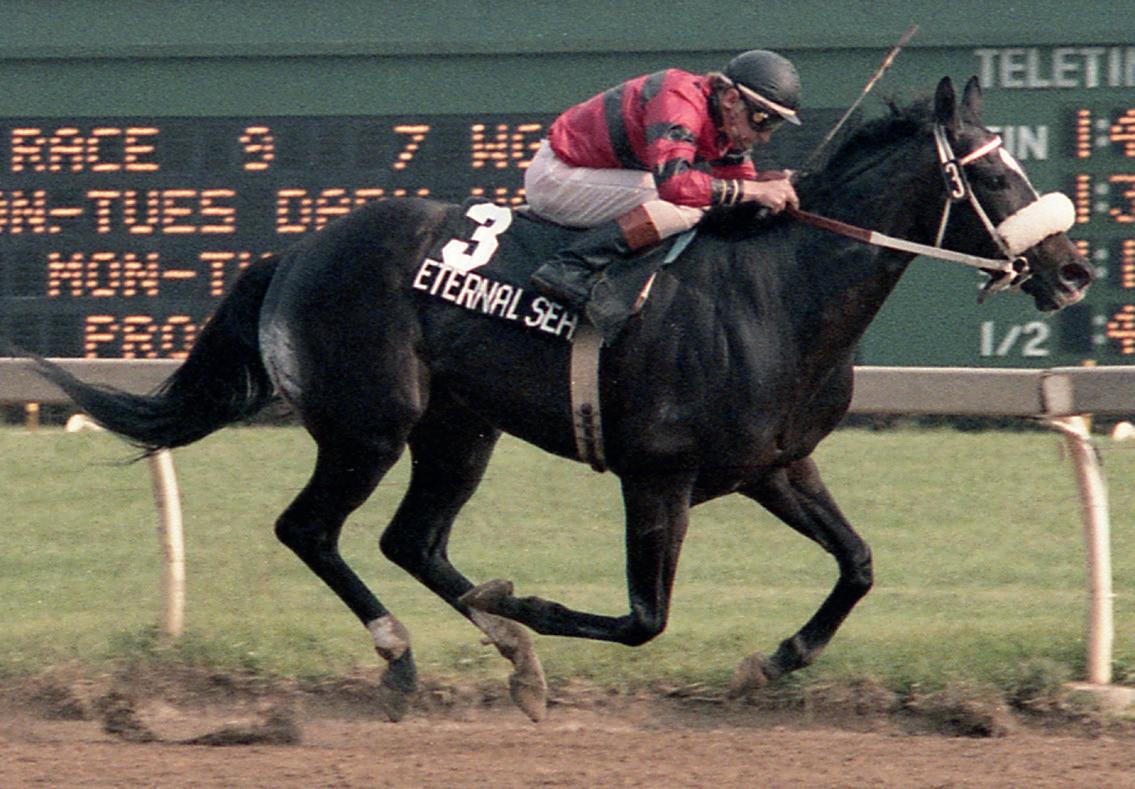
Belle Mahone Stakes | Duchess Stakes | Kingarvie Stakes | La Prevoyante Stakes | Maple Leaf Stakes Nassau Stakes (twice) | Ontario Colleen Handicap | Ontario Damsel Stakes | Ontario Fashion Handicap
Ontario Matron Handicap | Seaway Stakes | Victoriana Stakes (twice) | Whimsical Stakes
Fifteen stakes wins. First or second in 29 of her 44 starts. Three-time Sovereign Award winner. Good on dirt; good on turf.
“She was a very good racehorse,” Eternal Search’s owner Mel Lawson told BloodHorse magazine when his champion passed away in 2007.
“Winning three Sovereign Awards isn’t that simple up here – if you get one, you’re lucky.”
Mel’s son, Jim, felt the same. “I lived and breathed Eternal Search in my 20s,” he said.
Eternal Search’s beginning and her impact on Canadian racing is fascinating.
“Dad saw Eternal Search race one time as a two-year old,” said Jim, executive chair for Woodbine Entertainment. “It was just her second race and he liked what he saw.”
“Eternal Search was owned at the time by Pierre Levesque’s North American Bloodstock Agency and dad asked Pierre if he was interested in selling her. Pierre said yes and they agreed on a price of $50,000 with a caveat that if she ever won a stakes race my dad would have to give them an extra $25,000.”
Eternal Search, of course, did that 15 times.
Named Canada’s Champion Sprinter in 1981 as a three-year old and Canada’s Champion Older Mare in both 1982 and 1983, Eternal Search was a force to reckon with every time she ran.
Trained by Canadian Horse Racing Hall of Fame inductee Ted Mann, and later by Janet Bedford, Eternal Search’s first stakes victory was the November 12, 1980 Kingarvie Stakes at Greenwood in which she defeated the boys.
As a three-year old in 1981 she raced 13 times and won five stakes races: the Ontario Damsel Stakes, Duchess Stakes, Ontario Colleen Handicap, La Prevoyante Stakes, and Ontario Fashion Handicap.
The following year, when she was named Canada’s Champion Older Mare for the first time, she won six stakes: the Whimsical Stakes, Seaway Stakes, Victoriana Stakes, Nassau Stakes, Belle Mahone Stakes, and Maple Leaf Stakes.
In 1983 – her final year of racing – Eternal Search won three more stakes: the Ontario Matron Handicap, Victoriana Stakes, and Nassau Stakes.
Again, the attractive, dark brown mare with a big white blaze was named Canada’s Champion Older Mare. When she retired that fall, her career earnings were second behind only the fabulous Glorious Song for career earnings for Canadian fillies.
But her story doesn’t end there. As a broodmare, it was Eternal Search’s daughters that excelled as broodmares.
One example is Destroy, one of Eternal Search’s last foals. Destroy’s first three foals were all winners. Then she produced Smokey Fire, who won five stakes – three of them graded; Utterly Cool, who won the 2008 Cup and Saucer; Ghost Fleet, a two-time stakes winner at two in 2009; and then, at the age of 19, Mrs. Barbara, who was owned by Jim and who won the 2021 Mazarine Stakes before being named that year’s Champion Two-year Old Female. Destroy was voted the Outstanding Broodmare in Canada in 2010.
“With Mrs. Barbara that’s almost 50 years of Eternal Search’s prowess and impact on Canadian racing,” said Jim. “It’s a great Canadian thoroughbred family.”
OWNER
John D. Murphy, Sr. BREEDER
Mr. & Mrs. Rodes Kelly
PEDIGREE
1993 dk. b./br. h. Black Tie Affair (IRE) – Ingoldsby, by Screen King
CAREER RECORD
Starts 1st 2nd 3rd Earnings
16 8 4 1
$1,533,600
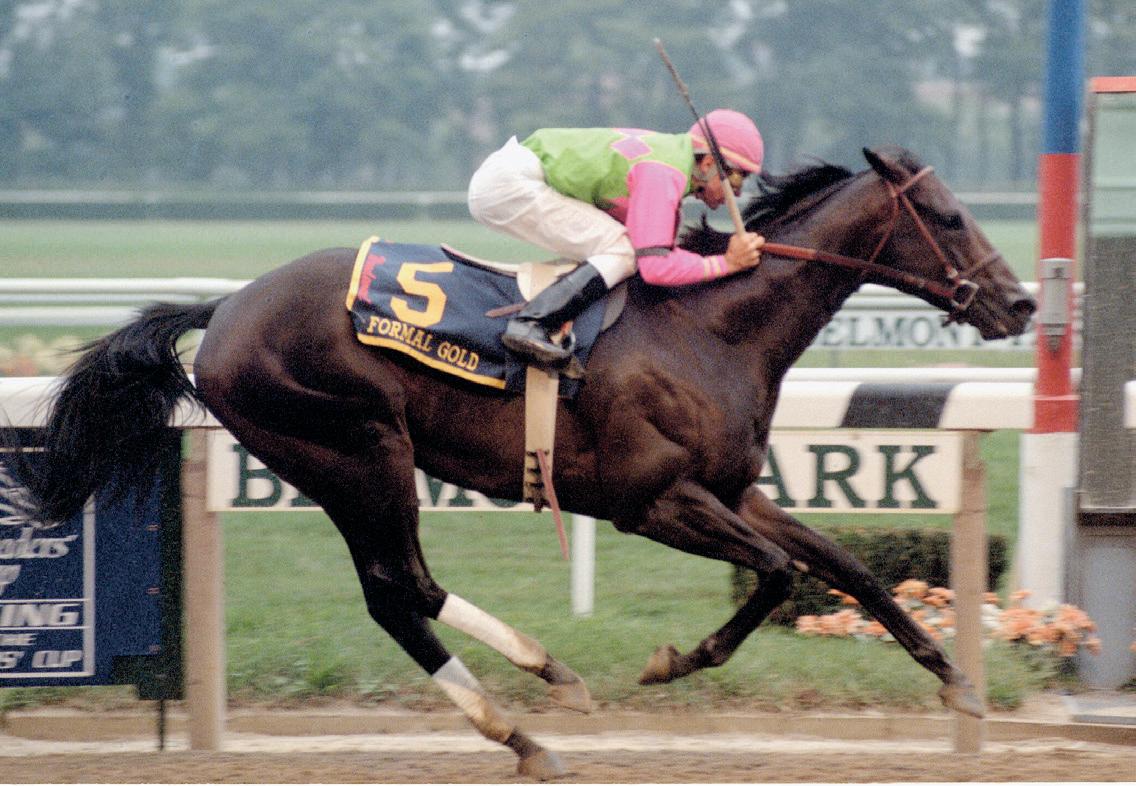
Donn Handicap – Grade 1 | Woodward Stakes – Grade 1 | Brooklyn Handicap – Grade 2
Philip H. Iselin Handicap – Grade 2
BIOGRAPHY
It is by no means a stretch to say that Formal Gold was as good as gold on the racetrack and as a sire.
Bred in Ontario by Rodes and Cathie Kelly, Formal Gold was by multiple graded stakes winner, Black Tie Affair (IRE), who won 18 times over a decorated 45-race career, highlighted by a sterling score in the 1991 Grade 1 Breeders’ Cup Classic.
Originally a $62,000 purchase at the Keeneland September, 1994 Yearling Sale, Formal Gold was subsequently re-sold as a two-year old at Fasig-Tipton New York – with a ticket price of $75,000 – to Massachusetts native John Murphy.
Formal Gold burst onto the racing scene in 1996 as a highly touted three-year old. Sent off at 4-5 in his first race, on June 12, 1996, at Monmouth Park, the dark bay humbled his closest rival by 18 3/4 lengths in the six-furlong main track race. That curtain-raising triumph yielded a Beyer Speed Figure of 112, the highest given to a first-time starter since Andrew Beyer established the performance ratings in the 1970s.
From there, Formal Gold won three consecutive races, all at the allowance level.
Trained by William Perry, Formal Gold then stepped into the stakes spotlight and finished a close second in the Grade 3 Pennsylvania Derby and Grade 1 Buick Meadowlands Cup Handicap. He concluded his season by running fifth to Alphabet Soup in the 1996 edition of the Grade 1 Breeders’ Cup Classic at Woodbine.
At four, Formal Gold got out of the gates with a sharp victory in the Grade 1 Donn Handicap, besting Eclipse Award 1996 Champion Three-year Old Colt, Skip Away. His dance card then took him on the road for a pair of premier fixtures, the Grade 1 Santa Anita Handicap, where
he was sixth behind the likes of Siphon (BRZ), Sandpit (BRZ), and Gentlemen (ARG) and the Dubai World Cup, in which he was fifth behind Singspiel (IRE) and familiar foes Siphon and Sandpit, before heading back to the United States.
Returning to action just under two months later, he would lose by a head after a compelling stretch battle with Skip Away in the Grade 3 Massachusetts Handicap at Suffolk Downs. Two weeks later, he recorded a four-length score in the Grade 2 Brooklyn Handicap at Belmont Park.
After a third to Skip Away in the Grade 2 Suburban Handicap at Belmont Park, Formal Gold lost a heartbreaker by a nose in the Grade 1 Whitney Stakes at Saratoga.
The dark bay then notched two emphatic wins, both over Skip Away. He set a track record in the Grade 2 Philip H. Iselin Handicap at Monmouth Park before taking the Grade 1 Woodward Stakes at Belmont.
An injury ahead of the 1997 Breeders’ Cup Classic at Hollywood Park ended his magnificent racing career at the age of four.
“I really felt he was going to run a big race in the Breeders’ Cup and, by winning it, would be Horse of the Year,” said an emotional Perry in an interview at the time. “Believe me, I wouldn’t have traded him for any other horse in the Breeders’ Cup.”
Formal Gold entered stud at Gainesway Farm in Kentucky in 1999, moved to Rancho San Miguel in California in 2004, then returned to Canada to stand his final years at Esquirol Farm in Alberta. He would go on to sire several graded stakes winners, including Adore the Gold, Semaphore Man, and Transduction Gold.
In 2023, he took his rightful place in the Canadian Horse Racing Hall of Fame.
OWNER
Ted Smith and Bill Marko BREEDER
T. Smith PEDIGREE
1978 ro. g. Ruritania – Native Flower, by Restless Native
CAREER RECORD
Starts 1st 2nd 3rd Earnings
55 27 10 3
$1,196,954

MAJOR WINS
Dominion Day Handicap – Grade 3 | Fayette Handicap – Grade 3 | Achievement Handicap Bold Venture Handicap | Bunty Lawless Stakes (twice) | Canadian Derby | Canadian Maturity
Col. R. S. Mclaughlin Stakes | Connaught Cup | Cup and Saucer Stakes | Eclipse Handicap (twice)
Jacques Cartier Stakes | Jockey Club Cup Handicap | National Jockey Club Handicap | Plate Trial Queenston Stakes | Speed to Spare Championship Stakes | Toronto Cup Handicap | Winnipeg Futurity
BIOGRAPHY
From Ontario to Alberta, Chicago to Kentucky, and halfway around the world in Tokyo, the remarkable Frost King won 27 races, carried staggering weight, and became one of the first millionaire racehorses born in Canada.
The rugged, grey Ontario-bred was one of the most popular horses in the land in the 1980s and he also had a following when he raced away from home. Bred by Ted Smith of Toronto, the son of Ontario stallion Ruritania twice went unsold at auction, first as a weanling for $8,500 and then as a yearling for $10,000. Smith then sold a half-interest in the horse to trainer Bill Marko and they christened him Frost King, a brand of a refrigerator that they saw lying on the road near the farm where he was born. Frost King won his second and third career starts as a two-year old, won the Winnipeg Futurity at Assiniboia Downs, and the Cup and Saucer on soft turf at Woodbine while starting 13 times in that first season.
Frost King was odds-on to win the 1981 Queen’s Plate (he was coupled with stablemate Mr. Achiever) and under regular rider Lloyd Duffy, he put up a good fight but missed by half a length and a nose, winding up third behind Fiddle Dancer Boy and Wayover. He won seven stakes races in that sophomore season, however, including the Canadian Derby at Northlands Park, Edmonton. Perhaps his greatest run that year was his second-place finish in the first running of the Japan Cup in Tokyo, when he finished second to the top older mare Mairzy Doates. Frost King was an overwhelming selection for the Sovereign Award for Champion Three-year Old Colt.
He was even better as a four-year old, winning 11 races, 9 of them stakes events. In two of those, the Bold Venture and Bunty Lawless, he had to lug 132 pounds to victory. He also toted 130 pounds when he won the National Jockey Club Stakes at Sportsman’s Park in Chicago.
He went to Japan again in the fall of 1982 and won a prep for the Japan Cup, but was unplaced in the big event. He was voted Canada’s Horse of the Year, Champion Older Horse and Champion Turf Horse by the voters for the Sovereign Awards.
At 5, he won his first graded stakes race, taking the Grade 3, 1 1/4 mile Dominion Day Stakes. He would make another successful trip to western Canada, taking the Speed to Spare Championship at Northlands and later that year, dead-heated to win in the Grade 3 Fayette Handicap at Keeneland. Frost King’s final career race would be the Bunty Lawless Stakes on firm turf; he finished third but suffered a fractured ankle. Dr. Robert McMartin performed the emergency surgery that would save his life.
Frost King was inducted into the Canadian Horse Racing Hall of Fame in 1986 and his career earnings of $1,196,954, made him the second-richest Canadian-bred at the time, behind only 1983 Kentucky Derby winner Sunny’s Halo.
OWNER
Frank Stronach; Nelson Bunker Hunt
BREEDER
E. P. Taylor
PEDIGREE
1976 b. m.
Halo – Ballade, by Herbager
CAREER RECORD
Starts 1st 2nd 3rd Earnings
34 17 9 1 $1,004,534
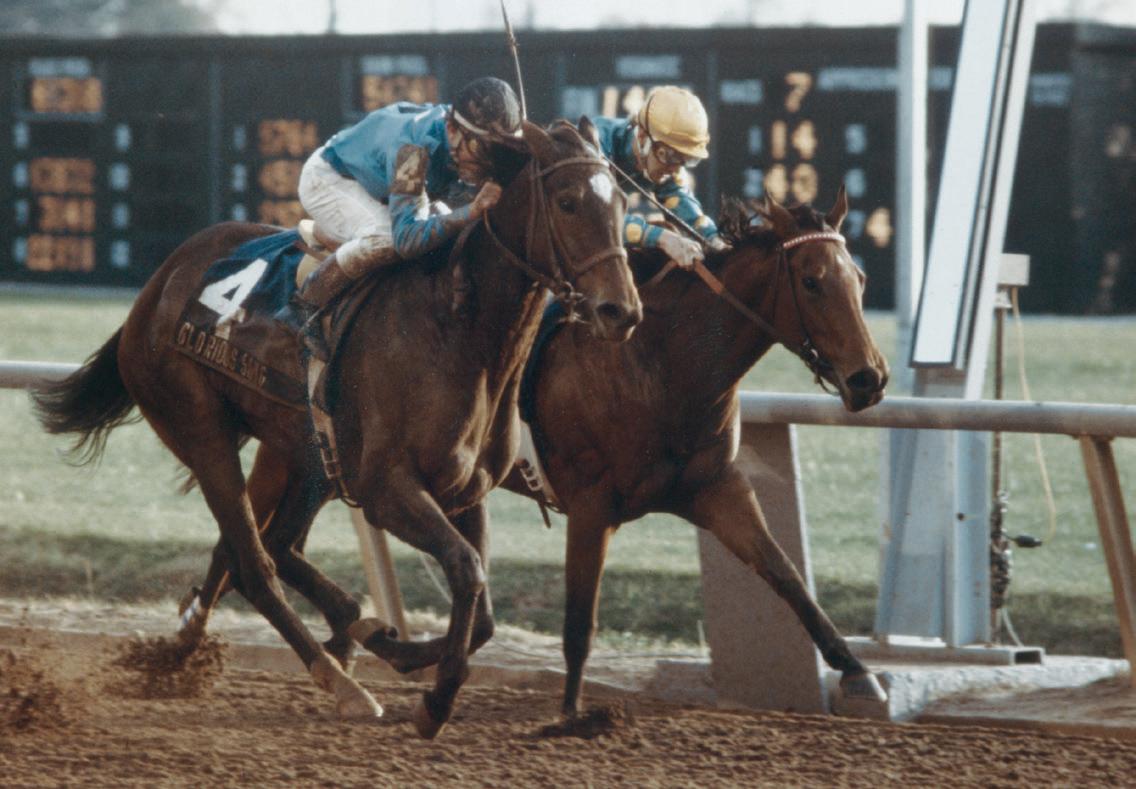
La Canada Stakes – Grade 1 | Santa Margarita Invitational Handicap – Grade 1 | Spinster Stakes – Grade 1 Top Flight Handicap – Grade 1 | Michigan Mile and One-Eighth Handicap – Grade 2
Santa Maria Handicap – Grade 2 | Dominion Day Handicap – Grade 3 (twice) | Belle Mahone Stakes Canadian Maturity | Maple Leaf Stakes | Ontario Damsel Stakes | Wonder Where Stakes
In her final start of an absolutely brilliant career, Glorious Song became Canada’s first millionaire on December 13, 1981, at California’s Hollywood Park. She was a three-time Sovereign Award champion, including being named Canada’s Horse of the Year in 1980, the same year she captured an Eclipse Award as North America’s Champion Older Filly or Mare after winning six of her 11 starts. She was simply amazing.
Owned by Frank Stronach and Nelson Bunker Hunt (Hunt becoming full owner in 1981), Glorious Song won exactly half of her 34 lifetime starts.
Bred by E. P. Taylor, Glorious Song was a daughter of Halo out of the unraced Herbager mare Ballade, who also produced U. S. champion Devil’s Bag and Saint Ballado. Glorious Song was purchased by Stronach at the 1977 CTHS Yearling Sale for just $36,000.
Four of Glorious Song’s victories came in Grade 1 races, three of them back-to-back-to-back in 1980 – the La Canada and Santa Margarita Invitational Handicap, both in February at Santa Anita, and the Top Flight Handicap at Aqueduct two months later. It was a Grade 1 hat trick which had not been accomplished by a Canadian-bred since the introduction of graded stakes classifications in 1974.
After losing by a nostril to Overskate in the Laurance Armour Handicap at Arlington, Glorious Song came back to defeat that stellar Canadian-bred rival in the Grade 2 Michigan Mile and One-Eighth Handicap in Detroit. Then came victories in the Grade 3 Dominion Day Handicap and the Canadian Maturity.
Ironically, one of Glorious Song’s most memorable races ended in defeat. Pitted against the mighty grey, Spectacular Bid, winner of the 1977 Kentucky Derby and
Preakness Stakes, Glorious Song gave him all he could handle in the Grade 1 Amory L. Haskell Handicap at Monmouth Park on August 6, 1980. Glorious Song – racing four-wide – finished second by less than two lengths in a most gutsy performance. Only one other horse (Flying Paster) had come that close to Spectacular Bid during his undefeated 1980 season.
Glorious Song’s performance earned her an invitation to the Grade 1 Marlboro Cup at Belmont where she was second to Winter’s Tale.
In 1981, she captured her fourth Grade 1 in the Spinster Stakes at Keeneland. That 12-start campaign also included runner-up finishes in the Grade 1 Santa Margarita Invitational Handicap at Santa Anita and the Grade 1 Beldame Stakes at Belmont. Glorious Song, a big, rangy bay, captured two other graded stakes that season, including the Grade 3 Dominion Day Handicap for the second straight year, setting the track record for a mile and one-eighth.
Glorious Song also achieved tremendous success as a broodmare, producing Singspiel (IRE), the Eclipse Award 1996 Champion Grass Horse who won Grade 1 races on four continents: the Dubai World Cup, Japan Cup, Coronation Cup, and Canadian International; Grade 2 winner and successful sire Rahy; and South African Group 2 winner Rakeen.
Glorious Song’s daughters were also great producers. Morn of Song produced 2003 Group 1 winner Mezzo Soprano, while Ring of Music is the dam of multiple Group 1 winner Campanologist. Glorious Song’s influence can be seen in the pedigrees of stakes horses around the world, with her descendants racing in Australia, Japan, South Africa, Venezuela, and in between.
Glorious Song was inducted into the Canadian Horse Racing Hall of Fame in 1995.
OWNER
Harlequin Ranches
BREEDER
Harlequin Ranches
PEDIGREE
2002 dk. b./br. m.
Smart Strike – Brassy Gold, by Dixieland Brass
CAREER RECORD
Starts 1st 2nd 3rd Earnings 9 4 3 1 $564,500
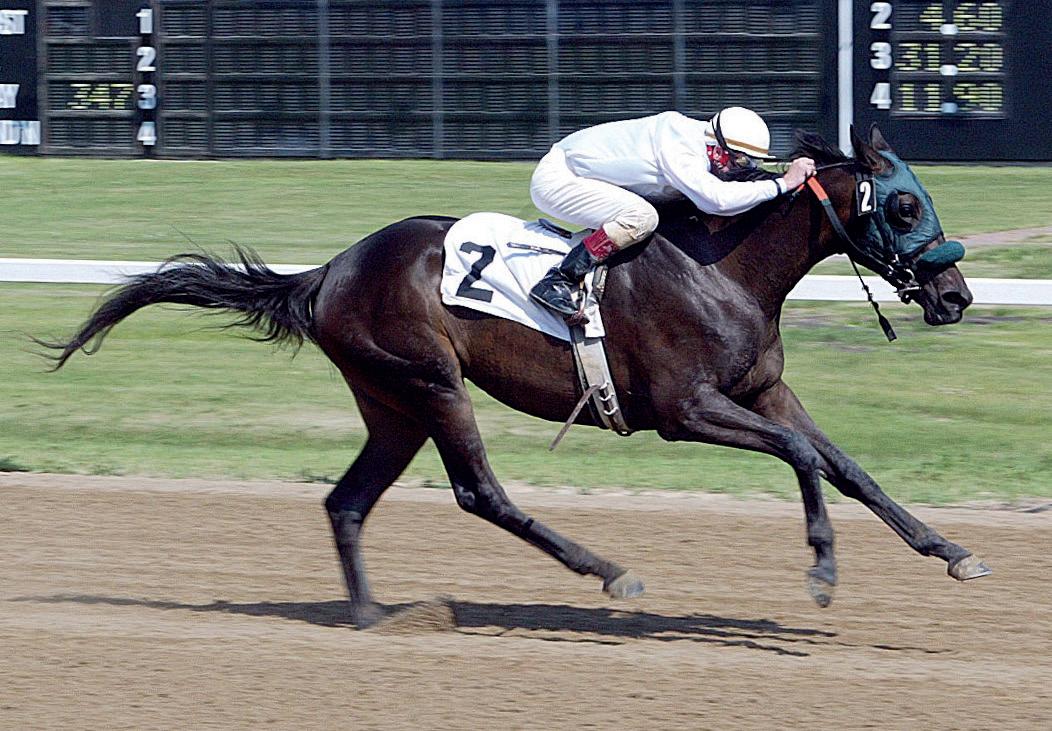
MAJOR WINS
Stakes – Grade 3 | Buffalo
BIOGRAPHY
Making a name for herself on the racetrack wasn’t the only stage where Gold Strike shone. As a Manitoba-bred, she made history as the dam of Rich Strike, the 2022 Kentucky Derby winner.
What her racing career lacked in length was more than made up by sheer brilliance, a filly who first mastered Manitoba and then wowed at Woodbine.
In her two-year old 2004 campaign, Gold Strike, a daughter of Sam-Son Farm standout Smart Strike and unraced British Columbia-bred Brassy Gold, won two of her three starts.
After a second in her debut at Assiniboia Downs, the dark bay delivered in two stakes appearances there.
She took the Debutante Stakes at 5 1/2 furlongs on the dirt and followed it up with a head-turning 15 3/4 length triumph in the one mile Buffalo Stakes. Trainer Blair Miller and owner/breeder Harlequin Ranches, nom de course of Dick Bonnycastle, a founding member of The Jockey Club of Canada, were elated.
Selected as the 2004 CTHS Manitoba-bred Champion Twoyear Old Filly, Gold Strike’s connections looked to mine her talents at Woodbine Racetrack. She moved to trainer Reade Baker’s barn in Toronto ahead of her 2005 season.
Her first test was the Star Shoot Stakes, where she finished a strongly closing second. One race later, she won the Grade 3 Selene Stakes.
It set the stage for an entry in the 1 1/8-mile Woodbine Oaks. Gold Strike took on nine rivals in the first jewel of the Canadian Triple Tiara series, cruising home to a 3 1/2 length score as the even-money choice.
Two weeks later, she completed her stellar sophomore season with a third to Wild Desert in the 146th edition of the Queen’s Plate.
Ahead of her four-year old season, Gold Strike was crowned the 2005 Sovereign Award winner as Champion Three-year Old Filly and the CTHS Manitoba-bred Horse of the Year.
After a second in the 2006 edition of the Grade 3 Hendrie Stakes, Gold Strike finished fourth in the Hill ‘n’ Dale Stakes, in what was her final lifetime start.
In many ways, it was only the beginning for the pride of Manitoba.
Gold Strike entered the broodmare ranks in 2007 and produced eight foals in total, four of whom were winners.
Her first foal was Lode Lady, a two-time winner and the dam of Neecie Marie – a stakes winner and twice placed in graded stakes to 2023. Her foal of 2011 was Llanarmon, winner of the Grade 2 Natalma Stakes in 2013. Her foal of 2015, Stoney Miss, has produced the 2023 Frost King Stakes winner, No More Options.
Gold Strike was purchased by Calumet Farm for $230,000 at the 2015 Keeneland November breeding stock sale, in foal to Sky Mesa. One year later, she was bred to Calumet’s stallion Oxbow. The resulting foal, My Blonde Mary was a three-time winner who sold in foal to Good Magic for $205,000 in November 2023.
In 2018, she was bred to Keen Ice, a son of leading sire Curlin. The resulting foal, a chestnut colt, was named Rich Strike. Trained by Eric Reed and ridden by Sonny Leon, he shocked the racing world by taking the 2022 Kentucky Derby at odds of 80-1.
Gold Strike’s tie to the Derby winner became big news in her home province and beyond.
“We’ve never had a horse connected to Manitoba even run in the Derby, so this is as close as it gets” said Darren Dunn, CEO of Assiniboia Downs. “To have the mother of the Kentucky Derby winner, I can’t even begin to tell you how rare that is.”
OWNER
Hillsbrook Farms; Speedway Stables LLC; DATTT Stable
BREEDER
Garland E. Williamson
PEDIGREE
2009 gr./ro. m.
Hard Spun – Like A Gem, by Tactical Cat
CAREER RECORD
Starts 1st 2nd 3rd Earnings
22 8 3 2 $1,262,171

Diana Stakes – Grade 1 | Gamely Stakes – Grade 1 | Jenny Wiley Stakes – Grade 1 Marshua’s River Stakes – Grade 3 | Cup and Saucer Stakes
BIOGRAPHY
Well-travelled, hard charging Hard Not to Like raced at nine different racetracks, winning at five of them, including three Grade 1 turf events.
An Ontario-bred daughter of Hard Spun out of the Tactical Cat mare, Like a Gem, she began her career at Woodbine, breaking her maiden at first asking in July of her two-year old campaign. She followed that up with an allowance victory the following month before testing tougher company in the Grade 3 Natalma Stakes, finishing a troubled fifth. She avenged that loss in her next start, beating the boys to take the Cup and Saucer Stakes. Hard Not to Like completed 2011 with a fifth in the Grade 2 Breeders’ Cup Juvenile Fillies Turf.
Her first start of 2012 yielded a second-place finish in the Grade 1 Central Bank Ashland Stakes, setting her up for a run at the Grade 1 Kentucky Oaks. There, she broke poorly and was never in contention, finishing sixth. Hard Not to Like did not race again at three.
Back on the turf in January of her four-year old season for the Grade 3 Marshua’s River Stakes at Gulfstream Park, she closed gamely for her fourth career victory. She was winless in six further outings in 2013, but managed a second in the Grade 3 Gallorette Handicap at Pimlico and a third in the Grade 2 Ketel One Ballston Spa Stakes at Saratoga.
Hard Not to Like won her first Grade 1 race in the spring of 2014 when the grey or roan mare took the Jenny Wiley Stakes at Keeneland with a come-from-behind masterpiece. She flew down the stretch to win a five-horse photo by half a length with jockey Javier Castellano needing room – and finding it – in deep stretch.
It was her second victory from just two starts that year. Bred and initially raced by Hillsbrook Farms’ Garland
Williamson, Hard Not to Like was purchased by Speedway Stables, Peter Fluor, and K. C. Weiner for $1.5 million from consignor Michael C. Byrne at the Keeneland Association November 2014 Breeding Stock Sale.
Racing as a six-year old for her new connections, she began 2015 with a victory in the Grade 3 Lambholm South Endeavour Stakes, but was disqualified and placed second after she came out sharply in deep stretch. Hard Not to Like was third next out in the Grade 1 Jenny Wiley Stakes before going on to win both the Grade 1 Gamely Stakes at Santa Anita and the Grade 1 Diana Stakes at Saratoga.
The $500,000 Diana on July 25, 2015 was probably the most impressive as she came flying late to win a three-horse photo over Tepin and Kitten’s Queen in the final strides. Going a mile and an eighth on the turf, Hard Not to Like set a new course record, getting the distance in 1:45.22.
That victory followed, what seemed in the running, an unlikely win in the $300,000 Gamely on May 25. Still sixth at the top of the stretch, Hard Not to Like characteristically unleashed her awesome late charge, getting up in the final strides to win by a desperate neck over Fanticola.
Hard Not to Like was unplaced in the Grade 1 Rodeo Drive Stakes at Santa Anita before being sold again, this time to DATTT Farm for $2.2 million at the Keeneland Association November 2015 Breeding Stock Sale. Back on the racecourse shortly after the sale, she stumbled badly at the break in the Grade 1 Matriarch Stakes at Del Mar, finishing unplaced in what would be her final career start.
Her first few foals have sold well, with her 2020 colt Faustin, by Curlin, the best so far with a second-place finish in the Grade 2 San Vicente Stakes in 2023.
OWNER
Terry Hamilton BREEDER
Red Hawk Ranch PEDIGREE
2011 b. h. English Channel – Ask the Question, by Silver Deputy
CAREER RECORD
Starts 1st 2nd 3rd Earnings
41 15 6 4 $2,035,090

Gulfstream Park Turf Stakes – Grade 1 | Maker’s 46 Mile Stakes – Grade 1 Bernard Baruch Handicap – Grade 2 | Ft. Lauderdale Stakes – Grade 2 | Canadian Turf Stakes – Grade 3 (twice)
Commonwealth Turf Stakes – Grade 3 | Jefferson Cup Stakes – Grade 3 | Knickerbocker Stakes – Grade 3 Oceanport Stakes – Grade 3 | River City Handicap – Grade 3 | Better Talk Now Stakes | El Prado Stakes
Born with a perfect white, heart-shaped marking on his forehead, the diminutive Heart to Heart also had the talent and, indeed, heart to make him one of the great Canadian-bred racehorses of his generation.
Bred by Manitoba’s Darrell Bauder, owner of Red Hawk Ranch, and foaled in Ontario at Steve and Kathleen Kemp’s Ballycroy Training centre in Loretto, Heart to Heart took his owner Terry Hamilton of Alberta on a wonderful ride for six seasons. He was a Grade 1 winner of over $2 million who won graded stakes races at half a dozen different tracks throughout North America and was one of the best grass horses on the continent during his career.
And Hamilton paid just $25,000 for the son of English Channel at the Canadian Thoroughbred Horse Society (Ontario Division) 2012 Canadian-bred Yearling Sale.
Heart to Heart began his career as a two-year old with American trainer Michael Stidham at Arlington Park in Chicago where he won his career debut by more than eight lengths. He came to Woodbine for his second race, the Vandal Stakes, and missed by a nose. He would finish unplaced in the Simcoe Stakes and Coronation Futurity that season.
Heart to Heart joined trainer Brian Lynch’s stable in 2014 and discovered grass racing, which would prove to be his best surface. Following a start in Canada’s most famous race, the Queen’s Plate on the Tapeta surface at Woodbine, and a third-place finish in the listed Toronto Cup Stakes, Heart to Heart ended his three-year old season with three consecutive stakes wins on the grass. He captured the Better Talk Now Stakes at Saratoga and two Grade 3 stakes,
the Jefferson Cup Stakes and Commonwealth Turf Stakes, at Churchill Downs. He was named Canada’s Champion Three-year Old Colt at the 2014 Sovereign Awards.
Through the next three seasons, Heart to Heart used his brilliant speed to win eight stakes, seven of them Grade 2 or Grade 3, while travelling to Florida, New York, and Kentucky. A scrappy competitor, Heart to Heart also placed in four Grade 1 events, often missing by less than a length.
It was at the age of seven that the popular horse finally got that elusive Grade 1 victory; in fact, he won two of them.
On February 10, 2018, Heart to Heart and his regular rider Julien Leparoux held on to win the 1 1/8 miles Grade 1 Gulfstream Park Turf Stakes by a neck. He came right back in April to win the prestigious Maker’s 46 Mile Stakes at Keeneland, also a Grade 1, by almost two lengths. The plucky bay almost made it three Grade 1s in succession, beaten only a neck in the Shoemaker Mile Stakes at Santa Anita in May.
Heart to Heart had a brief campaign at the age of eight before he was retired to stud duty. His career totals were impressive: 15 wins, 13 of them stakes, from 41 starts, and 10 other top three placings. His earnings made him the second richest Canadian-bred to come out of the CTHS Ontario Sale and one of the all-time leading Canadian-bred earners.
Heart to Heart entered stud in 2020 at Crestwood Farm in Lexington, Kentucky, and was inducted into the Canadian Horse Racing Hall of Fame in 2021. With several impressive two-year old winners from his first crop in 2023, it appears he’s already passing on those championship genes.
OWNER
Kinghaven Farms
BREEDER
Kinghaven Farms, Ltd.
PEDIGREE
1987 gr. c.
Icecapade – Shy Spirit, by Personality
CAREER RECORD
Starts 1st 2nd 3rd Earnings
21 11 2 2 $2,702,527
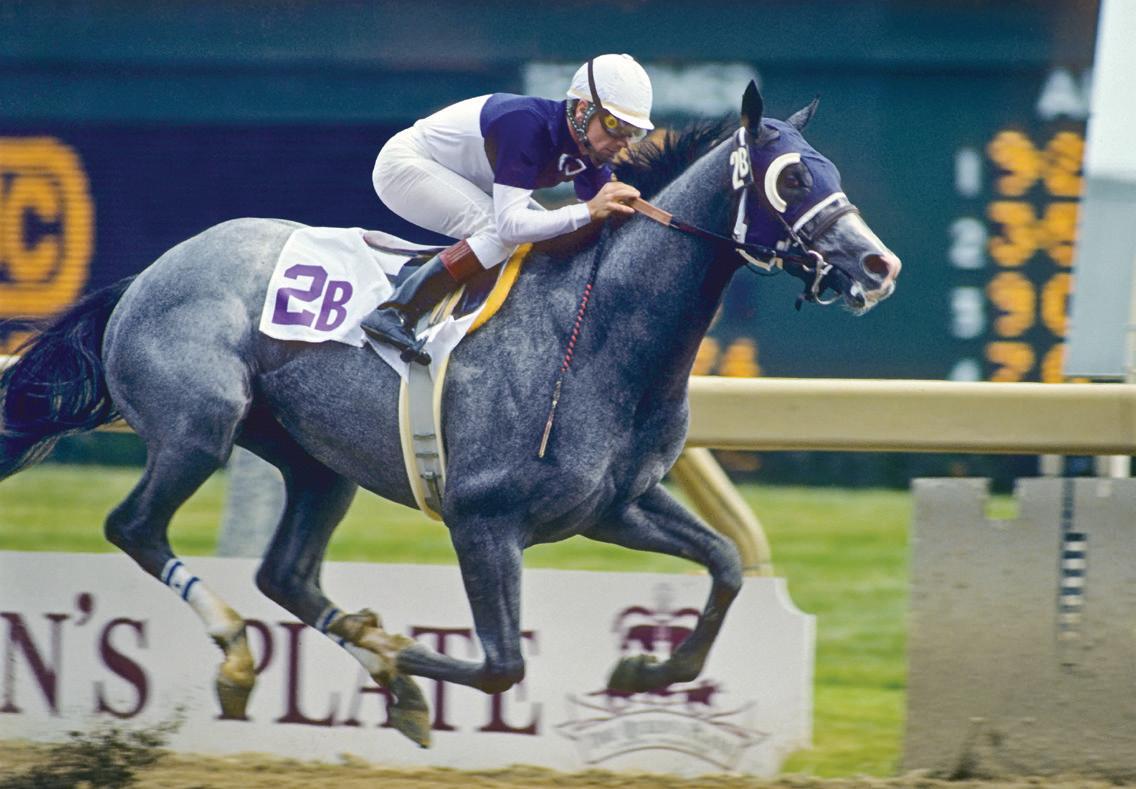
Canadian Club Turf Handicap – Grade 2 | Molson Export Million – Grade 2 | Eclipse Handicap – Grade 3 Forerunner Stakes – Grade 3 | Breeders’ Stakes | Heresy Breeders’ Cup Stakes | Plate Trial Stakes
Prince of Wales Stakes | Queen’s Plate Stakes | Transylvania Stakes
When he was born at Kinghaven Farms in King, Ontario in May 1987, Izvestia didn’t exactly give off the impression that he was to be the next great Canadian-bred racehorse. He was a scraggly grey son of Icecapade, not eye-catching like so many of ‘Bud’ and David Willmot’s long line of champions, born of their very successful breeding program. Only later, when he was on the track, would he show that he would become one of the greatest and fastest champions born in Canada.
To this day, Izvestia still holds the record for the largest margin of victory in the prestigious Queen’s Plate and the time record for the race when it was run on dirt. He is also one of only 12 horses to win the Canadian Triple Crown.
Izvestia debuted as a two-year old in the fall of 1989, soon after his stablemate With Approval had become the first horse in a quarter of a century to win the Canadian Triple Crown. Izvestia’s talent had been on display in morning workouts with trainer Roger Attfield, and he was fully expected to win that first race. Pre-race antics in the saddling enclosure saw the feisty colt fall over to the point he was almost scratched. Instead, he ran and won by six lengths.
Izvestia would race once more as a juvenile, a sixth-place finish over a sloppy track in the Coronation Futurity, before he was sent to Florida for the winter.
He began his three-year old season with a pleasing secondplace finish in a Gulfstream Park allowance race, then romped in the Transylvania Stakes on the grass at Keeneland. That victory would begin a magical eight-race winning streak.
He won the Grade 3 Forerunner Stakes at Keeneland and returned to Woodbine to win the Heresy Breeders’ Cup Stakes and Plate Trial Stakes. Bet down to just 3 to 5 in the Queen’s Plate, Izvestia flew to a 13-length victory under
jockey Don Seymour, who was merely a passenger. His time of 2:01.80 for 1 1/4 miles beat the track record set by Victoria Park 30 years earlier.
Izvestia, affectionately known as Izzy, easily completed the Bank of Montreal Triple Crown, rolling to wins in the Prince of Wales Stakes at Fort Erie and the Breeders’ Stakes on the turf at Woodbine. He wasn’t done yet. Meeting graded stakes winning colts in the Grade 2 Molson Export Million at Woodbine three weeks later, Izvestia romped to an easy win in front of a roaring crowd.
He completed his three-year old season with a third-place finish in the Grade 1 Jockey Club Gold Cup and a sixth-place finish in the Grade 1 Breeders’ Cup Classic, both at Belmont Park. He was the unanimous Canadian Horse of the Year, Champion Three-year Old Colt, and Champion Grass Horse at the 1990 Sovereign Awards.
Izvestia returned as a four-year old in 1991, winning the Grade 2 Canadian Club Turf Handicap at Gulfstream Park and the Grade 3 Eclipse Handicap on the dirt at Woodbine. The colt would then travel to some of the biggest races south of the border. He didn’t win again, although he placed in two graded stakes. He returned to Woodbine for the Seagram Cup Handicap, meeting champion Sky Classic. He finished second only to be disqualified and placed last. In search of his first Grade 1 win, Izvestia went to the post for the Rothmans Ltd. International Stakes. Early in the race, the colt suffered a broken hind leg and was pulled up by jockey Mickey Walls. Tragically, he could not be saved.
The brilliant Izvestia went into the Canadian history books with a record of 11 wins in 21 starts and earnings of $2,702,527. He was inducted into the Canadian Horse Racing Hall of Fame in 1999.
OWNER
Catherine Day Phillips and Todd Phillips
BREEDER
Gustav Schickedanz
PEDIGREE
2002 dk. b./br. g.
Langfuhr – Muskrat Suzie, by Vice Regent
CAREER RECORD
Starts 1st 2nd 3rd Earnings 23 9 1 7 $1,643,446
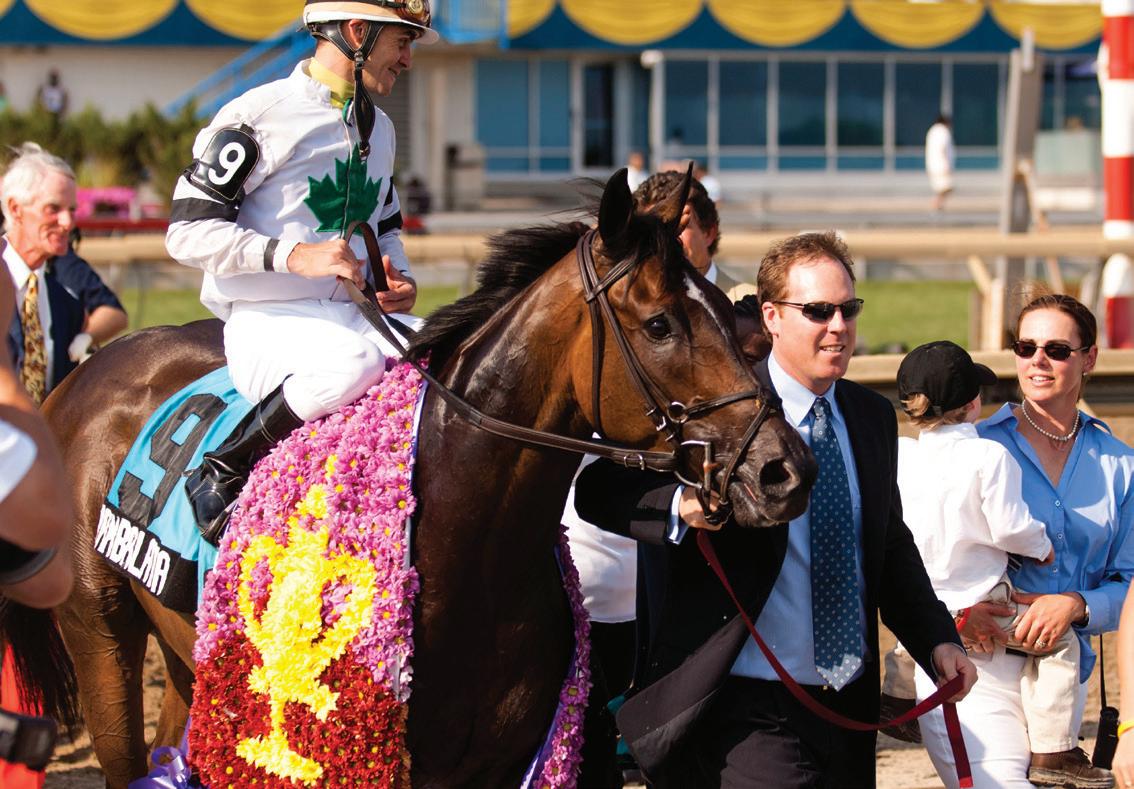
Arlington Million Stakes – Grade 1 | Gulfstream Park Breeders’ Cup Turf Stakes – Grade 1 Bulleit Bourbon Pan American Handicap – Grade 3 | Saranac Stakes – Grade 3 | Breeders’ Stakes Singspiel Stakes
Jambalaya could make a case as thoroughbred racing’s poster horse for fairytale endings. There was nothing, aesthetically or otherwise, that suggested the gangly, unassuming youngster was destined for greatness.
But that was exactly what was in store for Jambalaya, a horse with a backstory worthy of a Hollywood script.
The opening chapter came at the 2003 September yearling sales at Keeneland. Bred by Gustav Schickedanz, the colt, a son of Langfuhr (himself an offspring of one of Northern Dancer’s most prolific sons, Danzig), was out of the Vice Regent mare, Muskrat Suzie.
An error at the yearling sale allowed the colt to go through the auction ring without a reserve bid. The sale price? A mere $2,500 purchase made by dual Hall of Fame trainer Mark Casse.
Soon after, Casse sold Jambalaya to Woodbine-based conditioner Catherine Day Phillips, who signed the bill of sale.
Third in his career debut in 2004, Jambalaya was seventh in a pair of dirt races to open his 2005 campaign, dashing the hopes of a possible spot in The Queen’s Plate starting gate. Day Phillips, who won a Grade 3 race with Heat It Up, a relative of Jambalaya, then turned her attention to the turf for her unproven charge.
The move to the green scene was the perfect recipe for Jambalaya.
He broke his maiden and won an allowance race before his breakthrough triumph in the Breeders’ Stakes, a race he won by eight lengths as the 6-5 choice. One month later, he took the Grade 3 Saranac Stakes at Saratoga.
His lone victory in 2006 was the Singspiel Stakes at Woodbine, a campaign that also included a trio of graded
stakes placed efforts. A myriad of ailments would be a constant throughout his racing career, but his connections worked determinedly to ensure he was sound and at the top of his game.
That faith was rewarded one year later with an incredible winning performance in the Grade 1 Gulfstream Park Breeders’ Cup Turf Stakes, where Jambalaya bested Honey Ryder and champion turf star Einstein. It also delivered Day Phillips her first Grade 1 crown. Five weeks later, Jambalaya starred again on the Gulfstream turf, taking the Grade 3 Pan American Handicap.
In August of that 2007 season, Jambalaya faced a formidable group of foes in the Grade 1 Arlington Million, the star-stacked field featuring a pair of turf titans in multiple graded stakes winner The Tin Man and French star Doctor Dino.
Racing over a wet Arlington grass course, Jambalaya tracked down The Tin Man in the final yards to take all the spoils and become the first Canadian-bred to win the race. The breathtaking victory also marked the first time a woman had trained an Arlington Million winner. He suffered a bruised cannon bone in the race, an injury that would keep him out of action for just over two years.
But in typical fashion, the horse with the tiny price tag showed the big heart he came to be known for. The Ontario-bred won an allowance race at Woodbine in his return to action on September 9, 2009, and then went to Aqueduct for the Grade 2 Red Smith Handicap, where he was fifth, only two lengths behind the winner.
The gutsy gelding was retired shortly thereafter and resides at Catherine Day Phillips’ Kingfield Farms in Maple, Ontario. He was inducted into the Canadian Horse Racing Hall of Fame in 2012.
OWNER
Wesley A. Ward
BREEDER
Adena Springs
PEDIGREE
2009 ch. m.
Ghostzapper – Holy Blitz, by Holy Bull
CAREER RECORD
Starts 1st 2nd 3rd Earnings
22 9 9 2
$1,815,922
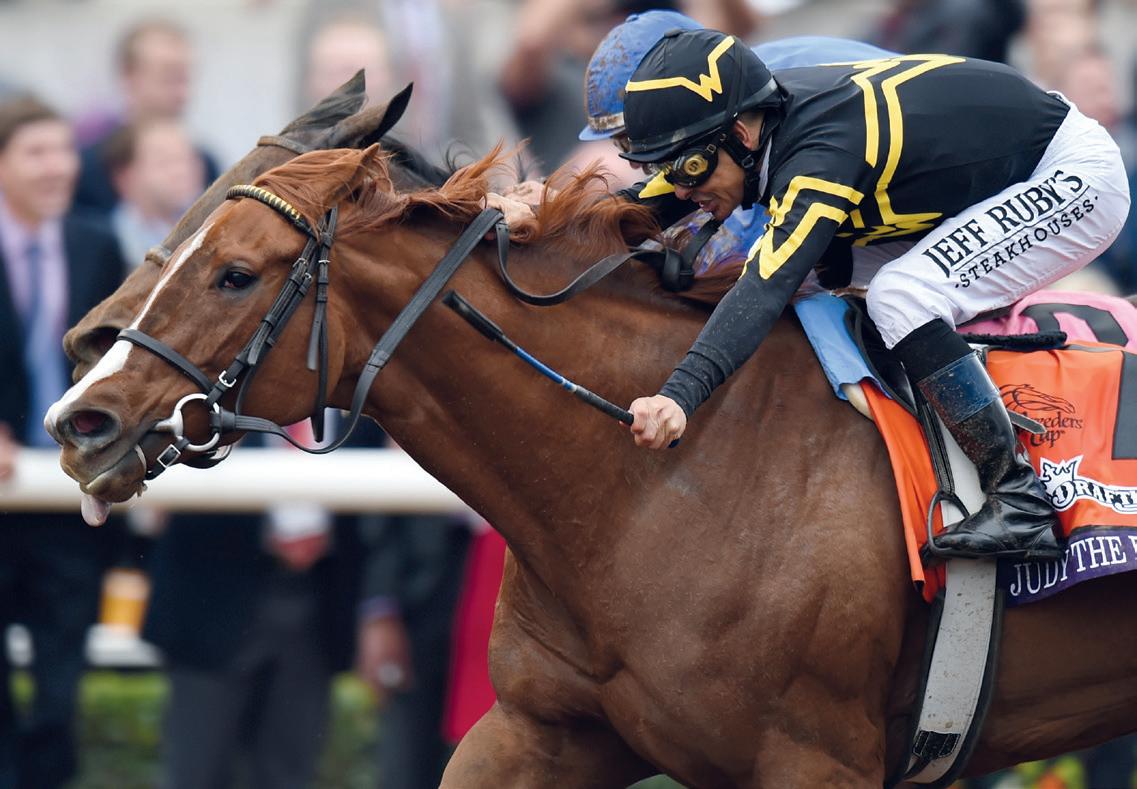
DraftKings Breeders’ Cup Filly and Mare Sprint – Grade 1 | Madison Stakes – Grade 1
Thoroughbred Club of America Stakes – Grade 2 | Las Flores Stakes – Grade 3
Rancho Bernardo Handicap – Grade 3 | Shady Well Stakes
When the votes were tabulated for 2014’s Eclipse Champion Female Sprinter, Judy the Beauty received 261 of 265 possible votes in the Eclipse poll. The other four candidates received one vote each. Judy the Beauty’s dominance in the balloting wasn’t surprising one bit. What was surprising was that it wasn’t unanimous.
After all, Judy the Beauty was simply magnificent that season. She won the DraftKings Breeders’ Cup Filly and Mare Sprint in an extremely gutsy performance. After sweeping five-wide to take the lead in mid-stretch, she then somehow managed to dig deep to hold off the powerful late charge of Better Lucky, who looked for all the world like she was going to go right on by. But Judy the Beauty, who finished a strong second to two-time Eclipse Champion Female Sprinter Groupie Doll in this event the previous year, prevailed by a head. She just refused to lose.
That thrilling victory convinced owner/trainer and former Eclipse Champion Apprentice Jockey Wesley Ward to let Judy the Beauty run again in 2015.
As a six-year old that year, she failed to win any of her four starts but was placed in the Grade 1 Humana Distaff Stakes, Grade 2 Honorable Miss Handicap, and Grade 2 Thoroughbred Club of America Stakes. Aiming for a repeat in the Breeders’ Cup Filly and Mare Sprint, she closed out her splendid career with a fifth-place finish after repeatedly bumping with Merry Meadow in the stretch. It was only the second time that she finished out of the top three in her wonderful career.
Consigned to the Keeneland September Yearling Sale by breeder Frank Stronach’s Adena Springs, the daughter of 2004 Breeders’ Cup Classic winner Ghostzapper was bought by Ward for just $20,000.
A chestnut with a white blaze, Judy the Beauty’s two-year old campaign showed what was to come when she was sent to Europe and won the Prix Caravelle over 1,000 metres on turf at Chantilly Racecourse in just her second career start. She then won Woodbine’s Shady Well Stakes and was second in the Grade 1 Spinaway Stakes at Saratoga after getting caught in the final sixteenth of a mile.
Limited to just three starts at three, Judy the Beauty lost by a nose to Emma’s Encore in the Grade 1 Prioress Stakes and was also second in the Grade 2 Gallant Bloom Handicap.
As a four-year old in 2013, in addition to the aforementioned Breeders’ Cup Filly and Mare Sprint, Judy the Beauty made five starts, winning two of them, including the Grade 2 Thoroughbred Club of America Stakes over six furlongs at Keeneland. She was also second in the Grade 3 Winning Colors Stakes at Churchill Downs and the Grade 1 Princess Rooney Handicap at Calder.
In her five starts of 2014, Judy the Beauty won the first two, taking the Grade 3 Las Flores Stakes by four and threequarter lengths and the Grade 1 Madison Stakes as the 3-5 favourite when she was forced to race four-wide on the turn. That year, Judy the Beauty also won the Grade 3 Rancho Bernardo Stakes when ridden by Mike Smith for the first time.
After winning the Breeders' Cup Filly and Mare Sprint, Ward told BloodHorse “This is the kind of horse that keeps you going, keeps you working hard in this game. Horse racing is all about dreams coming true.”
Judy the Beauty was inducted into the Canadian Horse Racing Hall of Fame in 2018.
OWNER
Gustav Schickedanz BREEDER
Gustav Schickedanz PEDIGREE
1992 b. h. Danzig – Sweet Briar Too, by Briartic
CAREER RECORD
Starts 1st 2nd 3rd Earnings 23 9 7 1 $698,574

Carter Handicap – Grade 1 | Metropolitan
1 Forego Handicap – Grade 2
BIOGRAPHY
“He meant the world to us and changed our lives for the better. He was a gentleman to train. Definitely the best horse I ever trained. He made my career and I will never, ever forget him.”
The words of Canadian Horse Racing Hall of Fame conditioner Mike Keogh on October 20, 2023, are a heartfelt and deserving tribute to fellow hall of famer Langfuhr, who held status as both an outstanding competitor and standout stallion.
Owned and bred by the late, honoured Hall of Fame member, Gustav Schickedanz of Ontario, Langfuhr was by Danzig, one of Northern Dancer’s most accomplished sons at stud and an elite sire of sires. Unraced at 2, Langfuhr made a winning debut in April 1995 at Woodbine. He would go 3-4-1 from 11 starts at 3 and was beaten by a whisker in the Plate Trial Stakes.
One year later, he rose up the ranks to become one of the sport’s most redoubtable sprinters and middle-distance performers, including his performances in New York, where he won the Grade 2 Forego Handicap and the Grade 1 Vosburgh Stakes.
In 1996, he was feted as Canada’s champion sprinter at the Sovereign Awards. The next spring, he launched his five-year old season at Woodbine with a second in the Vigil Stakes before heading to the U. S., where he added a pair of Grade 1 triumphs, namely, the Carter Handicap at Aqueduct and the Metropolitan Handicap at Belmont.
Langfuhr’s career ended after Keogh found a slight filling in his star’s left foreleg following his stakes success in the Empire State. His career concluded with nine wins and 17 top-three finishes in 23 races.
While his racing life had reached the finish line, Langfuhr’s impact on the racing world was just beginning. His status
as one of the top sires in North America became frontpage racing news in 2003 when his top performers were Canada’s Horse of the Year and Canadian Triple Crown winner Wando ($2.1 million) and multiple stakes-winner Mobil ($1.6 million).
In 2004, one of his sons, Imperialism, finished third in the Kentucky Derby after victories in the San Vincente and San Rafael Stakes, was second in the Santa Anita Derby, and eclipsed the $1 million mark in earnings. Imperial Gesture, a dark bay filly owned by Godolphin, went 6-2-1 from 11 starts in 2001 and 2002, winning two Grade 1 stakes and earning over $1.4 million.
Langfuhr’s success stories don’t end there.
He was the leading sire in North America by number of winners in 2005, including 14 stakes winners. One of those stars was Catherine Day Phillips’ trainee, Jambalaya, the winner of two Grade 1 stakes in 2007, including the Arlington Million. Langfuhr also sired Lawyer Ron, a top contender for the 2006 Kentucky Derby, who would become a multiple stakes winner, 2007 Eclipse Champion Older Horse, and earner of $1.2 million.
Langfuhr twice finished fifth on the North American Leading Sires List (in 2003 and 2007) and his 1,839 foals from 21 crops have earned nearly $120 million at the time of writing.
Langfuhr joined the Lane’s End stallion roster in 2004, where, prior to his passing in 2023, he had been pensioned since 2018.
“We are deeply saddened to share that champion Langfuhr has passed away at age 31,” the farm shared in a social media posting. “We are grateful for the many years we had with him. Langfuhr’s intelligence and kind temperament will have a lasting impact on all who had the opportunity to work with him.”
OWNER
Gary Barber
BREEDER
Paradox Farm
PEDIGREE
2011 b. m.
Sligo Bay (IRE) –Oneexcessivenight, by In Excess (IRE)
CAREER RECORD
Starts 1st 2nd 3rd Earnings 24 10 4 4 $1,763,538
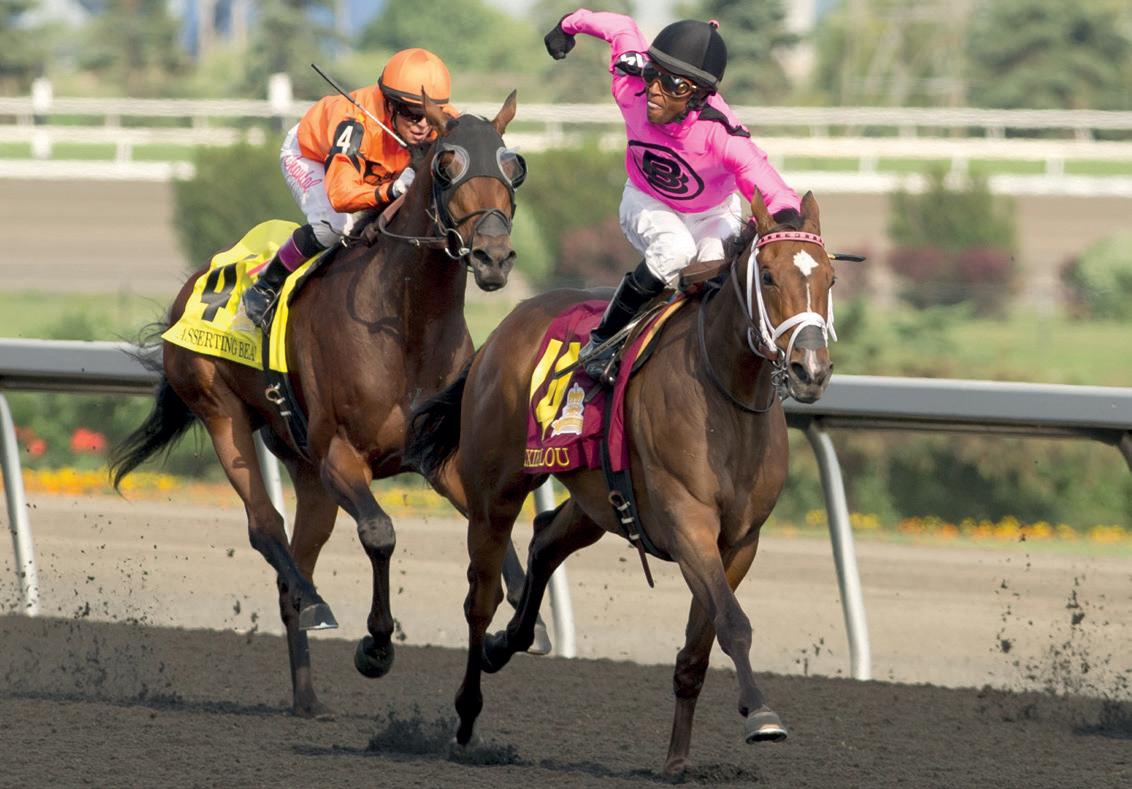
Dance Smartly Stakes – Grade 2 | Nassau Stakes – Grade 2 | Autumn Miss Stakes – Grade 3 Muskoka Stakes | Queen’s Plate Stakes | South Ocean Stakes | Victoriana Stakes Wonder Where Stakes | Woodbine Oaks Presented by Budweiser
One of the great bargains in racing history, Lexie Lou was Canadian racing’s darling, with a modest pedigree but immeasurable talent and class. The bay daughter of Ontario stallion Sligo Bay (IRE) provided one of Canada’s all-time leading trainers, Mark Casse, with his first Queen’s Plate victory and went on to be named Canada’s Horse of the Year and a winner of three other Sovereign Award championships. Longtime Woodbine owner and trainer John Ross, well known for having a sharp eye for a racing prospect at the Ontario yearling sale, paid $5,500 at the Canadian Thoroughbred Horse Society (Ontario Division) 2012 Canadian-bred Yearling Sale. Bred by Paradox Farm of Dr. Mike Colterjohn in Caledon, Ontario, Lexie Lou was named for Ross’ granddaughter.
The filly showed she was going to be a fun one for Ross and his family early in her career. In her first start, she barged her way up a narrow path along the rail to win, impressing anyone who was watching. Following two unplaced starts in the Shady Well Stakes and Nandi Stakes, she was placed first through disqualification in the Muskoka Stakes. She went on to finish second in the Victorian Queen Stakes and Princess Elizabeth Stakes, then won the South Ocean Stakes, before finishing third by a neck in the Ontario Lassie Stakes. That was $310,000 Lexie Lou earned for Ross in that first season of racing.
After a strong closing finish when fourth in the six-furlong Star Shoot stakes in her three-year old debut in 2014, prominent owner Gary Barber made an offer for Lexie Lou that Ross could not refuse.
Casse took over the filly’s training and, following a close thirdplace finish in the Fury Stakes, she had her blinkers removed and a glorious winning streak began. She took the Woodbine Oaks by 4 1/2 lengths, then, in the $1 million Queen’s Plate,
she came from post position 14 with jockey Patrick Husbands to beat the boys in the Canadian classic, becoming just the sixth filly to win the Oaks/Plate double and putting Casse and Barber into the winner’s circle for their first Plate victory. Five weeks later, she rolled to an easy three-length win in the Wonder Where Stakes on the turf.
After a mysterious, last-place finish against older mares in the Grade 2 Canadian Stakes, Lexie Lou headed west to California where she bounced back with a victory in the Grade 3 Autumn Miss Stakes. Her next start was perhaps one of the most exciting of her career. Meeting that year’s Kentucky Derby winner California Chrome in the Grade 1 Hollywood Derby, Lexie Lou chased home the Eclipse Champion Three-year Old Colt and Horse of the Year to be second by two lengths in a proud moment for an Ontariosired and -bred filly. She was named Canada’s Horse of the Year at the 2014 Sovereign Awards as well as Champion Three-year Old Filly and Champion Grass Mare.
Still in California for the start of her four-year old campaign, Lexie Lou tested a dirt surface for the first time, finishing second in the Grade 2 La Canada Stakes. It was to be her only start that year when an eye injury delayed her return to racing.
In 2016, as a five-year old, she won two more Grade 2 stakes – the Nassau Stakes and Dance Smartly Stakes –before she was retired in the summer. She won her second Champion Grass Mare Sovereign Award.
Lexie Lou was sold by Barber at the Keeneland Association November 2016 Breeding Stock Sale for $1 million to Japan’s K I Farm and is off to a good start as a broodmare, having produced Japanese Grade 1 winner Danon Scorpion.
Lexie Lou was inducted into the Canadian Horse Racing Hall of Fame in 2019.
OWNER
Glen Hill Farm BREEDER
Sean Fitzhenry
PEDIGREE
2008 dk. b./br. m.
Medaglia d’Oro – Instant Thought, by Kris S.
CAREER RECORD
Starts 1st 2nd 3rd Earnings
21 10 5 1 $2,015,893
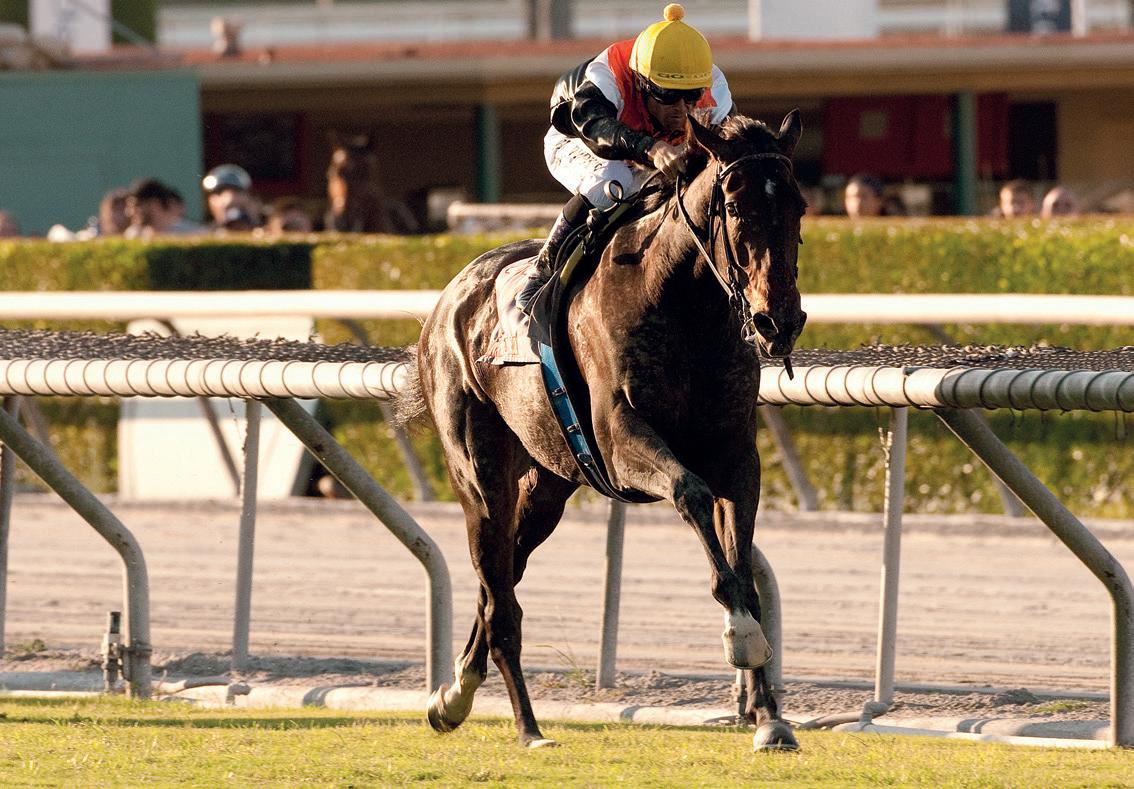
Gamely Stakes – Grade 1 | Rodeo Drive Stakes – Grade 1 | Dance Smartly – Grade 2 Mrs. Revere Stakes – Grade 2 | Nassau Stakes – Grade 2 | Pucker Up Stakes – Grade 3
Sunset Handicap – Grade 3 | Wonder Where Stakes
Her first race did not inspire a wealth of confidence, the footnotes from the six-furlong sprint over the Gulfstream Park dirt on March 13, 2011, offering no sign of what was to come for the dark bay/brown filly bred in Ontario by Sean Fitzhenry.
MARKETING MIX was off slowly, came wide into the stretch and had no rally.
But Marketing Mix would find her best stride and become a force on the racetrack.
A sharp score next time out at Keeneland one month later got the ball rolling for the $150,000 (U. S.) buy at the Keeneland Association September 2009 Yearling Sale.
Unraced at two, she had a full dance card in her rookie year for owner Glen Hill Farm, going postward on nine occasions. Marketing Mix would win four of those starts, including three stakes, highlighted by victories in the Grade 3 Pucker Up Stakes at Arlington and Grade 2 Mrs. Revere Stakes at Churchill Downs. She also ventured north to Woodbine that year, earning a second in the Fury Stakes, a third in the Woodbine Oaks, and her first stakes win in the Wonder Where Stakes.
Given a five-month break after capturing the Mrs. Revere, Marketing Mix was back on track and at the top of her game from the outset of her four-year old campaign. Trained by Tom Proctor, she won an allowance race at Keeneland convincingly, defeating her Woodbine Oaks rival Inglorious in a prelude of what was in store for her in 2012. She duplicated her previous four-win campaign, this time in seven starts. She won consecutive Grade 2 events, the Nassau Stakes and Dance Smartly Stakes, both at Woodbine, before recording her first Grade 1 triumph in the
Rodeo Drive Stakes at Santa Anita. Her season concluded with a runner-up effort in the Grade 1 Breeders’ Cup Filly and Mare Turf at Santa Anita.
Marketing Mix was back in the Grade 1 winner’s circle in her five-year old debut, taking the Gamely Stakes at Hollywood Park. One race later, she won the Grade 3 Sunset Handicap at the same venue. She then finished fourth and second, respectively, in the Grade 1 Beverly D. Stakes and Rodeo Drive Stakes, before finishing fifth in the Grade 1 Breeders’ Cup Filly and Mare Turf at Santa Anita, in what was to be her final start.
The mare who had launched her career with a forgettable eighth-place finish ultimately became one of the best turf distaffers of her generation, winning seven graded stakes while facing stout competition at nearly every turn.
Visiting the likes of leading sires Tapit, War Front, and Into Mischief in her first few trips to the breeding shed, her first foal, the Tapit filly Azm, was a $1.1 million weanling at the Keeneland Association November 2015 Breeding Stock Sale.
Perhaps none of what she accomplished is that surprising considering her family tree which traces back four generations to the legendary Northern Dancer through both her sire, Medaglia d’Oro, and dam, Instant Thought.
The words of champion rider Patrick Husbands spoke volumes of what it was like to ride Marketing Mix after the pair won the 2011 Wonder Where Stakes at Woodbine.
“The word from the trainer was to get her relaxed and put her behind horses. She was relaxed throughout the whole race. She was never aggressive. When I got a break at the bottom of the lane, she gave me everything (she had)."
OWNER
James and Alice Sapara; Mark Gorman, Nick J. Mestrandrea and Jim Perry
BREEDER
Mike Carroll & John C. Harvey Jr. PEDIGREE
2001 b. m.
Elusive Quality – Sly Maid, by Desert Wine
CAREER RECORD
Starts 1st 2nd 3rd Earnings
28 9 5 1 $1,334,331
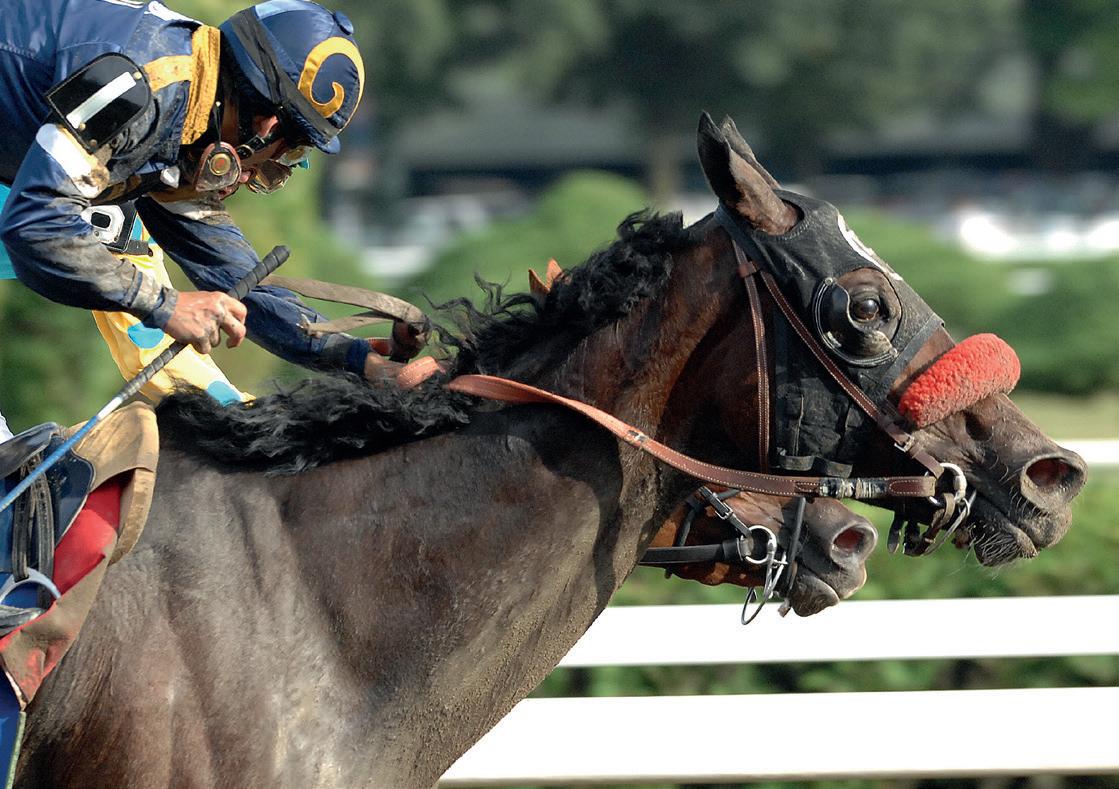
Ballerina Stakes – Grade 1 | Distaff Breeders’ Cup Handicap – Grade 2 Breeders’ Cup Filly and Mare Sprint | Emirates Airline Very Subtle Stakes | Flower Girl Handicap
Foaled in Belwood, Ontario, at Mike Carroll’s Grandview Farm, Maryfield was large for a newborn filly. She was the fourth foal for Sly Maid, who had been purchased by Carroll and his friend John Harvey, Jr. Maryfield grew into an attractive yearling and brought $80,000 from Canadians Jim and Alice Sapara at the 2002 Keeneland September Yearling Sale.
Maryfield showed blazing speed in her training with Josie Carroll but only raced once as a juvenile. It was not until July of 2004 that she won her maiden, taking a seven furlong dirt event by 8 3/4 lengths.
Carroll gave Maryfield more time to grow and mature, putting the filly away until 2005. She came back to win an allowance race on Woodbine’s opening day, then doubled up a month later in a turf race. She tried stakes company in September, in the Grade 3 Seaway Stakes, but faded to last place.
In January 2006, Carroll sent Maryfield to race in California, entered for a claim for the first time. Maryfield finished fourth and was claimed for $50,000 by a new ownership group of Mark Gorman, Nick Mestrandrea, and Jim Perry. Trainer Doug O’Neill, eager for the new owners to enjoy quick success with their horse, dropped Maryfield into a $40,000 claiming race and she won the dirt sprint in front-running fashion. That was the last time Maryfield would see the claiming ranks, making all 16 of her remaining starts in stakes races.
She earned her first stakes score in the Flower Girl Handicap at Santa Anita and picked up further black type in her three following stakes races, including a second in the Grade 2 A Gleam Invitational Handicap at Hollywood Park. Two starts later, Maryfield returned to Ontario for the Seaway Stakes, this time finishing second. In her final start of 2006, she won the Very Subtle Stakes at Churchill Downs, leading all the way.
At the outset of Maryfield’s six-year old season, O’Neill
elected to experiment with the mare’s running style – he wasn’t convinced she was at her best when utilizing a speed style. In her fourth race of the year, the Grade 2 Distaff Breeders’ Cup Handicap at Aqueduct, jockey Jorge Chavez kept Maryfield away from the hot pace and she responded with a 2 1/4 length win.
O’Neill mapped out a late-season plan for her that would culminate with the inaugural running of the Breeders’ Cup Filly and Mare Sprint, contested at six furlongs. The plan included a trio of Grade 1 sprints for fillies and mares, including the seven furlong Ballerina at the prestigious Saratoga meeting, a race she would win while putting up a career best 101 Beyer Speed Figure. O’Neill deemed his mare ready for the Breeders’ Cup, to be held for the first time at Monmouth Park in New Jersey.
Day One of Breeders’ Cup featured heavy rain. Most participants had no idea how their horses would handle the deep slop of the main track and O’Neill wasn’t sure how Maryfield would take to it either. When a very fast pace materialized early in the $1 million Filly and Mare Sprint, Maryfield was content to race far off the front runners before launching a wide rally that took her past her rivals and into the winner’s circle. Maryfield had become only the fourth horse foaled in Canada to win a Breeders’ Cup race, in what would be the final race of her career.
She was crowned as the Eclipse Award 2007 Champion Female Sprinter. Days after her Breeders’ Cup win, Maryfield was sold at the Fasig Tipton November Breeding Sale for $1,250,000. Maryfield’s foals were popular at auction and she produced five winners from her first 10 named foals. Her first offspring, a colt by A.P. Indy named Global Response, sold as a yearling for $1,200,000, while Sun Thunder, a grandson of 2020, is Grade 2 stakes-placed and contested the 2023 Kentucky Derby.
OWNER
Madaket Stable LLC, SF Racing LLC and X-Men Racing
BREEDER
Adena Springs
PEDIGREE
2019 b. f.
Ghostzapper – Devine Aida, by Unbridled’s Song
CAREER RECORD
Starts 1st 2nd 3rd Earnings
13 5 4 2 $1,413,999
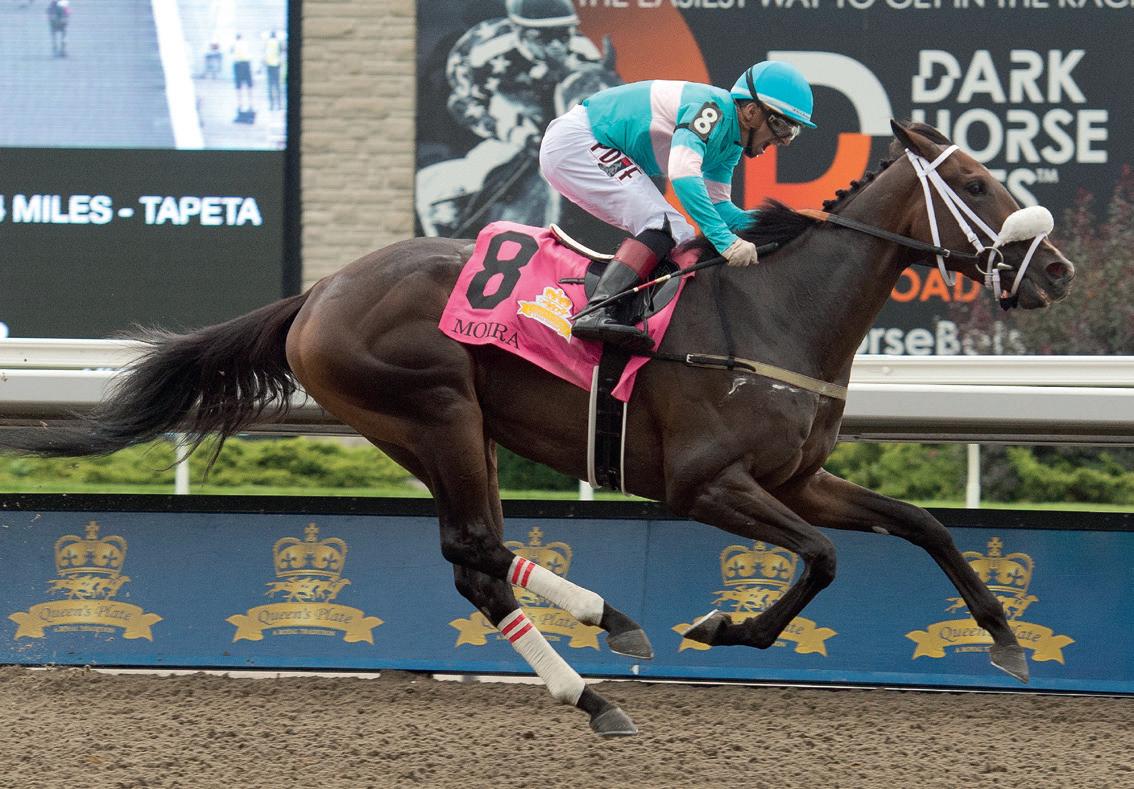
Canadian S. Presented by the Japan Racing Association – Grade 2 | Princess Elizabeth Stakes Queen’s Plate Stakes | Stella Artois Fury Stakes | Woodbine Oaks Presented by Budweiser
BIOGRAPHY
Named for a popular character on the hit TV show Schitt’s Creek, Ontario-bred Moira made quite a statement first time out in her career. The daughter of Ghostzapper won the $250,000 Princess Elizabeth Stakes, the most important race for Canadian-bred two-year old fillies, with an impressive last-to-first rush to score by 4 1/4 lengths.
Moira, who is said to share some of the eccentric, dramatic characteristics of her namesake, was one of the first horses to race for the newly formed partnership of X-Men Racing, and American owners Madaket Stable of Sol Kumin and SF Bloodstock, managed by Tom Ryan. Montreal native Donato Lanni, a noted bloodstock agent based in Kentucky, purchased Moira from the consignment of Frank Stronach’s Adena Springs for $150,000 at the Keeneland Association September Yearling Sale in 2020. Lanni, who founded X-Men, sent the partnership horses to Woodbine trainer Kevin Attard, who had Moira well prepared for that big debut victory. Moira raced just once more as a juvenile when second by half a length to that year’s eventual Champion Two-year Old Female, Mrs. Barbara.
Moira wintered in Florida and made just a single start before the 2022 Woodbine Oaks, winning the sevenfurlong Fury Stakes by a head with Rafael Hernandez riding. Moira was bet down to even money for the $500,000 Oaks, but the filly’s habit of becoming antsy during saddling reached new heights that day – as she was dancing around, Moira managed to step on her hind shoes, damaging them. The track blacksmith attempted to fix the shoes, but ultimately, Attard elected to run Moira in the Oaks without hind shoes. She didn’t need them. Moira powered to a 10 3/4 length victory.
A month later, Moira romped in the Queen’s Plate by seven lengths in track record time of 2:01.48 for 1 1/4 miles, becoming just the eighth filly to win the Oaks-Plate double. She was rested for two months before contesting the Grade 1 E. P. Taylor Stakes on the grass against older mares and she put in a spectacular, albeit troubled, performance. Moira and Hernandez extracted themselves from traffic, and made a furious run to be second by a neck to American invader Rougir. Unfortunately, the pair caused interference on their way and were disqualified and placed eighth. Moira ended her sophomore season with a solid fifthplace finish at Keeneland in the Grade 1 Breeders’ Cup Fully & Mare Turf, en route to being voted Canada’s Horse of the Year and Champion Three-year Old Filly at the 2022 Sovereign Awards.
Moira’s four-year old campaign was a bit delayed, but she began the year with three consecutive runner-up finishes in graded stakes races, including the Grade 2 Dance Smartly Stakes on the turf. That set her up to run the race of her career on September 9 when she took the Grade 2 Canadian Stakes in 1:46 for ‘about’ 1 1/8 miles, earning a 101 Beyer Speed Figure in the process. Contesting the Grade 1 E. P. Taylor Stakes again, a slow pace worked against her and she ended up third behind arch-rival Fev Rover (IRE). But when those two met again in the $2 million, Grade 1 Breeders’ Cup Filly & Mare Turf at Santa Anita in November, Moira finished ahead of her rival as she charged to a thrilling third-place finish, just 1 1/4 lengths behind top European fillies Inspiral and Warm Heart, earning a career top 103 Beyer Figure.
Two days after the Breeders’ Cup, Moira went through the Fasig-Tipton Kentucky Fall Mixed Sale, but was bought back by her owners for a whopping $3 million. Racing fans are looking forward to seeing more of her in 2024.
OWNER
Sam-Son Farm
BREEDER
Jack Hood Farms
PEDIGREE
1974 b. m.
Nodouble – Classy Quillo, by Outing Class
Starts 1st 2nd 3rd Earnings
29 3 5 9 $37,543
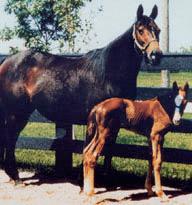
Just how good was No Class as a broodmare?
“You could breed No Class to the teaser and get a runner,” once quipped trainer Malcolm Pierce, who was the assistant trainer to Sam-Son Farm’s Jim Day at the time. Pierce might have been correct about the Sam-Son foundation mare, whose offspring collected unparalleled earnings of over $6 million.
Racing in Sam-Son’s iconic red-and-gold silks, four of No Class’s progeny – Sky Classic, Regal Classic, Grey Classic, and Classy ‘n Smart – won Sovereign Awards.
Sky Classic, who won $3.2 million, was also the Eclipse Award Champion Grass Horse in 1992 after winning six of his nine starts, including the prestigious Rothmans International in course record time – one of three track records he broke.
Sky Classic’s Sovereign Awards came in 1991 (Champion Grass Horse and Champion Older Horse), and 1989 (Champion Two-year Old Colt.) In total, Sky Classic won nine graded stakes and his lifetime earnings were a record, at the time, for a Canadian-bred. As a stallion, Sky Classic sired six champions, 10 Grade 1 winners, and 59 stakes winners.
Regal Classic was Canada’s Champion Two-year Old Colt in 1987 when he won the Summer Stakes, the Grey Stakes, and the nation’s top two juvenile races – the Cup and Saucer on turf and the Coronation Futurity on dirt. He also finished second in the Grade 1 Breeders’ Cup Juvenile and third in the Grade 1 Hollywood Futurity.
As a three-year old, he won three stakes – the Marine, the Plate Trial and the Prince of Wales and finished second in the Queen’s Plate. He raced at four and compiled a career total of eight wins and eight seconds in 27 starts for earnings of $1,456,584.
Grey Classic was Canada’s Champion Two-year Old of 1985. Like Regal Classic, Grey Classic won the Summer stakes, the Cup and Saucer and the Coronation Futurity. At age five, he won the Connaught Cup Stakes and, in his final start, the Grade 3 Laurel Turf Cup Handicap for seven career wins and earnings of $602,039.
Then there was Classy ‘n Smart, the second foal of No Class. She raced only as a three-year old and was named Canada’s Champion of her division in 1984 when she won four stakes – the Fury, the Bison City, the Ontario Colleen and the Canadian Oaks.
While she had a very solid racing career, Classy ‘n Smart is best known as a renowned broodmare who produced two truly outstanding progeny – the magnificent Dance Smartly and the accomplished Grade 1 winner and eminent sire, Smart Strike.
Classy ‘n Smart was honoured with the Sovereign Award for Outstanding Broodmare in 1991.
The story doesn’t end there.
No Class was also the dam of Classic Reign, a stakes winner of $327,645, Always A Classic, winner of three stakes including the Grade 1 Early Times Turf Classic, and the unraced Classic Slew, the dam of Grade 2 placed Surging River.
Altogether, No Class is the dam of eight foals – seven to race and all winners. In 1985, No Class was named Canada’s Champion Broodmare. A true rarity – a Champion Broodmare who produced a Champion Broodmare.
Bred in Ontario by Jack Hood Farms, No Class was purchased by Sam-Son Farm’s Ernie Samuel at the 1975 Woodbine Yearling Sale for $25,000. No Class, who had three wins herself, died at age nineteen in 1993. She was one of 24 broodmares profiled in Edward Bowen’s Matriarchs: Great Mares of the 20th Century (Eclipse Press, 1999, 2000).
OWNER
Syl Asadoorian and Sam Cosentino; Peter Brant BREEDER
E. P. Taylor
PEDIGREE
1974 b. m.
Northern Dancer – South Ocean, by New Providence CAREER RECORD
Starts 1st 2nd 3rd Earnings
33 13 11 3 $ 404,914
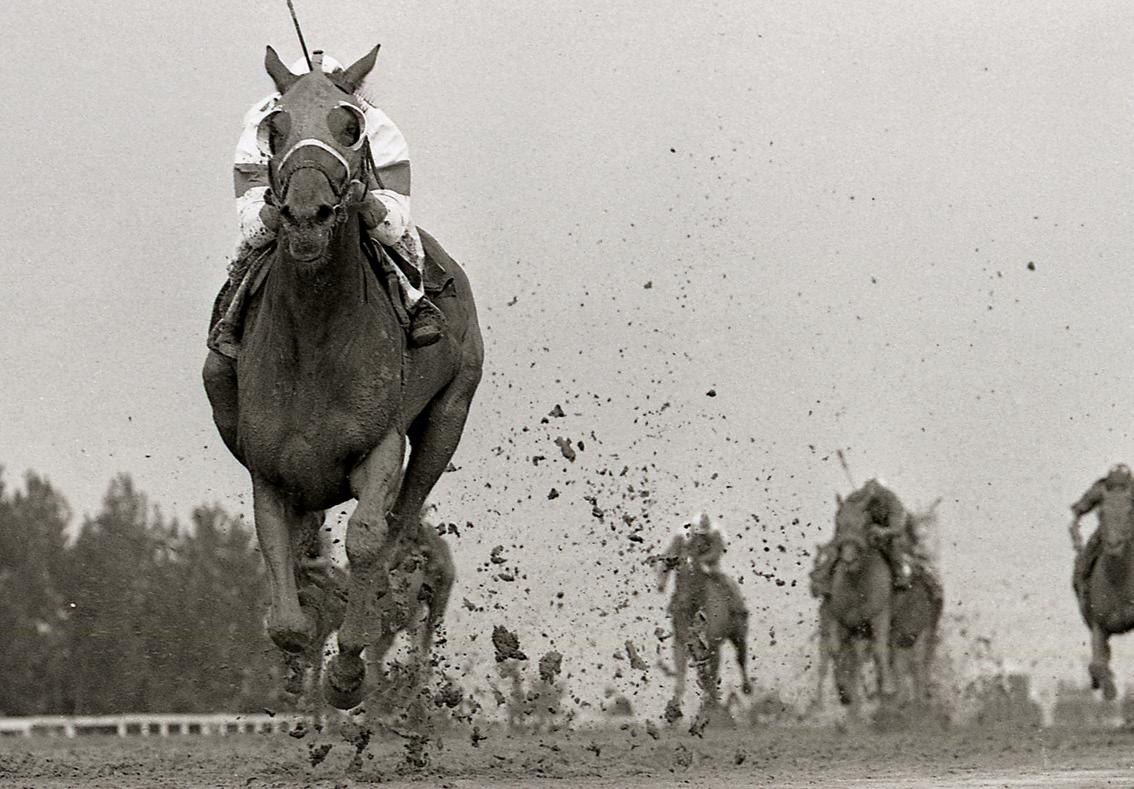
Top Flight Handicap – Grade 1 | Apple Blossom Handicap – Grade 2 | Chrysanthemum Handicap – Grade 3 Canadian Oaks | Fury Stakes | Mazarine Stakes | Selene Stakes
Northernette, bred by E. P. Taylor, was the epitome of Canadian homegrown excellence.
The story of how the future champion bay came to owner Syl Asadoorian is a story in itself.
Asadoorian had initially bought a Dr. Fager colt from Windfields at the 1975 Canadian Thoroughbred Horse Society Sale, but Taylor took the horse back and refunded the purchase after it was discovered the colt had a chronic digestive disorder.
With the money returned, Asadoorian used the funds to purchase a striking filly for $50,000 at the Saratoga Yearling Sales.
And thus begins the tale of future champion Northernette, a daughter of the iconic Northern Dancer and South Ocean, winner of the 1970 Canadian Oaks and a Canadian Horse Racing Hall of Fame inductee in 1987.
Trained by Hall of Famer Jerry Meyer, she didn’t find her best stride until the autumn of her 10-start two-year old campaign when she won the Mazarine Stakes, preceded by a second in the Princess Elizabeth Stakes and an allowance victory. For her efforts, she earned a Sovereign Award as the champion of her division.
In 1977, at age three, Northernette, won the Star Shoot Stakes in her second start of the season, then took all the spoils in the Selene Stakes, winning the race in track-record time. Two weeks after that victory, she humbled her foes to the tune of an 11-length triumph in the Canadian Oaks, the country’s pre-eminent race for Canadian foaled three-year old fillies.
Only seven days later, over a sloppy main track, she was collared late by Sound Reason in the Queen’s Plate, finishing a valiant half-length back of the winner.
Northernette followed with runner-up performances in the Bison City Stakes at Woodbine and the Grade 3 Test Stakes at Saratoga. Traffic woes in the midst of a strong late surge saw her finish fifth in Saratoga’s Grade 1 Alabama Stakes.
Asadoorian and his partner, Sam Cosentino, then made the decision to sell a controlling interest in Northernette to U. S. businessman Peter Brant, who sent her on to trainer Frank Whitely in New York.
Competing for new connections yielded familiar results.
Northernette took the Grade 3 Chrysanthemum Handicap at Laurel and lost the Grade 2 Firenze Handicap at Aqueduct by a nose. Once again, she earned a Sovereign Award, being named Canada’s Champion Three-year Old Filly.
At four, Northernette won the Grade 2 Apple Blossom at Oaklawn Park and then scored in the Grade 1 Top Flight Handicap at Aqueduct. In her penultimate race, the Grade 1 Spinster Stakes at Keeneland, she was a determined second in a race that saw her concede four pounds to eventual three-year old filly champion Tempest Queen.
The impact of Northernette, a full sister to 1980 English and Irish Champion Two-year Old Male Storm Bird, doesn’t end there.
She would produce 15 named foals, of which 12 started and seven won. Her notable offspring include two sired by Mr. Prospector: Gold Crest, who won the 1984 Grade 2 Panasonic Beresford Stakes, and Scoot, the 1986 Grade 1 Flower Bowl Handicap winner. Northernette was named a reine-de-course by respected pedigree analyst Ellen Parker.
Undoubtedly, Northernette is one of the most accomplished Canadian-bred race fillies ever raised in this country.
OWNER
Stafford Farms
BREEDER
Stafford Farms
PEDIGREE
1975 ch. h. Nodouble – Overstate, by Speak John
Starts 1st 2nd 3rd Earnings
42 24 5 4 $791,634
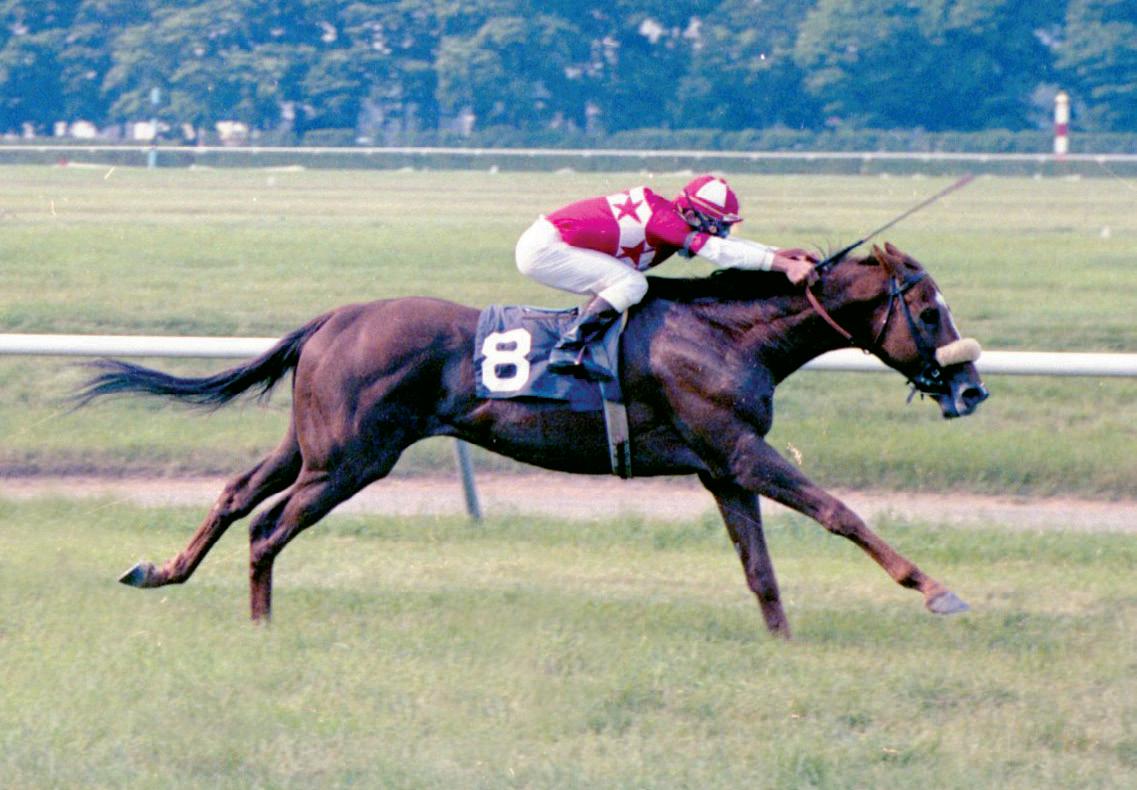
Bowling Green Handicap – Grade 2 | Stars and Stripes Handicap – Grade 2 Bernard Baruch Handicap – Grade 3 | Achievement Handicap | Breeders’ Stakes | Canadian Maturity
Carlsberg Invitational Handicap | Coronation Futurity | Eclipse Handicap | International Handicap Jacques Cartier Stakes (twice) | Jockey Club Cup Handicap | Laurance Armour Handicap Manitoba Derby | Plate Trial Stakes | Prince of Wales Stakes | Ultimus Stakes
Well-travelled Overskate, who was nicknamed the King City Traveller because of all the Air Miles he racked up while running at nine different tracks, was indeed majestically sublime. Every year he raced – from 1977 to 1980 – he won at least one Sovereign Award – the only horse to manage that most unlikely feat over such a long career.
Accumulating an unprecedented nine Sovereign Awards in total, Overskate was named Canada’s Horse of the Year in both 1978 and 1979, one of only four horses to achieve that honour since 1951. He was also Champion Grass Horse three times, Champion Older Horse twice, Champion Twoyear Old Colt, and Champion Three-year Old Colt.
Often conceding ten to fifteen pounds to his rivals, when Overskate retired at age five he replaced legendary Nijinsky II as the richest Canadian-bred thoroughbred for owner and breeder Jack Stafford, trainer Gil Rowntree, and jockey Robin Platts. Gritty and tough, 18 of his triumphs came in stakes races.
Not needing to pack a track with him for success, Overskate won 13 times at Woodbine, three times at Greenwood, and twice at Fort Erie, emerging victorious just about everywhere he went. He easily won the 1979 running of the Grade 2 Bowling Green Handicap at Belmont Park in New York by four lengths, setting a turf track record for a mile and three-eighths – shredding the old record by a staggering 2 2/5ths seconds. He took the Grade 2 Stars and Stripes Handicap in 1979 and the Laurance Armour Handicap in 1980 (where he defeated fellow Canadian Hall of Famer Glorious Song) at Arlington Park in Chicago and the Grade 3 Bernard Baruch Handicap at Saratoga in 1979.
At one point in 1978, Overskate won seven races in a row, and came within a quickly diminishing neck of sweeping the Canadian Triple Crown that year. In the Queen’s Plate, he barely missed running down Regal Embrace, a huge horse nicknamed Moose, who looked even bigger running against his diminutive rival. Overskate then romped in both the Prince of Wales Stakes and the Breeders’ Stakes, clearly showing who the top three-year old was.
In addition to his then-course record at Belmont, he set a track record for eight-and-a-half furlongs at Woodbine, and his 13 1/2 length victory in the mile and an eighth Manitoba Derby also established a track record.
A compact chestnut son of Nodouble out of Overstate, Overskate, who only weighed 950 pounds, also competed at Atlantic City, New Jersey; Ak-Sar-Ben, Nebraska, where he ran second in the Grade 2 Ak-sar-ben Cornhusker Handicap; Detroit; and Laurel Park, Maryland.
Short races, long races, dirt, turf, mud, slop, and fast tracks, Overskate knew only one thing: win.
“He was the best horse I ever trained,” said Rowntree, high praise for a trainer who won over 1,000 races. “A genuine racehorse; sound, and like a machine.”
Amongst his stakes winners as a sire, once he retired to the breeding shed, was Grade 1-winning millionaire, Capades.
Overskate was inducted into the Canadian Horse Racing Hall of Fame in 1993.
OWNER
Kinghaven Farms BREEDER
Kinghaven Farms Limited PEDIGREE
1978 ch. m.
Buckpasser – Cool Mood, by Northern Dancer
CAREER RECORD
Starts 1st 2nd 3rd Earnings 9 3 1 1 $45,361
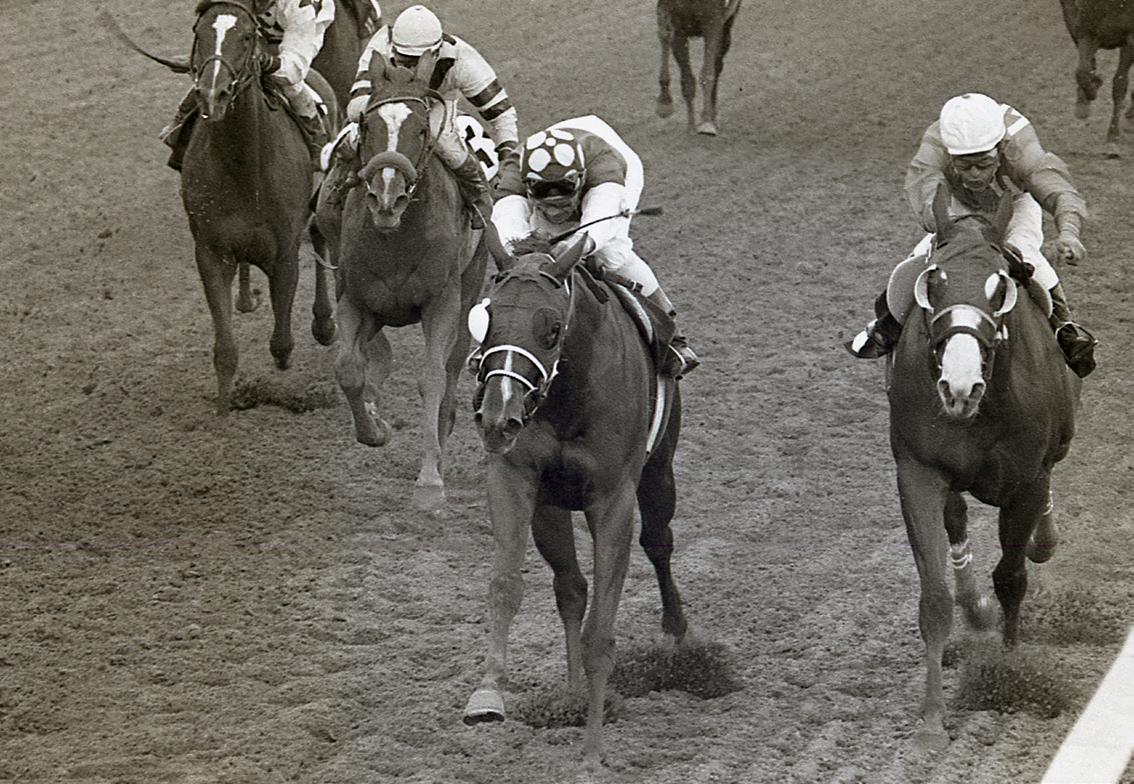
MAJOR WINS
Shady Well Stakes
BIOGRAPHY
Donald ‘Bud’ Willmot was only a few years into breeding and racing thoroughbreds from his Kinghaven Farms in King, Ontario, when Passing Mood was foaled in March 1978. The seventh foal from Willmot’s treasured mare Cool Mood, his first stakes winner who won the prestigious Canadian Oaks in 1969, Passing Mood was an elegant chestnut filly sired by the brilliant American racehorse Buckpasser.
To that point, Cool Mood’s offspring had not shown much, with only the plucky claiming horse Ivy Bay becoming a multiple winner. But Passing Mood, who was trained by John Tammaro, Jr., showed talent very early in her training in 1980, so early that she made her first career start in April of her juvenile season at Gulfstream Park in Florida. She was an impressive winner.
Passing Mood finished second to another highly regarded Kinghaven filly, Bude, in the My Dear Stakes after finishing third in an allowance race. She then faced allowance company again and emerged victorious before winning the Shady Well Stakes over stablemate No. One Bundles. While Passing Mood did not make a successful transition to her three-year old racing season, finishing well off the board in what would be her final four career starts, her legacy was just getting started.
It was apparent from the arrival of Passing Mood’s first foal, a flashy and handsome colt by Roberto, that she had the potential to produce a great racehorse. That first foal, Launch Key, was third in the Grade 3 Summer Stakes and the Cup and Saucer Stakes as a juvenile. But for his quirky manner, he might have gone on to be a major stakes winner. Passing Mood was bred to the great Secretariat and produced Woodstock Stakes winner, Sweeping Change and then, in 1986, produced a sleek grey colt by Group 1 winner and leading Kentucky sire, Caro (IRE).
Named With Approval, the colt was trained by Roger Attfield for Kinghaven and was always held in high regard. With Approval won his career debut in May 1988 and the Display Stakes in the fall. As a three-year old, he won the Marine Stakes and Plate Trial Stakes before winning a thrilling edition of the Queen’s Plate by a nose. The colt came back to win the Prince of Wales Stakes at Fort Erie and went into the 1 1/2 mile Breeders’ Stakes on turf with a chance to become the first Canadian Triple Crown winner since Canebora swept the series.
Under regular rider Don Seymour, With Approval walloped his rivals in the Breeders’, proving that grass was going to be his favourite surface. With Approval continued his illustrious career, winning the Grade 2 Bowling Green Stakes at Belmont Park in world record time for 1 3/8 miles on turf and later made his final start in the Grade 1 Breeders’ Cup Turf at Belmont, finishing second. With Approval went on to become a successful stallion.
Passing Mood was sold by Kinghaven at its dispersal and her next two foals, Bar U Mood, and Daijin, were both stakes winners and stakes producers. Daijin produced champion Serenading and was granddam of nine stakes winners.
Passing Mood put an exclamation point on her broodmare career with her last foal, Frank Stronach’s Touch Gold, who won the Grade 1 Belmont Stakes in 1997, dashing the Triple Crown dream for Silver Charm.
Passing Mood was awarded the Sovereign Award as Outstanding Broodmare of 1989. Her bloodlines are still very visible in horses competing in major stakes races today.
OWNER
Earle Mack
BREEDER
Barry Schwartz
PEDIGREE
1990 ch. h.
Affirmed – Vive, by Nureyev
Starts 1st 2nd 3rd Earnings 11 7 2 1
$1,287,866
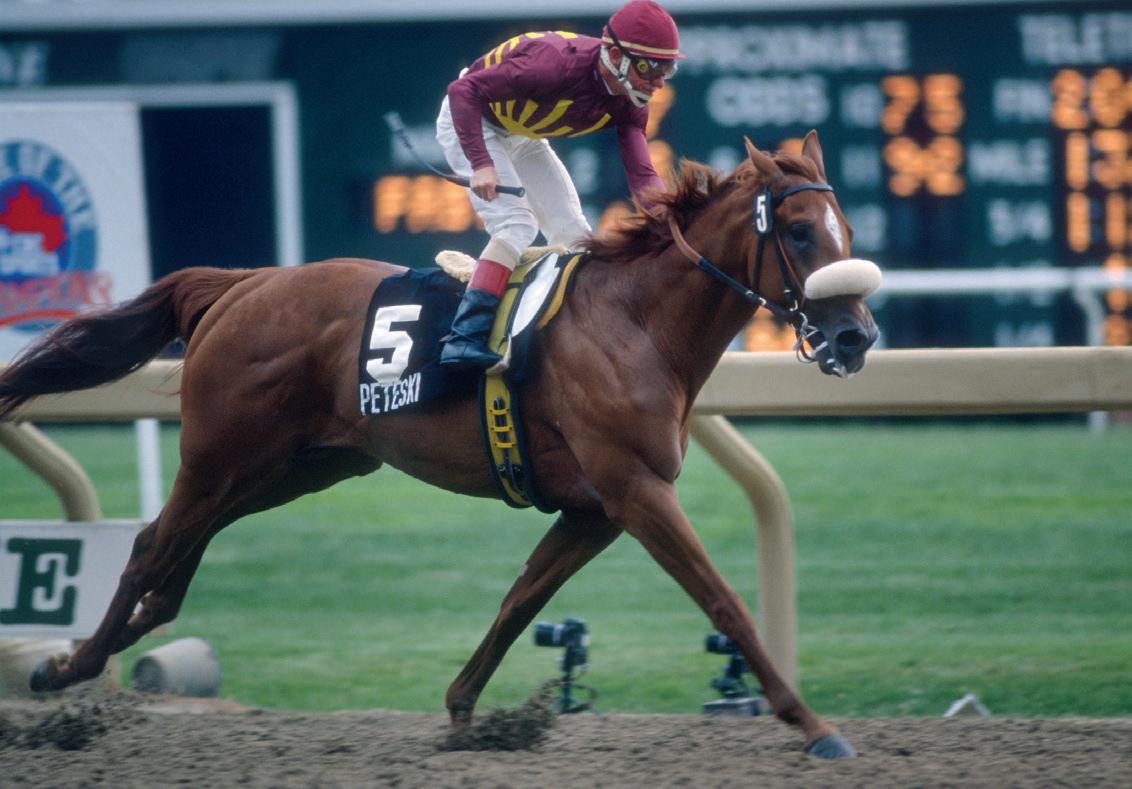
Molson Export Million Stakes – Grade 2 | Breeders’ Stakes |
BIOGRAPHY
In a five-year span, beginning in 1989, Canadian horse racing fans witnessed a remarkable four Canadian Triple Crown winners, three of them trained by master horseman Roger Attfield.
In 1993, Peteski burst onto the scene to add his name to the history books, two years after three consecutive Triple Crowns were won by With Approval, Izvestia, and Dance Smartly.
Bred by Barry Schwartz of Montreal, Quebec, Peteski was a robust, handsome son of American Triple Crown winner Affirmed from a well-bred daughter of Nureyev. The colt did not debut until mid-November of his two-year old season. He flashed brief early speed in a 4 1/2 furlong dash at Greenwood before fading to fifth. Still, he attracted the interest of American businessman and philanthropist, Honourable Earle I. Mack, a fan of Affirmed as a racehorse and stallion. Mack bought the colt from Schwartz for $150,000 (U. S.) and sent him to Attfield who was preparing his horses for 1993 in Florida. Peteski finished second in a maiden race at Keeneland in April before a dominant, 10-length victory at Woodbine just 11 days later.
That maiden win by Peteski was the start of a stunning streak of races in which the powerful colt came within half a length of winning nine straight. He won two allowance races with Don Seymour riding before American rider Craig Perret was brought in to ride the colt for the Canadian classics.
Peteski was narrowly beaten by Circulating in the Plate Trial Stakes, but came back to post a resounding six-length romp in the Queen’s Plate. Post-race comments by Perret, who suggested he was just giving Peteski a test-run in the Trial and probably could have won that race, got the rider in trouble with the Ontario Racing Commission, who
|
suspended him for 15 days. Mack and Attfield had to call an audible for the Prince of Wales Stakes and hired Dave Penna to ride him in the second jewel of the Triple Crown, which Peteski won by four lengths. Reunited with Perret for the 1 1/2 mile Breeders’ Stakes, his first ever start on grass, Peteski was bet down to 1 to 20 to sweep the Crown. There was drama early in the race as Perret’s saddle slipped up to Peteski’s neck with more than half of the long race to go. Still, the colt stayed straight and strong and romped by six lengths.
The Grade 2 Molson Export Million Stakes was next. The dirt race lured Kentucky Derby winner Sea Hero, Belmont Stakes winner Colonial Affair, and graded stakes winner Kissin Kris. The American colts proved no match for the brilliant Peteski, who won by 4 1/2 lengths.
The focus for Peteski then became the big, year-end championship, the Grade 1 Breeders’ Cup Classic at Santa Anita. Attfeld sent the colt to Louisiana Downs for the Grade 1 Super Derby as his final prep. Chasing a very fast pace early in the 1 1/4 mile race, Peteski led late, but was caught by Wallenda and Saintly Prospector, resulting in a three-horse photo. He lost by just a head.
Peteski would not get a chance to compete in the Breeders’ Cup as he suffered a wrenched ankle the morning of the race. He was retired from racing with seven wins from 11 races.
Peteski entered stud at Darby Dan Farm in Kentucky and later stood at Pin Oak Lane Farm in Pennsylvania. He sired 14 stakes winners but suffered a severe bout of colic at the age of 11 and was euthanized. The great Canadian colt is one of only a few horses buried in the Champion Cemetery at the Kentucky Horse Park.
OWNER
Entourage Stable BREEDER
John Carey PEDIGREE
2012 ch. g. Old Forester – Gladiator Queen, by Great Gladiator
CAREER RECORD
Starts 1st 2nd 3rd Earnings
38 29 3 2 $ 1,884,584

MAJOR WINS
Kennedy Road Stakes – Grade 2 (thrice) | Bold Venture Stakes – Grade 3 (twice) Jacques Cartier Stakes – Grade 3 (twice) | Vigil Stakes – Grade 3 (four times) | Achievement Stakes (twice)
Greenwood Stakes | Jacques Cartier Stakes (twice) | New Providence Stakes (twice) OLG Kenora S. Presented by HBPA of Ontario (twice) | OLG/OR Kenora S. Presented by HBPA of Ontario Ontario Jockey Club Stakes | Overskate Stakes | Shepperton Stakes (thrice)
BIOGRAPHY
Canadian Horse Racing Hall of Fame trainer Robert Tiller often refers to Pink Lloyd as a “rockstar,” a most appropriate plaudit for the chart-topping chestnut who holds status as one of the greatest Canadian sprinters of all time.
Born at John Carey’s T. C. Westmeath Stud in Shelburne, Ontario, little did anyone know that the wobbly youngster would ascend to the ranks of greatness.
Bought for only $30,000 at the 2013 Canadian Thoroughbred Horse Society (Ontario Division) Canadianbred Yearling Sale by Frank Di Giulio, Jr., the horse’s name is a nod to both iconic rock band Pink Floyd and the character Lloyd from the hit television series Entourage. Pink Lloyd would race for the aptly named Entourage Stable of Di Giulio, Ed Longo, John Peri, John Lucato, and Victor Mele.
It would not be an easy path to stardom. Under the tutelage of a patient Tiller, Pink Lloyd had to contend with minor, but persistent, physical issues that would delay his debut until the summer of his 4-year old year.
The delay would prove to be well worth the wait.
Pink Lloyd, who won his first three races, was partnered with future Hall of Fame jockey Eurico Rosa da Silva and the pair would go on to pack a formidable one-two punch.
In 2017, “Pinky” earned his first stakes crown in the Jacques Cartier at Woodbine. Undefeated that year, he added seven more stakes, two of them graded, while earning over $512,000. He was honoured as Canada’s Horse of the Year and brought home his first of five consecutive titles as Sovereign Award Champion Male Sprinter.
Pink Lloyd pushed his streak to 11 consecutive stakes wins in 2018, but some fractious moments at the gate
and other minor misfortunes resulted in five wins from eight engagements. If there were any questions as to if he was still a step ahead of the competition, Pink Lloyd had an emphatic answer in 2019, winning all six of his starts, highlighted by a stunning last-to-first score in the Grade 2 Kennedy Road Stakes.
In 2020, jockey Rafael Hernandez took the reins following the retirement of Rosa da Silva. The duo began their new partnership with a triumph in the Jacques Cartier, a record fourth victory in that stakes race for Pink Lloyd. Later that year, he was saddled with 128 pounds and won the Bold Venture Stakes. Toting 128 pounds again in the Grade 3 Vigil Stakes in September, the extra weight did nothing to hinder his performance. His winning time was just one hundredth of a second off his own track record for six furlongs (established in 2018) when he took the Jacques Cartier in a blistering 1:08.06. It was his fourth Vigil Stakes victory.
His curtain-call campaign would come in 2021 when, at the age of 9, he once again put on a show for his legion of fans. His final race saw him emerge from tight quarters to soar down the lane and win the Grade 2 Kennedy Road Stakes, his head-turning 26th stakes victory.
In all, Pink Lloyd won 29 of 38 starts, earned over $1.8 million and is the second most decorated horse in Sovereign Awards history with eight trophies over his six splendid racing seasons.
Pink Lloyd was retired to LongRun Thoroughbred Retirement Society’s farm in Hillsburgh, Ontario, where he is an ambassador for the organization and remains, without doubt, a crowd-pleasing rockstar.
OWNER
Kinghaven Farms
BREEDER
Kinghaven Farms Limited
PEDIGREE
1983 dk. b./br. g. King of Spain (GB) – Whisper, by Laugh Aloud
CAREER RECORD
Starts 1st 2nd 3rd Earnings
29 15 5 2
$942,243

Nearctic Handicap – Grade 3 (twice) | Suffolk Downs Sprint Handicap – Grade 3 Toboggan Handicap – Grade 3 | Highlander Handicap | Jacques Cartier Stakes | Toronto Budweiser Breeders’ Cup Handicap | Toronto Budweiser Breeders’ Cup Stakes | Vigil Handicap
The story of Horse of the Year and four-time Sovereign Award winner Play the King is one fit for film. From a lazy, seemingly slow, young horse who even flopped lessons as a show jumper, Play the King, owned and bred by ‘Bud’ and David Willmot’s Kinghaven Farms and trained by Roger Attfield, would eventually become one of Canada’s greatest sprinters.
In 1982, David Willmot purchased a few mares from a sale in England. One of them was Whisper, who produced a plain dark bay by the Group-winning English stallion King of Spain at Kinghaven’s broodmare farm in King, Ontario in March of 1983. Named Play the King, the stout fellow never raced as a two-year old. It wasn’t until he was three when he suddenly began to outwork a number of the top horses in the Attfield and Kinghaven barn.
When he won his career debut in October of 1986, the Willmots knew they had a good one.
In March of his four-year old season, Play the King won the Grade 3 Toboggan Handicap at Aqueduct. After running third there in the Grade 2 Bold Ruler Stakes, he returned to Canada to win the Jacques Cartier Stakes at Greenwood and the Vigil Stakes at Woodbine. Two more efforts south of the border were followed by a victory in the Toronto Budweiser Breeders’ Cup Handicap and Highlander Handicap at Woodbine, where Play the King displayed his speed and grit. He ventured south again for a win in the Grade 3 Suffolk Downs Sprint Handicap in Boston and arrived back in Canada to win the Grade 3 Nearctic Handicap at Woodbine.
Play the King was headed to the Grade 1 Breeders’ Cup Sprint at Hollywood Park before he suffered a hind leg injury and was sidelined for nine months. He was named the 1987 Champion Older Horse and Champion Sprinter in Canada at the Sovereign Awards with seven wins from
13 starts and earnings of almost $500,000 that season.
As a five-year old, Play the King once again dominated the Canadian sprint scene, winning second editions of the Toronto Budweiser Breeders’ Cup Stakes and Grade 3 Nearctic Handicap.
One of the crowning moments of Play the King’s career came in his final start of 1988 when he faced the best sprinters in the world in the Grade 1 Breeders’ Cup Sprint over a greasy, muddy track at Churchill Downs. Breaking from post 11 in the 13-horse field, Play the King, at nearly 50 to 1 odds, came from mid-pack and joined 1987 Sprint winner Very Subtle for the lead in early stretch only to be passed late by Gulch, missing by three-quarters of a length.
It was a brilliant effort by the plucky gelding that had his Kinghaven connections and racing fans throughout Canada cheering loudly. At the completion of the 1988 racing season in Canada, Play the King was named the Canadian Horse of the Year at the Sovereign Awards as well as repeating as Champion Older Horse and Champion Sprinter.
Play the King would return as a six-year old early in 1989, finishing second in the Vigil Stakes at Woodbine in his third outing of the season. Sadly, the popular gelding would suffer a fatal injury on Preakness Stakes day at Pimlico in the Maryland Budweiser Breeders’ Cup Handicap.
To honour the remarkable sprinter, Woodbine Racetrack renamed the Toronto Budweiser Breeders’ Cup Stakes the Play the King Stakes, which was run as a Grade 2 event for sprinters on the grass until 2019.
Play the King won 15 of his 29 races and will long be remembered for the time of his reign as the King of Canadian sprinters.
OWNER
Sam-Son Farm
BREEDER
Sam-Son Farm
PEDIGREE
1995 b. g.
Affirmed – Quiet Cleo, by No Louder
CAREER RECORD
Starts 1st 2nd 3rd Earnings
31 10 6 4 $2,346,768
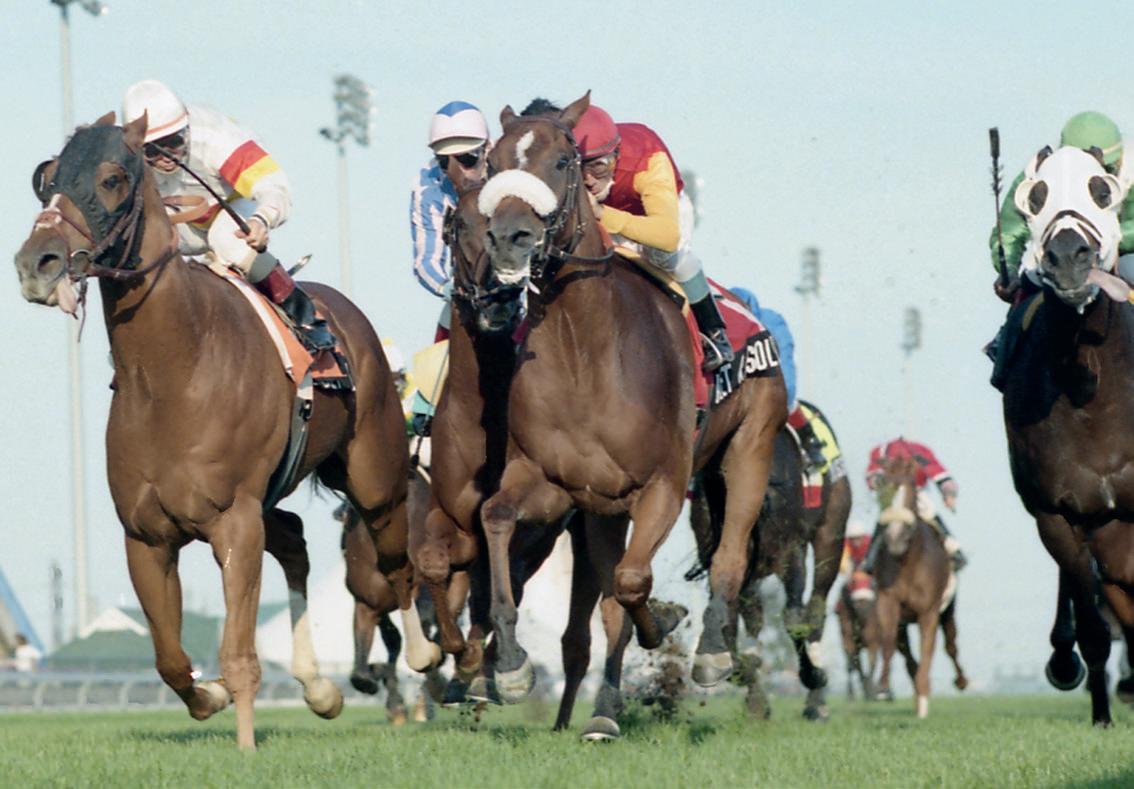
Atto Mile Stakes – Grade 1 | Dixie Stakes – Grade 2 | Hong Kong Jockey Club Trophy Stakes– Grade 2 King Edward Breeders’ Cup Handicap – Grade 2 | Connaught Cup Stakes – Grade 3
Quiet Resolve’s beginnings hardly foreshadowed the prowess he would show later.
Unraced as a two-year old in 1997 because of physical problems, the rather average-looking gelding incurred a cracked front pastern bone during a workout in his threeyear old campaign that sidelined him for over a year.
“He’s not a portrait but he’s got a lot of heart,” said Tammy Samuel-Balaz, daughter of Sam-Son Farms owner Ernie Samuel, before passing away far too early at the age of 47 in 2008.
Returning as a four-year old in 1999, Quiet Resolve began to show what lay ahead. He won two allowance races and then took the $1-million Grade 1 Atto Mile at Woodbine that September through a disqualification at odds of 44-1. He was unplaced in two further starts that year, including the Breeders’ Cup Mile at Gulfstream Park.
In 2000, the now five-year old Quiet Resolve really put it all together.
In his season debut, he won an allowance race at Keeneland by a neck, setting a new course record of 1:40.3 for the mile and a sixteenth on the turf. He followed that up with a nose victory in the Grade 2 Dixie Stakes at Pimlico.
Second in Woodbine’s Grade 2 King Edward Breeders’ Cup Handicap over his worst surface – soft turf – Quiet Resolve went back into the winner’s circle in his next start, taking the Grade 2 Hong Kong Jockey Club Trophy Stakes – also at Woodbine – by three-and-a-half lengths.
Third in both the Grade 2 Niagara Breeders’ Cup Handicap at Woodbine and the Grade 2 Shadwell Turf Mile Stakes at Keeneland, Quiet Resolve then probably ran the best race
of his illustrious career, in what ironically wasn’t a victory, in the November 4 $2.4 million Breeders’ Cup Turf at Churchill Downs.
Running against a field that many believed was the greatest group of turf specialists ever assembled, with the likes of Montjeu (IRE), Fantastic Light, Ciro, John’s Call, and Down the Aisle, Quiet Resolve stalked the early pace in third place before making a huge move in the upper stretch that carried him to the lead with just a furlong left to run.
Digging deep, Quiet Resolve just couldn’t hold off Irishbred Kalanisi – winner of the Group 1 Champion Stakes at Newmarket three weeks before. Kalanisi rallied from far back to catch Quiet Resolve, with the winning margin just half a length.
It was the second of three times Quiet Resolve represented Canada in a Breeders’ Cup race.
“The mile-and-a-half distance is at the very limits of his capabilities,” Quiet Resolve’s trainer Mark Frostad opined after the race. “But he’s a real scrapper and has a heart the size of the Northwest Territories.”
With three wins, two seconds and two thirds from seven starts in 2000, Quiet Resolve was voted Canada’s Horse of the Year as well as Champion Grass Horse.
As a six-year old, Quiet Resolve won the Grade 2 King Edward Breeders’ Cup Handicap.
At seven, he won the Grade 3 Connaught Cup Stakes and was twice stakes placed.
Quiet Resolve was inducted into the Canadian Horse Racing Hall of Fame in 2017.
OWNER
Doug Cameron & Ron Edgar; W S Farish III
BREEDER
Mrs. George T. Coker
PEDIGREE
1978 b. m.
Halo – Hanging Round, by Stage Door Johnny
CAREER RECORD
Starts 1st 2nd 3rd Earnings
30 7 7 0 $382,126
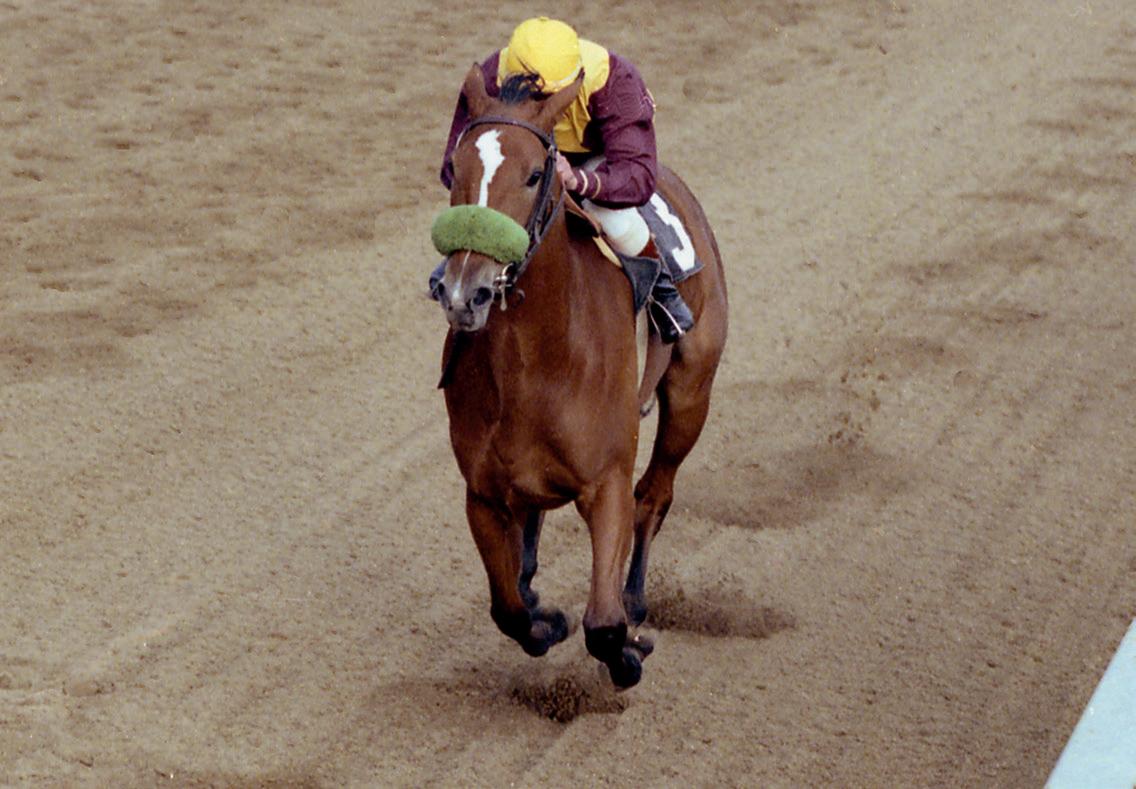
Demoiselle Stakes – Grade 2 | Bison City Stakes |
Wonder Where Stakes | Yearling Sales Stakes
BIOGRAPHY
Moments after Canada’s star three-year old filly of 1981, Rainbow Connection, finished a remarkable second to American colt Open Call through heavy rain in the Grade 1 Rothmans International Stakes, a bright rainbow appeared over Woodbine Racetrack. It was fitting; that heroic run by Rainbow Connection wrapped up championship honours for Ron Edgar and Doug Cameron’s fabulous filly at the year-end Sovereign Awards.
It was the second consecutive year that Rainbow Connection was voted a Canadian champion following a spectacular juvenile campaign that saw her ranked among the best fillies in North American in 1980.
Bred in Ontario by Mrs. George T. Coker, Rainbow Connection, a daughter of Windfields Farm’s top sire Halo, was purchased for $34,000 from the 1979 Canadian Thoroughbred Horse Society’s yearling sale. The precocious filly was sent to trainer Gerry Belanger and she won her maiden at Fort Erie racetrack in her second career start and then flew through easy wins in the Yearling Sales Stakes, Natalma Stakes, and Princess Elizabeth Stakes, which she won by 10 lengths. Sent south to tackle the top American fillies, Rainbow Connection was a strong second to eventual champion Heavenly Cause in the Grade 1 Selima Stakes at Laurel Park. Just two weeks later, she won a stretch battle with another eventual champion, De La Rose, to capture the Grade 2 Demoiselle Stakes at Aqueduct.
Expectations were high for Rainbow Connection’s threeyear old season, but plans to compete in the Canadian classics were scuttled when she contracted a virus. She didn’t start the 1981 season until that July, and, after finishing unplaced behind the brilliant Eternal Search in two stakes, turned the tables on that rival in the Bison City Stakes at Fort Erie. Following a fifth-place finish in the Grade 2 Gazelle at Belmont Park, Rainbow Connection
|
returned home to finish second to the year’s top colt, Frost King, in the Col. R. S. McLaughlin Stakes before defeating fellow fillies in the Wonder Where Stakes on turf.
Eight days later, Rainbow Connection took on the world in the Rothmans International; behind her in that stellar performance were major winners from Europe including favoured Argument, a multiple Group 1 winner, Glenorum, Dance Bid, and the 1980 Rothmans winner Great Neck. Rainbow Connection raced three more times in 1981 in some of the toughest turf marathon stakes in the U. S., finishing unplaced.
In 1982, the brawny filly began her campaign in California, finishing second in the San Gorgonio Handicap and the prestigious Grade 1 La Canada Stakes, both at Santa Anita. She would tackle not only the toughest distaffers in the U. S. throughout most of that four-year old season, but also raced in the Grade 1 Charles H. Strub Stakes on dirt against top handicap males such as It’s the One. Rainbow Connection returned to Ontario in July of that year and finished second in the Canadian Maturity Stakes to Frost King.
Rainbow Connection was purchased by American breeder William S. Farish III in 1983 and was retired after two unplaced efforts. She proved to be just as successful in the breeding shed as she was on the racetrack, producing Colour Chart, winner of the Group 2 Prix de l’Opera before being purchased for $900,000 from the Warner Jones Dispersal at Keeneland by Ernie Samuel’s Sam-Son Farms while in foal to leading sire Lyphard. The resulting foal was three-time Sovereign Award-winner Rainbows for Life, a millionaire and later leading sire in the Czech Republic.
Altogether, Rainbow Connection produced eight winners and was the granddam of Eclipse Award 2001 Champion Twoyear Old Filly Tempera and Grade 1 winner White Heart (GB).
OWNER
Albert Coppola BREEDER
Gardiner Farms, Ltd. PEDIGREE
1979 gr. H. Blushing Groom (FR) – Yonnie girl, by Call the Witness
CAREER RECORD
Starts 1st 2nd 3rd Earnings 18 6 5 1 $347,537
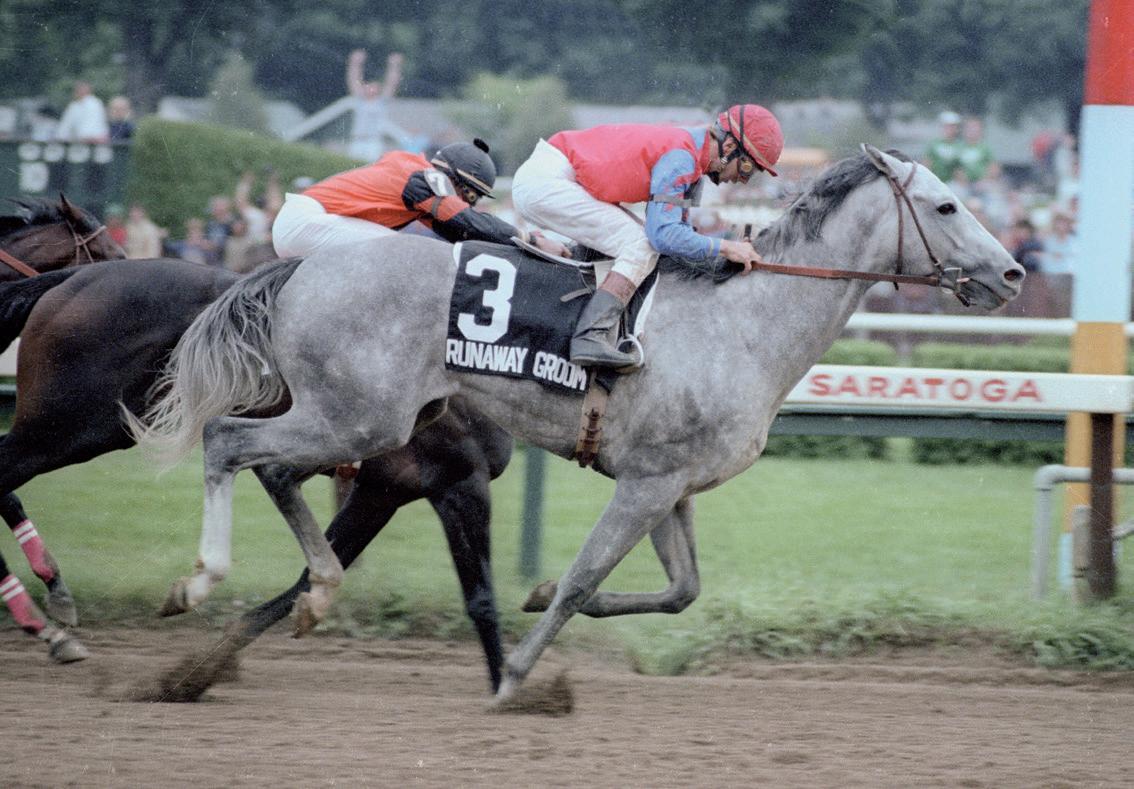
Travers Stakes – Grade 1 | Breeders’ Stakes |
BIOGRAPHY
The Travers, called the Mid Summer Derby, is one of North America’s biggest races on one of North America’s greatest stages. Contested at Saratoga it is also unofficially the fourth leg of the Triple Crown.
Under cloudy skies, only five horses lined up for the 1982 Grade 1 renewal. But it was still a great field, with all three winners of the Triple Crown races that season showing up: runaway Belmont Stakes winner Conquistador Cielo, who came in with seven straight triumphs, Kentucky Derby winner Gato Del Sol, and Preakness Stakes champion Aloma’s Ruler.
And then there was Runaway Groom, the grey Canadian horse bred by Gardiner Farms, owned by Albert Coppola, and trained by John DiMario. Runaway Groom was purchased by Coppola for just $39,000 at the 1980 Fasig Tipton Kentucky Selected Summer Yearlings sale. It was the lowest price paid for a Blushing Groom yearling all year. A French champion who won seven straight races from 1976 to 1977, Blushing Groom became a world class sire.
Unraced at two, Runaway Groom made his debut at Keeneland in April of 1982, winning a maiden special weight in his third try.
He went postward in the Travers as a 13-1 outsider, despite coming into the race off a second in the Queen’s Plate and Heresy Stakes at Woodbine and winning the Prince of Wales Stakes at Fort Erie.
The Travers unfolded as a two-horse race between Conquistador Cielo and Aloma’s Ruler, with those two traveling through swift early fractions and a mile in a very fast 1:35 4/5. Head and head they raced around the first turn, into the backstretch and still as a team around the final turn and down the stretch. Runaway Groom was last.
Aloma’s Ruler finally got past Conquistador Cielo, but by now Runaway Groom was flying down the center of the track, closing hard with every stride until he went by both to win by half a length. It was just the second time that a horse had defeated the Kentucky Derby, Preakness, and Belmont Stakes winners in the same race. The only other time was in the 1918 Travers.
“The race was made for a come-from-behind horse like mine,” Canadian jockey Jeff Fell said in the August 22, 1982, edition of The Courier-Journal of Louisville, Kentucky. “It really helped my horse. Speed against speed is tough for any horse going a mile and a quarter.
“At the top of the stretch, I knew I had a lot of horse under me. I saw the speed was coming back to me.”
Runaway Groom would also win his next start, the Breeders’ Stakes at Woodbine, to give him two-thirds of the Canadian Triple Crown. While he finished third in the Grade 3 San Diego Handicap and fourth in the Grade 2 Del Mar Invitational Handicap, Runaway Groom would lose his final eight races. But nothing could take away his Travers or his Sovereign Award as Canada’s Champion Three-year Old Colt of 1982.
Runaway Groom entered stud at Vinery in Lexington, Kentucky in 1984. He became a successful stallion, siring several Grade 1 stakes winners including Cherokee Run, the winner of five graded stakes, including the 1994 Breeders’ Cup Sprint. He also sired the multiple graded stakes-winning millionaires Down The Aisle and Wekiva Springs, and Grade 1 winner The Groom is Red. In total, Runaway Groom sired 70 individual stakes winners and the earners of over $48 million.
Runaway Groom was inducted into the Canadian Horse Racing Hall of Fame in 2001.
OWNER
Melnyk Racing Stables, Inc.
BREEDER
Eugene Melnyk
PEDIGREE
2004 dk. b./br. m.
Point Given – Boston Twist, by Boston Harbor
Starts 1st 2nd 3rd Earnings 18 7 4 3
$1,747,081
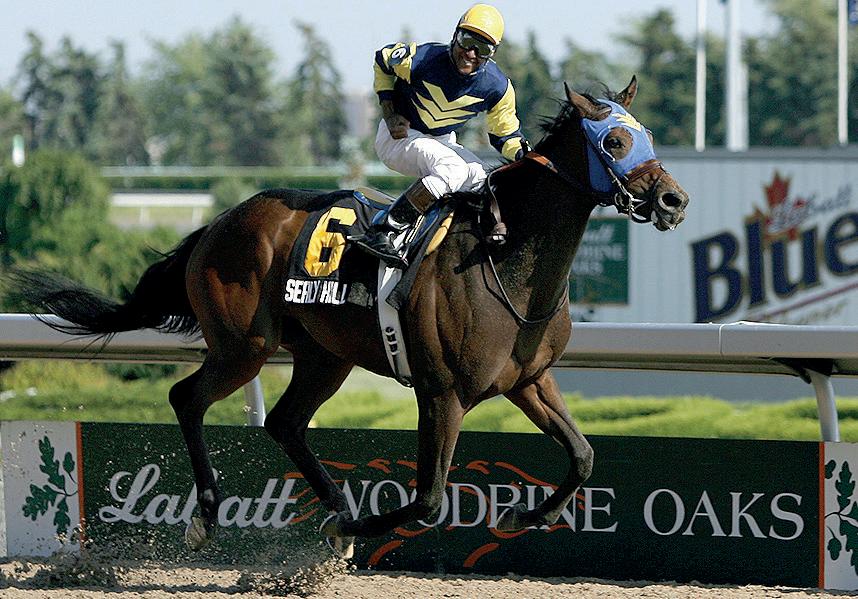
Bourbonette Oaks – Grade 3 | Bison City Stakes | Glorious Song Stakes | Labatt Woodbine Oaks Wonder Where Stakes
Sealy Hill, bred and owned by Eugene Melnyk, was a handful for more than just her rivals.
Named after a village in Barbados, the fierce filly would rise through the ranks to become a standout star for her connections, a group that included dual Hall of Fame trainer Mark Casse.
She did it all with a spirited attitude, and, although saddled with a reputation as a hard-to-handle sort who could get in her own way on occasion, there was no denying the Ontario-bred had top-shelf talent.
After a third in her debut in September 2006, the daughter of Point Given out of the Boston Harbor mare Boston Twist reeled off two wins, including the Glorious Song Stakes, to close out her two-year old campaign.
She started her sophomore season with a runner-up effort in a Gulfstream Park allowance, a win in the Grade 3 Bourbonette Oaks at Turfway Park, and a forgettable 12th in the Grade 1 Kentucky Oaks.
A return to Woodbine would be the winning tonic for the dark bay. She became the first filly to sweep the Canadian Triple Tiara at Woodbine Racetrack, winning the Woodbine Oaks, the Bison City Stakes, in which she was disqualified and placed third, and the Wonder Where Stakes. Her loss in the Bison City was eventually overturned by the Ontario Racing Commission, making her the country’s first Triple Tiara winner.
She came into her biggest test, the Grade 1 E. P. Taylor Stakes, with a runner-up result against older opponents in the Grade 2 Canadian Stakes. She looked to be a winner in the E. P. Taylor but was collared in the final yards by European rival Mrs. Lindsay.
The superfecta of Sealy Hill, trainer Mark Casse, jockey Patrick Husbands, and owner Eugene Melnyk all found themselves in the Sovereign Award spotlight for their respective 2007 campaigns, each winning individual awards. Sealy Hill garnered not only Champion Three-year Old Filly honours, but also those as Champion Female Turf Horse and Horse of the Year.
Her four-year old campaign was capped by a strong third-place finish in the Grade 1 E. P. Taylor Stakes and a magnificent 49-1 runner-up performance to Forever Together in the $2 million Breeders’ Cup Filly and Mare Turf at Santa Anita in what was her final lifetime start.
The night before she was sold for a sales-topping price tag of $590,000 at the Fasig-Tipton Kentucky February Mixed Sale 2013, Sealy Hill, part of Melnyk’s dispersal of broodmares, gave birth to a chestnut filly by Distorted Humor who would later be named True Elegance.
Though Grade 1 success may have eluded Sealy Hill on the racecourse, it did not elude her as a broodmare; her daughter Cambier Parc, a $1.25 million yearling, won two in a row in 2019. Sealy Hill is also the dam of graded stakes winners Belle Hill, Gale Force, and 2014 Sovereign Award Champion Female Sprinter, Hillaby.
In 2013, Sealy Hill was inducted into the Canadian Horse Racing Hall of Fame.
OWNER
Stronach Stables
BREEDER
Adena Springs PEDIGREE
2012 b. h. Ghostzapper – Getback Time, by Gilded Time
CAREER RECORD
Starts 1st 2nd 3rd Earnings 17 8 3 2 $3,859,311
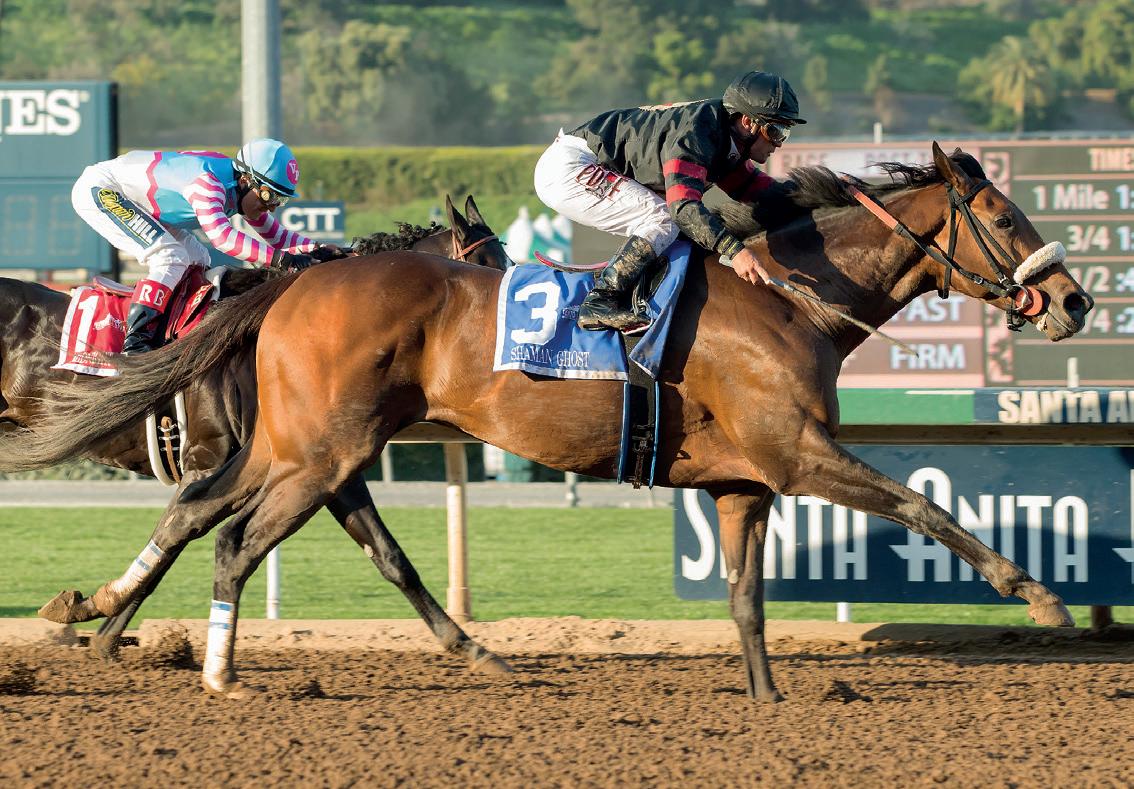
Santa Anita Handicap Presented by San Manuel Indian Bingo and Casino – Grade 1 Woodward Stakes – Grade 1 | Brooklyn Invitational Stakes – Grade 2 | Marine Stakes – Grade 3 Pimlico Special Handicap – Grade 3 | Queen’s Plate Stakes
Shaman Ghost’s racing career was, rather appropriately, scary good.
Bred and owned by Frank Stronach’s Adena Springs, the handsome bay was sired by 2004 Breeders’ Cup Classic victor and multiple graded stakes winner Ghostzapper. His grandsire was Awesome Again, an accomplished runner whose triumphs include the 1997 Queen’s Plate and a career-closing triumph in the 1998 Breeders’ Cup Classic.
His maternal side DNA was equally dynamic.
Getback Time, who won six races and was stakes-placed over a 16-race career, was by 1992 Breeders’ Cup Juvenile winner Gilded Time.
Shaman Ghost didn’t get out of the gates in winning fashion – Ghostzapper offspring tend to hit their best stride later –and went winless in two starts as a two-year old.
Breaking his maiden in his fourth start, the milestone moment came at Gulfstream Park on March 4, 2015.
It was a harbinger of what was to come in that three-year old campaign.
He took the Marine Stakes, a key prep on the road to the Queen’s Plate, a race he would win on July 5, 2015, and finished second in the Prince of Wales. An ankle injury would then send him to the sidelines for the rest of the season.
His efforts did not go unnoticed when the 2015 Sovereign Award recipients were announced at The Jockey Club of Canada’s annual gala. Shaman Ghost was named Champion Three-year Old Male, outpointing his closest finalist by 96 points, while also finishing third in voting for Canadian Horse of the Year honours.
Jimmy Jerkens, who took over the training reins, gave his new charge time to recover from ankle surgery, and guided Shaman Ghost through a remarkable 2016 campaign which yielded victories in the Grade 1 Woodward at Saratoga, Grade 2 Brooklyn Invitational at Belmont and a third in the Grade 1 Clark Handicap at Churchill Downs.
A fever forced Jerkens to scratch his ultra-consistent star out of the Breeders’ Cup Classic that year.
In 2017, he won the Grade 1 Santa Anita Handicap and the Grade 3 Pimlico Special. He also finished second to multiple graded stakes champion Arrogate in the world’s richest race, the $12 million Grade 1 Pegasus World Cup held at Gulfstream Park, a result that delivered $1.75 million for his connections.
His final race saw him finish second to Keen Ice in the Grade 2 Suburban Handicap at Belmont on July 8, 2017. At the end of his five-year old season, Shaman Ghost’s career earnings reached more than $3.8 million, a total for Canadian-breds only exceeded by his grandsire, Awesome Again.
Shaman Ghost was retired for the 2018 breeding season and stood in California and Kentucky before coming to Canada. In 2022, he was the country’s No. 1 second crop sire by progeny earnings and black type performers and winners.
OWNER
Sam-Son Farm; Marie D. Jones
BREEDER
Ferme Du Bois-Vert
PEDIGREE
1993 ch. m.
Storm Cat – Silken Doll, by Chieftain
CAREER RECORD
Starts 1st 2nd 3rd Earnings
4 3 0 1 $102,120
Mazarine Stakes
BIOGRAPHY
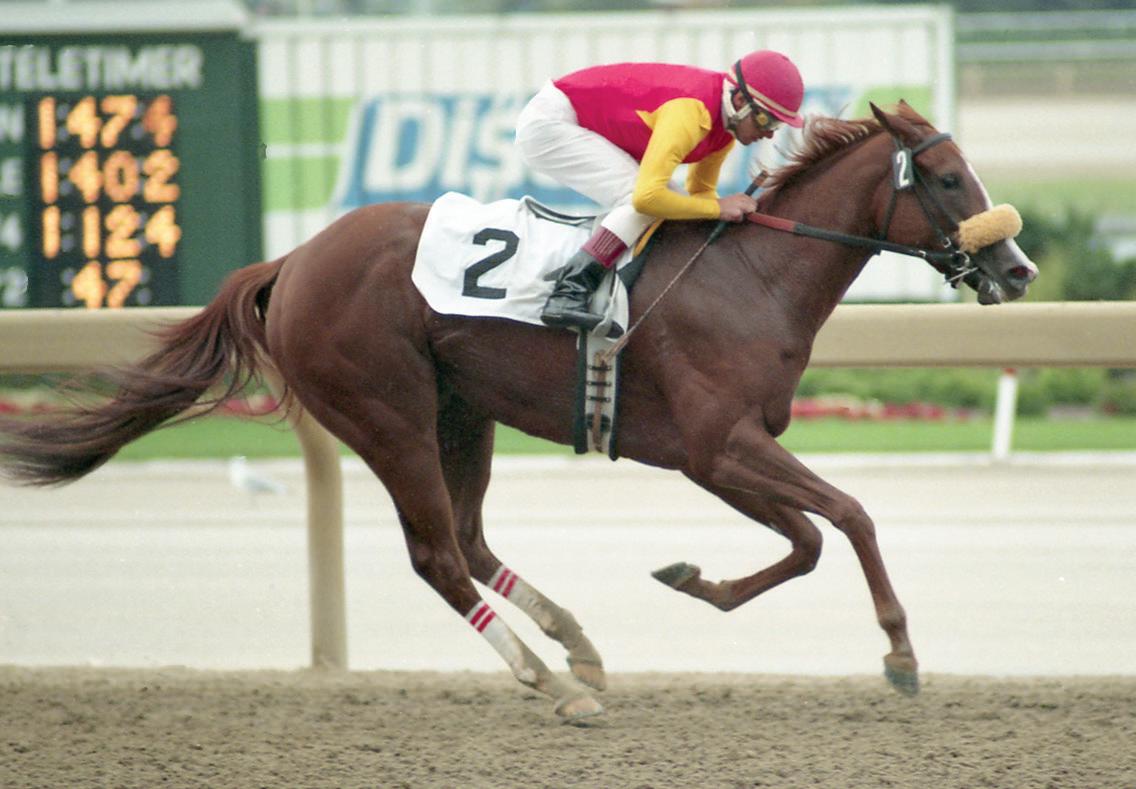
Born on a small farm along the shores of the St. Lawrence River in the Quebec town of Neuville, Silken Cat was a brilliant racehorse and broodmare. From the third crop of a young Kentucky stallion named Storm Cat – soon to be one of the most sought-after stallions in the world – Silken Cat was bred by Pierre Boisvert and family’s Ferme Du BoisVert. The Boisverts, with the help of bloodstock expert and fellow breeder Dr. Jacques Levasseur, had purchased the mare Silken Doll for $28,000 (U. S.) carrying the filly.
Silken Cat sold at the 1994 Fasig-Tiption Saratoga Yearling Sale for $95,000 to the famed Sam-Son Farm, making her the highest priced Quebec-bred auction yearling.
It was quickly apparent to Sam-Son’s trainer Mark Frostad that Silken Cat was a very talented filly. In fact, when she made her career debut at Woodbine on August 12, 1995, she was bet down as the favourite in an 11-filly field. In one of the most impressive debuts by any Canadian foaled and raced two-year old, Silken Cat won the five-furlong race by eight lengths in 57 1/5, earning a stunning 101 Beyer Speed Figure from Daily Racing Form. Her rider Todd Kabel was merely a passenger.
Just 18 days later, Silken Cat galloped to a 14 length victory in a six furlong allowance race at odds of 1 to 20.
After that scintillating victory, it was time for Silken Cat to test her talent and speed in the Mazarine Stakes, her first attempt at stakes company. It would also be her first test at a route distance. Only three other fillies were entered against Silken Cat in the $107,000 contest and the flashy chestnut was never headed, winning by 3 1/4 lengths. The
original plan was for Silken Cat to complete her juvenile campaign in the $1 million Breeders’ Cup Juvenile Fillies at Belmont Park in New York, but Sam-Son and Frostad elected to shelve the filly for the remainder of the season. She was named Canada’s Champion Two-year Old Filly at the Sovereign Awards.
Before Silken Cat turned three, Sam-Son had sold her to prominent Kentucky breeders Aaron and Marie Jones. The filly raced just once more in her career, finishing third in a turf sprint at Hollywood Park in California in 1996. She was retired by the Jones’ to Taylor Made Farm in Kentucky where she would produce 11 foals that would bring over $8 million at auction.
Her first foal, Speightstown, was purchased for $2 million as a yearling by Canadian Eugene Melnyk. The son of Gone West won the 2004 Grade 1 Breeders’ Cup Sprint, was voted that year’s Champion Sprinter at the Eclipse Awards, and became one of the world’s leading stallions. Her 2014 foal, Irap, won the Grade 2 Toyota Blue Grass Stakes, was Grade 1-placed, and earned over $1.6 million.
Three of Silken Cat’s daughters produced graded stakes winners, amongst them the 2022 Grade 1 Preakness Stakes winner, Early Voting. Additionally, Silken Cat’s son Fiber Sonde has sired 30 stakes winners and has been one of West Virginia’s most successful sires.
Silken Cat passed away of natural causes at the age of 23 in her paddock at Taylor Made. Upon her passing, the farm stated Silken Cat was a ‘lover of people, carrots and peppermints’.
OWNER
Sam-Son Farm BREEDER
Sam-Son Farm
PEDIGREE
1987 ch. h. Nijinsky II – No Class, by Nodouble
CAREER RECORD
Starts 1st 2nd 3rd Earnings
29 15 6 1
$3,320,398
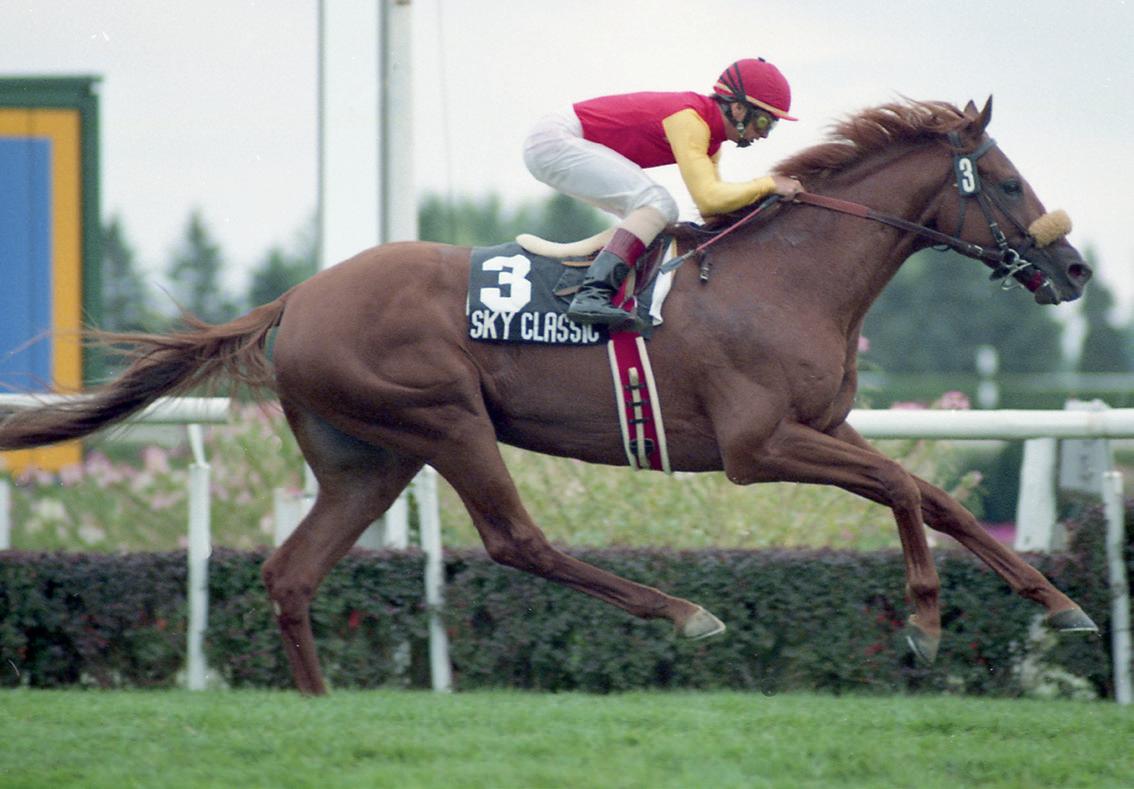
Rothmans Ltd. International Stakes – Grade 1 | Turf Classic Invitational Stakes – Grade 1 Arlington Handicap – Grade 2 | Caesars International Handicap – Grade 2 Early Times Manhattan Handicap – Grade 2 | Early Times Dixie Handicap – Grade 3 Grey Stakes – Grade 3 | King Edward Breeders’ Cup Handicap – Grade 3 | Summer Stakes – Grade 3 Canadian Maturity Stakes | Connaught Cup Stakes | Cup and Saucer Stakes | Seagram Cup Handicap
BIOGRAPHY
How do you measure greatness?
By any standard, Sky Classic checked all the boxes. Owned by Ernie Samuel’s Sam-Son Farm and trained by Jim Day, Sky Classic was fast. He was strong. He had class. He passed on his greatness to future generations. And was he ever resilient.
A son of the legendary Nijinsky II out of the future Hall of Fame mare No Class, Sky Classic was precocious, finishing second in his first two starts of 1989 before reeling off four consecutive victories. After breaking his maiden, Sky Classic won the Grade 3 Summer Stakes, the Cup and Saucer Stakes, and the Grade 3 Grey Stakes. It added up to a Sovereign Award as Canada’s Champion Two-year Old Colt.
And then, just as quickly, it all seemed to fall apart. He was besieged by one injury after another, forcing him to the sidelines for almost a full year. When he did return, he was not himself, failing to win any of his five races in 1990. Again, he was turned out.
His first two starts of 1991 were inconspicuous – he finished eighth and sixth.
But then it happened: Sky Classic won his next six starts. After winning an allowance race, he won the Connaught Cup Stakes, the Grade 3 King Edward Gold Cup Handicap, the Canadian Maturity Stakes, and then the Seagram Cup Handicap. The fifth was the most significant; Sky Classic won the Grade 1 Rothman’s Ltd. International Stakes, setting a course record of 2:27.80 for 1 1/2 miles. Sky Classic’s final race of 1991 produced a game fourth-place finish in the Breeders’ Cup Turf. The marvellous season produced two more Sovereign Awards: Champion Older Horse and Champion Grass Horse.
Sky Classic returned better than ever in 1992.
After finishing fourth in the Grade 3 Fort Harrod Stakes at Keeneland and second in the Grade 3 Early Times Turf Classic Stakes at Churchill Downs, he won five graded stakes and placed in two. Consecutively, he won the Grade 3 Early Times Dixie Handicap at Pimlico, the Grade 2 Early Times Manhattan Handicap at Belmont Park, the Grade 2 Caesars International Handicap at Atlantic City, and then the Grade 2 Arlington Handicap.
Second in the Grade 1 Arlington Million Stakes by just a head, Sky Classic bounced back to take the Grade 1 Turf Classic Invitational Stakes at Belmont Park by a length and three quarters, setting a new course record of 2:24.50 for 1 1/2 miles. That set the stage for Sky Classic’s final race of his career: the Breeders’ Cup Turf at Florida’s Gulfstream Park.
If life was a happy-ending novel Sky Classic would have jogged into retirement; but, it was not to be. After dueling through the stretch, Sky Classic was held off by Fraise, defeated by a scant nose. For these accomplishments, he was awarded the 1992 Eclipse Award as the Champion Grass Horse in North America.
Sky Classic retired to stallion duty at Pin Oak Stud in Kentucky with nine graded stakes wins and career earnings of $3.32 million, a record, at that time, for a Canadian-bred. He enjoyed success as a stallion, siring six champions. Notable among his progeny was Thornfield, the 1999 Canadian Horse of the Year. Additionally, Sky Classic was an accomplished broodmare sire, having sired the dam of Group 1 English 1000 Guineas winner, Speciosa.
Sky Classic was inducted into the Canadian Horse Racing Hall of Fame in 1998.
OWNER
Sam-Son Farm
BREEDER
Sam-Son Farm
PEDIGREE
1992 b. h.
Mr. Prospector – Classy ‘n Smart, by Smarten
Starts 1st 2nd 3rd Earnings
8 6 1 0 $337,376
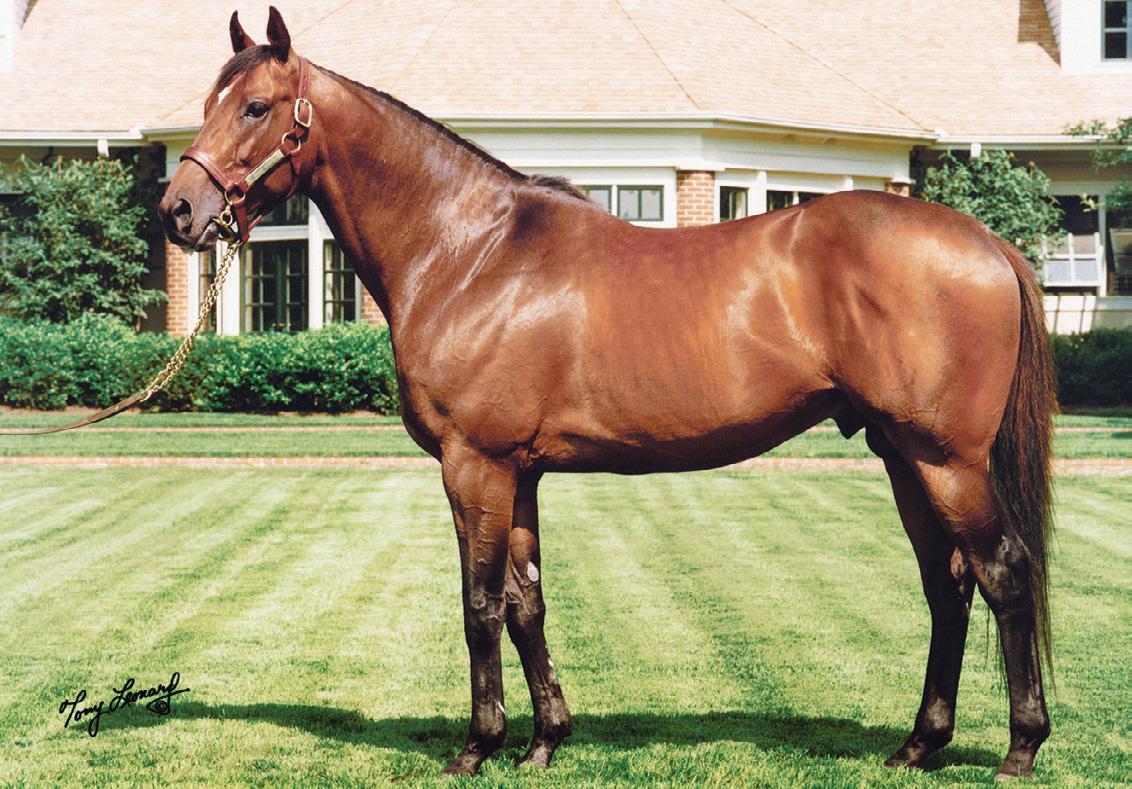
Philip H. Iselin Handicap – Grade 1 | Salvatore Mile Handicap – Grade 3
Ermie Samuel’s Sam-Son Farm was well into building its legacy as one of Canada’s most successful and internationally acclaimed breeders when Smart Strike was readying for his racing debut in 1995. Expectations were high for the beautiful bay son of the great Mr. Prospector as his half-sister, multiple Sovereign Award champion Dance Smartly, had become the first Canadian-bred to win a Breeders’ Cup race just a few years earlier when she took the 1991 Breeders’ Cup Distaff at Churchill Downs.
Smart Strike showed plenty of brilliance in his early training for Mark Frostad and, while the barn was surprised when the colt was only third in his three-year old debut in a tough maiden sprint at Keeenland, he proceeded to breeze through three consecutive victories, including two at Woodbine. Unfortunately, Smart Strike was sidelined with a tendon injury and did not run again until the following summer.
For Sam-Son and Frostad, it would be worth the wait. He returned to romp in a seven-furlong tune-up race at Woodbine with Sandy Hawley riding, and then coasted to his first stakes victory in the Grade 3 Salvator Mile at Monmouth Park in New Jersey just under three weeks later. That race set him up for the Grade 1 Philip Iselin Handicap, also at Monmouth, where not only did Smart Strike win with flair, he defeated, among others, the remarkable champion Serena’s Song.
The stage was set for an exciting match-up between Smart Strike, the young Canadian upstart, and America’s great horse, Cigar, who recently had his incredible winning streak halted at 16. The pair met in the Grade 1 Woodward
Stakes at Belmont Park and while Smart Strike was a force early, setting a hot pace to the top of the stretch, he finally faded as Cigar powered to victory. It would be Smart Strike’s final race as he would suffer a condylar fracture of his right front leg while preparing for the Breeders’ Cup.
While recovering at Sam-Son’s Canadian farm in Milton, Ontario, Smart Strike was visited by Will Farish, owner of the powerful Lane’s End Farm in Versailles, Kentucky. Farish was set on standing the colt at stud, and, after a meeting with Samuel, a deal was made. The horse stood his first year in 1997 alongside top sires A.P. Indy, Gulch, and Summer Squall. It wasn’t long before he fit right in.
Smart Strike sired more than 130 stakes winners, eight Eclipse Award winners, nine Sovereign Award winners, four Breeders’ Cup winners and horses who could race on any surface at any distance. The success of his progeny propelled Smart Strike to consecutive titles as the leading sire in North America in 2007 and 2008.
Perhaps Smart Strike’s greatest claim to fame is his son Curlin, a four-time Eclipse Award winner and one of today’s most sought-after stallions after beginning his own stallion career alongside his sire at Lane’s End. Smart Strike was the complete thoroughbred, from his exceptional racetrack ability to his prepotency in the breeding shed. Sadly, he lost a battle with laminitis in 2015 and was put down. The Samuel family, so proud of their homebred, brought some of the horse’s remains home to Ontario to be interred at the Milton farm.
Smart Strike was inducted into the Canadian Horse Racing Hall of Fame in 2008.
OWNER
Sam-Son Farm
BREEDER
Sam-Son Farm
PEDIGREE
1999 dk. b./br. g. Smart Strike – Dancing With Wings, by Danzig
CAREER RECORD
Starts 1st 2nd 3rd Earnings
27 15 4 0 $2,110,371
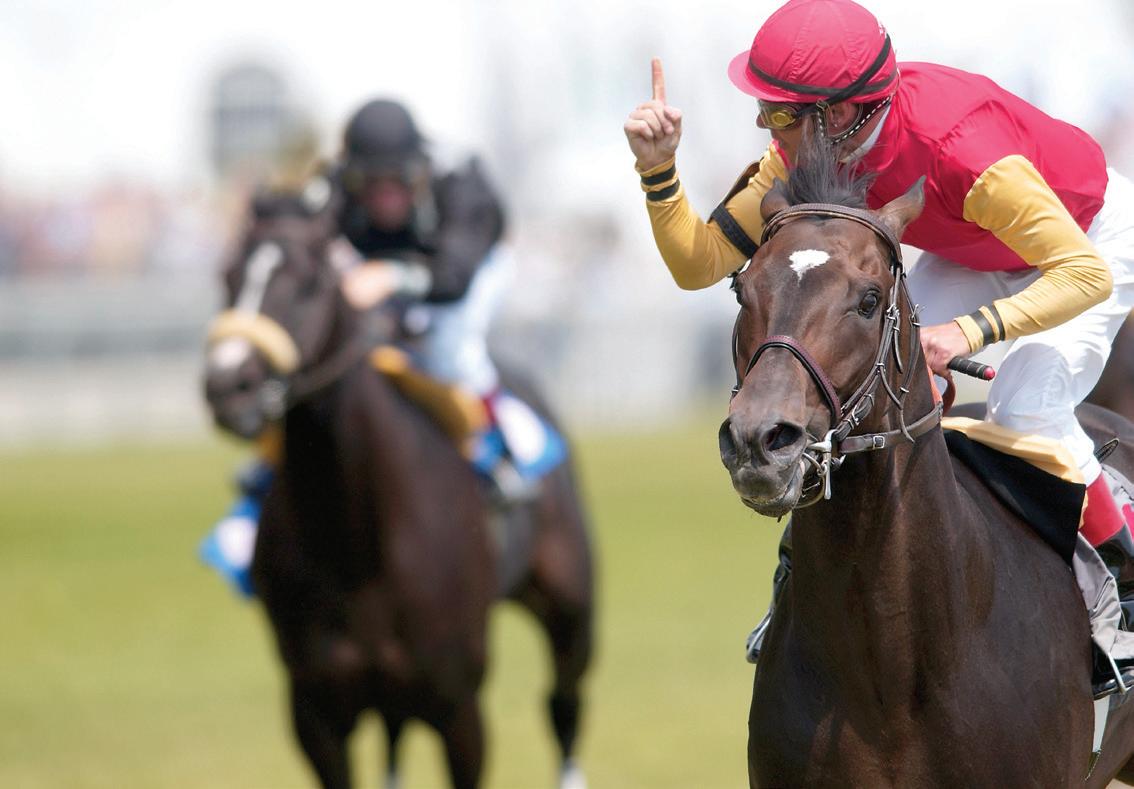
Atto Mile Stakes – Grade 1 | Nearctic Handicap – Grade 2 | Play the King handicap – Grade 3 (twice) Scotts Highlander Handicap – Grade 3 (twice) | Shakertown Stakes – Grade 3 (twice)
Ontario Jockey Club Stakes (twice)
Born in January 1999, Soaring Free was a big, dark bay from the second crop of Sam-Son Farms’ exciting stallion Smart Strike. He was so gangly that when he joined trainer Mark Frostad’s barn as a two-year old, it was apparent the horse was going to need some time to grow and mature. It wasn’t until June of his three-year old season when Soaring Free made his career debut – and what a debut it was. Ridden by Todd Kabel, Soaring Free came from last place in the 6 1/2 furlong dirt sprint, circling the field wide to win by 1 3/4 lengths. He won two of six races in that first year of racing, but it was becoming a gelding before his four-year old campaign that helped Soaring Free rise to Grade 1 status.
Following two explosive allowance victories, Soaring Free made his grass debut in the Grade 2 Nearctic Stakes at Woodbine, cruising to a 3 1/2 length victory in course record-equaling time of 1:07.73 for six furlongs. The powerful win backed up the thinking of Frostad and Kabel that Soaring Free was going to be an even better horse on the grass. He won two more stakes races, the Ontario Jockey Club Stakes and Grade 3 Play the King Handicap, before getting a chance to compete in the $1 million Grade 1 Atto Mile. The speedy gelding led very late in the race only to be edged at the finish by California invader Touch of the Blues (FR). Behind Soaring Free that day were graded stakes winner Perfect Soul (IRE) and Canadian Triple Crown winner Wando. Sam-Son’s rising star completed 2003 in the Grade 1 Breeders’ Cup Mile at Santa Anita, where he finished fifth after taking the lead turning for home. Soaring Free was voted Canada’s Champion Sprinter at the 2003 Sovereign Awards.
The best was yet to come.
As a five-year old, Soaring Free began the season with a win in the Grade 3, 5 1/2 furlong Shakertown Stakes at Keeneland. After not handling the grass at Pimlico for the Grade 3 Maryland Breeders’ Cup Stakes, he set sail on a five-race winning streak which included the Grade 3 Scotts Highlander Handicap, Ontario Jockey Club Stakes, and Grade 3 Play the King Handicap. Sent postward as the 2 to 1 favourite for the Grade 1 Atto Mile, again worth $1 million, Soaring Free battled on the pace throughout and held off Perfect Soul to win by half a length. The gelding earned a trip to the Grade 1 Breeders’ Cup Mile at Lone Star Park that November, where he finished a close fourth, just 2 1/4 lengths behind winner Singletary. The gelding’s fabulous campaign earned him Canadian Horse of the Year and Champion Male Turf Horse honours.
At the age of six, Soaring Free would repeat in the Shakertown and Highlander, but he was sidelined that summer, not reappearing until April of 2006. In attempting to win the Shakertown at Keeneland for the third time that spring, Soaring Free faded to sixth and was retired from racing.
Soaring Free joined other Sam-Son stakes stars such as Desert Waves and Up With the Birds at their lush Ocala, Florida farm to live out his retirement.
He was inducted into the Canadian Horse Racing Hall of Fame in 2013.
OWNER
R. E. Sangster
BREEDER
E. P. Taylor
PEDIGREE
1978 b. h.
Northern Dancer – South Ocean, by New Providence
Starts 1st 2nd 3rd Earnings
6 5 0 0
$581,266

William Hill Dewhurst Stakes – Group 1 | National Stakes – Group 2 | Anglesey Stakes – Group 3 Larkspur Stakes – Group 3
BIOGRAPHY
Storm Bird was a $30 million horse before he even made a start as a three-year old. Undefeated as a juvenile in Ireland and England in 1980, Storm Bird’s owner Robert Sangster sold 75 percent of the son of the legendary Northern Dancer to an American syndicate the following year for what would be a bargain sum.
A champion on the racetrack as a two-year old, Storm Bird was a prolific sire and broodmare sire.
Foaled in 1978 at E. P. Taylor’s Windfields Farm in Oshawa, Storm Bird was sold at the following year’s Keeneland July sale in Lexington for $1 million. Northern Dancer’s offspring were in high demand, and Storm Bird’s full sister, Northernette, had just completed two championship seasons in Canada and had won a Grade 1 in New York. Expectations were high for the elegant-looking bay colt.
Robert Sangster was the winning bidder for Storm Bird and the colt joined the yard of celebrated Irish trainer Vincent O’Brien, who trained the great Nijinsky II to English Triple Crown success in 1970.
Storm Bird began his career much like Nijinsky, winning the Erne Maiden Stakes at the Curragh in his two-year old debut followed by the Group 2 Anglesey Stakes before romping in the Group 3 Larkspur Stakes and then capturing the Group 2 National Stakes.
He took his unbeaten Irish record to England for the prestigious Group 1 William Dewhurst Stakes and in cold, windy, and wet conditions, won a long stretch drive with the very good colt To-Agori-Mou. Storm Bird was crowned Champion Two-year Old Colt in England and Ireland.
Comparisons to Nijinsky were easy to make and Storm Bird was favoured for the classics in 1981. Unfortunately, minor injuries, illness, and a bizarre attack by a disgruntled stable lad who cut off the horse’s mane delayed his sophomore campaign. In the meantime, Sangster sold 75 percent of the colt to an American syndicate led by Dr. William Lockridge.
After Storm Bird performed poorly in the Prix du Prince d’Orange in his lone start as a three-year old, he was retired to Ashford Stud in Lexington, Kentucky, where he was an instant star at stud, siring 63 stakes winners. Among them were champions Balanchine, Indian Skimmer, and Bluebird, and Grade 1 winners Storm Cat and Summer Squall.
Storm Cat, from the very first crop of Storm Bird, was a Grade 1 winner as a two-year old and went on to be one of the world’s most successful stallions with 129 stakes winners. Summer Squall and Bluebird also went on to strong stud careers.
In the 1999 Kentucky Derby, Storm Bird was responsible for the top three finishers; Charismatic (by Summer Squall) would go on to be named Horse of the Year, defeating Menifee (by a Storm Cat son) and Cat Thief (by Storm Cat). And Storm Bird’s daughters produced over 100 stakes winners, including 2004 Belmont Stakes winner Birdstone. Storm Bird passed away at the age of 26 in 2004 at Ashford Stud due to colic. His offspring earned more than $30 million.
OWNER
D. J. Foster Racing Stable BREEDER
David J. Foster
PEDIGREE
1980 ch. h. Halo – Mostly Sunny, by Sunny
CAREER RECORD
Starts 1st 2nd 3rd Earnings
20 9 3 2 $1,247,791
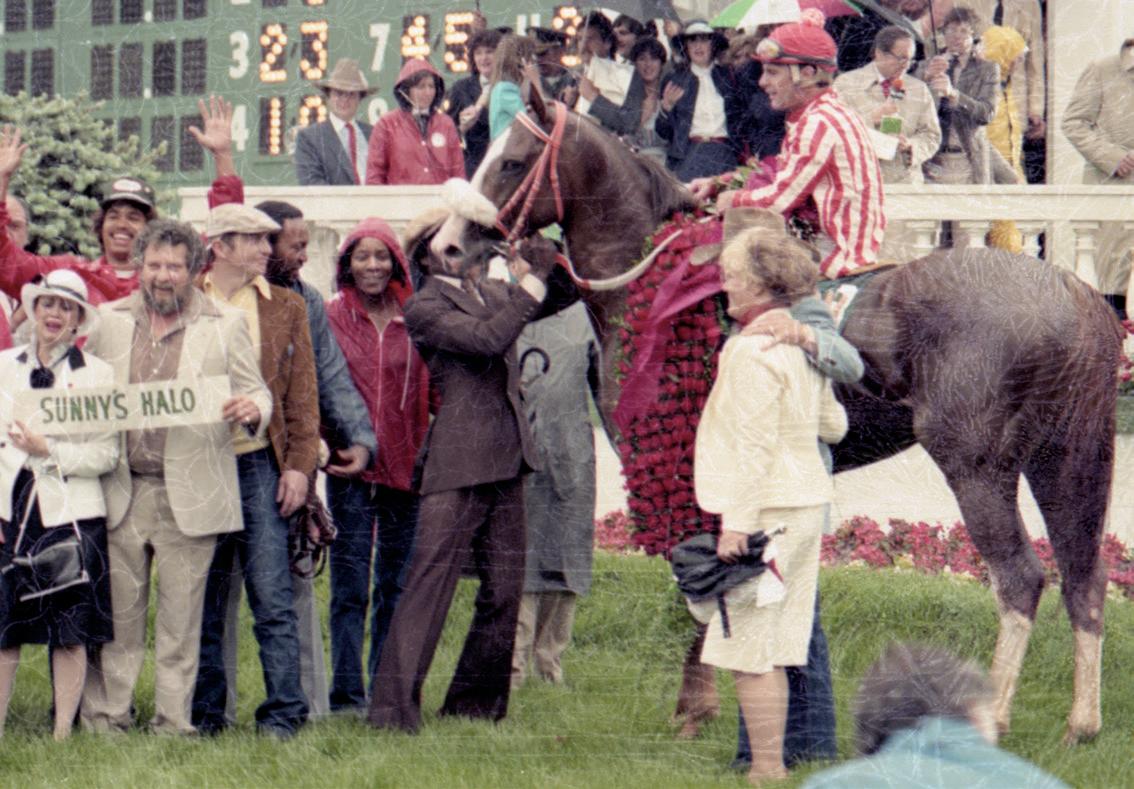
MAJOR WINS
Arkansas Derby – Grade 1 | Kentucky Derby – Grade 1 | Super Derby – Grade 1 | Colin Stakes Coronation Futurity | Grey Stakes | Rebel Handicap | Swynford Stakes
BIOGRAPHY
His name was befitting of his presence, an ethereal-looking chestnut who holds the distinction of being the first threeyear old thoroughbred in North America to earn more than $1 million in a single season.
For as striking as he was, Sunny’s Halo, bred and owned by D. J. (Pud) Foster and trained by David C. Cross Jr., was also a steely competitor. The talented colt’s accomplishments on the track were many, highlighted by a two-length triumph in the 1983 Kentucky Derby, a stirring score that linked him to the immortal Northern Dancer as the only Canadian-breds to have won the “Run for the Roses.”
During that magnificent sophomore campaign, Sunny’s Halo, a son of Halo – Mostly Sunny, equalled the track record in the $1 million Super Derby at Louisiana, courtesy of a 12 length tour-de-force. He launched his year with victories in the Rebel Handicap and the Grade 1 Arkansas Derby, both at Oaklawn Park.
In his rookie year, Sunny’s Halo served notice, to his connections and rivals, that he was a force to be reckoned with. He laid claim to stakes scores in the Grey Stakes, Swynford Stakes, Colin Stakes, and Coronation Futurity en route to Sovereign Award honours as Canada’s champion juvenile. Success eluded him in the U. S. that year, with his best showing a third in the Grade 3 Tremont Stakes at Belmont. Stress fractures in his front shins were discovered after an off-key performance in the Young America Stakes, which ended his season.
Cross took his young star to California ahead of that outstanding three-year old campaign. The training regimen for Sunny’s Halo included the use of an equine pool a few times a week to help build muscle tone and stamina while allowing his shins adequate time to heal. It proved to be the perfect prescription for success, as Sunny’s Halo went on to win his first three starts of the year.
It wasn’t all roses for the fan favourite, though – a stumble at the start over a sloppy strip resulted in a sixth in the Preakness Stakes at Pimlico and a skin virus denied him the chance to contest The Queen’s Plate.
Over a 20-race career, Sunny’s Halo posted nine wins, eight in stakes races, three of them in Grade 1 events. He also had three seconds and two thirds in stakes, including a third in the Grade 1 Whitney Stakes when competing against older horses. His $1,247,791 in purse earnings made him, at the time, Canada’s top money-winning thoroughbred.
After a second in the 1983 running of the Grade 3 Volante Handicap, Sunny’s Halo was retired to stud. He died at the age of 23 in June 2003, at Double S Thoroughbreds in Tyler, Texas. At the time of his passing, he was Texas’ leading sire by lifetime progeny earnings, with over $26 million in worldwide purses won. He sired Grade 1 winners Dispersal, Irgun, and Race the Wild Wind, herself the dam of Grade 1 winner King Charlemagne, and grand-dam of Grade 1 winners Dayoutoftheoffice, Albertus Maximus, Daredevil, and Here Comes Ben.
In 1986, Sunny’s Halo was inducted into the Canadian Horse Racing Hall of Fame.
OWNER
R. E. Sangster
BREEDER
E. P. Taylor
PEDIGREE
1974 ch. h.
Northern Dancer – Fleur, by Victoria Park
CAREER RECORD
Starts 1st 2nd 3rd Earnings
9 7 1 1
$429,575
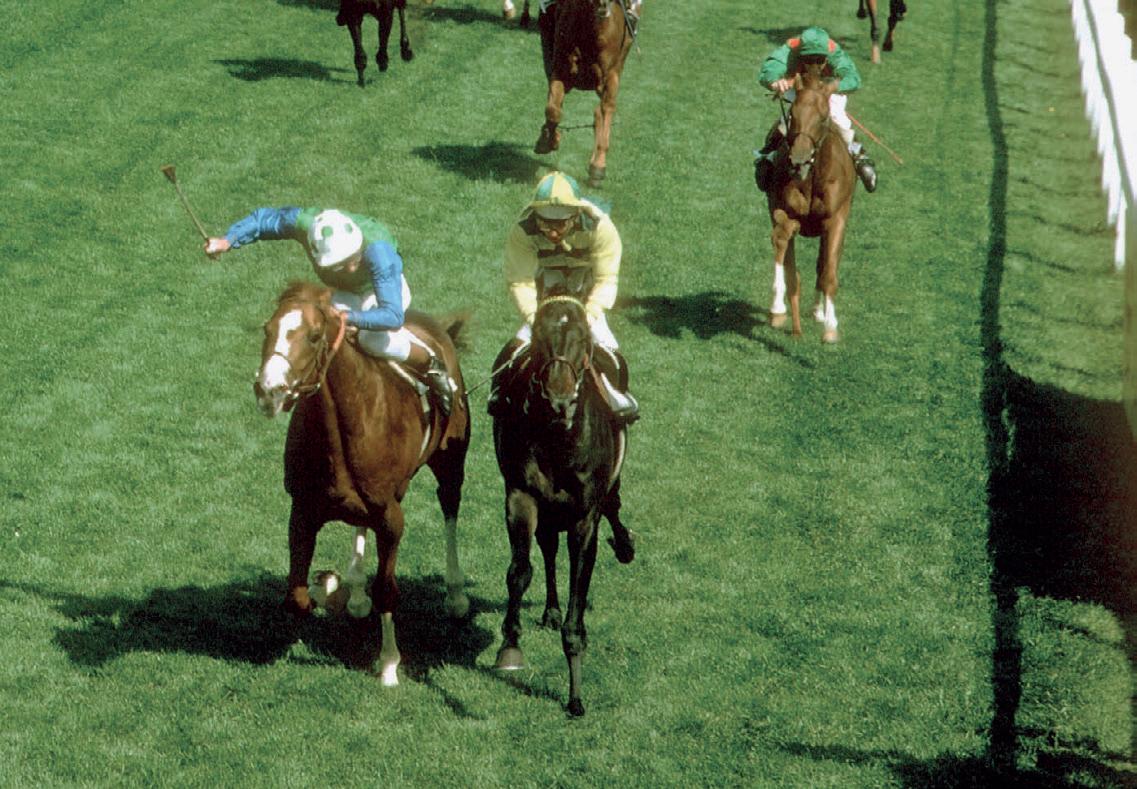
Epsom Derby – Group 1 | Irish Sweeps Derby – Group 1
King George VI & Queen Elizabeth Diamond Stakes – Group 1 | William Hill Dewhurst Stakes – Group 1
Ascot Two Thousand Guineas Trial Stakes – Group 3 | Larkspur Stakes – Group 3
It’s an old saw, but “Like Father Like Son” is often true. Especially in sports.
In horse racing, The Minstrel had his father, Northern Dancer, arguably the greatest sire in thoroughbred history.
But the story of The Minstrel isn’t just father and son. The Minstrel was out of the mare Fleur, a half-sister to Nijinsky II, making The Minstrel a three-quarter brother to Nijinsky II, who was victorious in the 1970 English Triple Crown. These three races – the one mile Two Thousand Guineas, the mile and a half Epsom Derby, and the St. Leger at 1 13/16 miles – present a demanding challenge. Winning all three is rare. Nijinsky II was the first winner in 35 years and is still the last horse to accomplish that feat more than 50 years later.
The Minstrel was bred in Ontario by E. P. Taylor’s Windfields Farm. By then, Northern Dancer’s offspring sold at a premium. The Minstrel’s older full brother, Far North, had sold as a yearling for $250,000 in 1974. The Minstrel, a chunky chestnut with four white feet and a big white blaze, was purchased for $200,000 at the 1975 Keeneland July Yearling Sale by the British Bloodstock Agency acting on behalf of a group headed by Britain’s Robert Sangster. He was exported to Europe, and under the tutelage of renowned Irish trainer Vincent O’Brien, he went undefeated in three races as a two-year old, including the Group 1 Dewhurst Stakes in 1976.
He began his three-year old season by winning the seven furlong Two Thousand Guineas Trial at Ascot, then lost both the Two Thousand Guineas at Newmarket and the Irish Two Thousand Guineas, creating doubts about his ability to handle the distance of The Derby.
Despite these losses, legendary jockey Lester Piggott chose him over two-year old French champion Blushing
Groom as his mount for The Derby. In what may be the first recorded example of using cotton wool as a calming influence, O’Brien stuffed The Minstrel’s ears to help him manage the pre-race noise of the large crowd. He won the race in an epic stretch duel with Hot Grove – the two horses on almost even terms throughout the last quarter of a mile. Blushing Groom was third.
The Minstrel followed up by winning the Irish Sweeps Derby before contesting his final, most difficult race.
He was taking on older horses for the first time in the 1 1/2 mile King George VI and Queen Elizabeth Diamond Stakes – Britain’s most prestigious all-age race. Arguably his finest performance, he won by a short head in a photo finish over a charging Orange Bay. His performances earned him Europe’s Horse of the Year honours for 1977.
Reacquired by E. P. Taylor, he was syndicated for $9,000,000 to stand at Windfields Maryland.
Somewhat successful at stud, The Minstrel’s son Palace Music won the Group 1 Champion Stakes in 1984 before siring 1995 and 1996 American Horse of the Year, Cigar, and leading Australian runner Naturalism. The Minstrel sired ten other Group One winners, including 1986 Breeders’ Cup Mile winner, Opening Verse and 1986 Cheveley Park Stakes winner, Minstrella.
The Minstrel was given a Timeform rating of 130 pounds as a two-year old – one pound below Blushing Groom. At three, Timeform gave him a rating of 135 pounds – two below that year’s highweight, Alleged.
In their book A Century of Champions (1999, Portway Press), British experts John Randall and Tony Morris rated The Minstrel as a “superior” Derby winner and the 16th-best Irish-based racehorse of the 20th century.
OWNER
R. J. Bennett
BREEDER
R. J. Bennett
PEDIGREE
1979 b. h.
Hail to Victory – Travelling Round, by Traveling Dust
CAREER RECORD
Starts 1st 2nd 3rd Earnings
52 21 10 7 $774,773
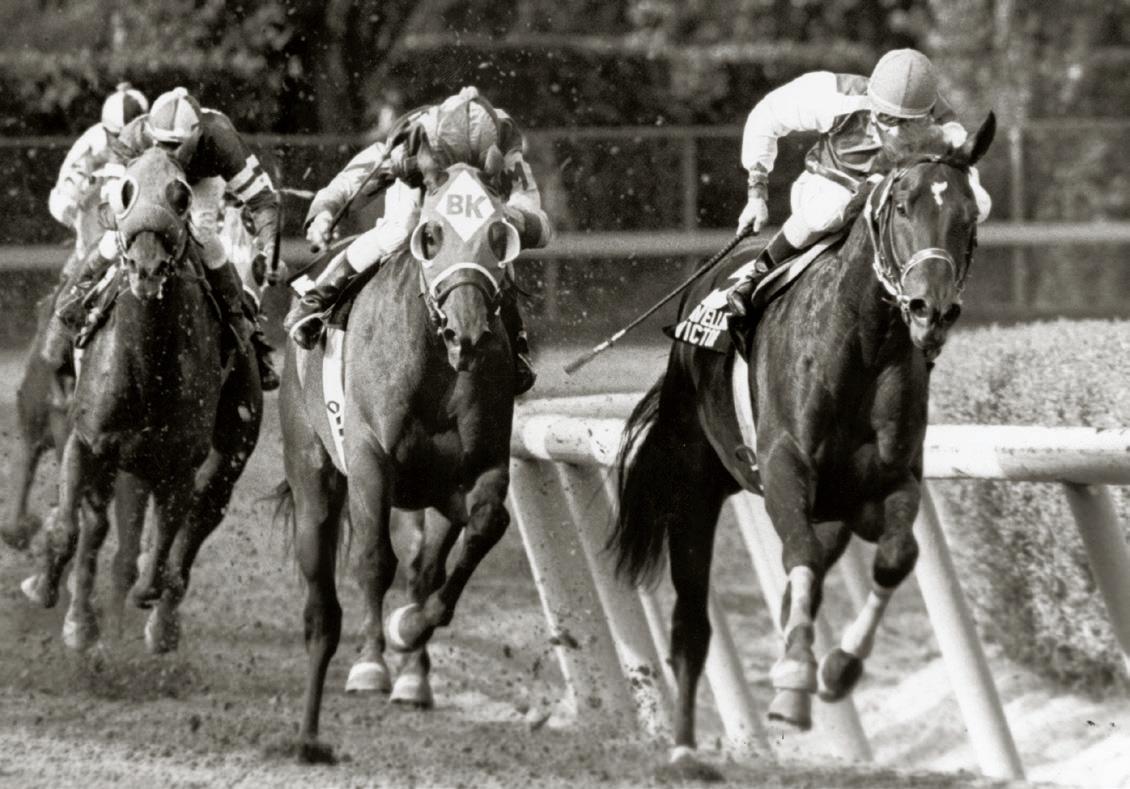
MAJOR WINS
Longacres Mile – Grade 2 | B. C. Derby – Grade 3 | B. C. Premier’s Championship Handicap – Grade 3 B. C. Premier’s Championship Handicap | Bellevue Handicap | Columbian Stakes
Governor’s Handicap (twice) | Inaugural Stakes | Invitational Marathon Handicap | Klondike Handicap Randle Plate Handicap | Seattle Handicap | Sir Winston Churchill Handicap | S. W. Randall Plate
Travelling Victor was, rather appropriately, a well-travelled competitor who managed to go the extra mile whenever and wherever the gates opened.
Bred by Russell and Lois Bennett at their Flying Horse Farm in Westbank, British Columbia, the horse foaled on April 13, 1979, would go on to achieve greatness in his native province and beyond.
The bay’s racing career began modestly, with his first two starts, both at Exhibition Park in Vancouver, resulting in a fifth and a third two weeks apart in August 1981. A third start that month yielded his first career victory, and he followed that up less than two weeks later with another trip to the winner’s circle, both of them at Exhibition Park.
His first stakes success came in the 1982 Inaugural Stakes, the first race of his three-year old campaign. The best was yet to come for the hard-nosed horse. He would take all the spoils in the Grade 3 B. C. Derby later in that same year following victories in the Columbian Stakes, the Klondike Handicap, and the Bellevue Handicap, his first victory away from home, at Longacres. Breaking from the gate 15 times in that three-year old campaign, he headed to California after his B. C. Derby victory, even trying his hand on turf in the Grade 1 Hollywood Derby.
Winless in five starts to the south, he didn’t top a field again until capturing an allowance back at Exhibition Park in June of 1983. What followed was one for the history books, as the Bennetts' star shone with four stakes wins and another four stakes placings that year, including seconds in the Grade 2 Longacres Mile at Longacres and the Grade 2 Carleton F. Burke Handicap at Santa Anita.
Travelling Victor, who set a pair of track records for 1 3/8 miles and 1 1/2 miles at Exhibition Park Racetrack,
made history by becoming the first horse who had not competed in the province of Ontario to be crowned Canada’s Horse of the Year, accomplishing that feat at the 1983 Sovereign Awards ceremony. On that same evening, he also earned a Sovereign Award as Champion Older Horse, while the Bennetts were recognized as Outstanding Breeder.
He started his five-year old campaign in 1984 with four straight victories, two at Exhibition Park and two at Longacres, including the Grade 2 Longacres Mile. He was named the Longacres Horse of the Year for that meet. He also placed in the Hillsdale Handicap and Woodside Handicap at Bay Meadows late that season.
Still travelling and winning at six years old, Travelling Victor’s final victory came in the 1985 running of the Grade 3 B. C. Premier’s Championship Handicap, one of four wins from 11 starts that year. Two months after that race, his career would come to an end with a fourth-place finish in a Handicap Race at Bay Meadows Racetrack in San Mateo, California.
Consistency was the hallmark of a career that yielded fifteen victories in stakes events.
On track to establishing himself as an outstanding sire, Travelling Victor was standing at stud for his owners when he passed away unexpectedly in 1992. His best runner was the multiple stakes winner Strawberry Morn, herself the dam of Group 2 winner Strawberrydaiquiri (GB).
Buried at Flying Horse Farm, Travelling Victor blazed a trail for his Western Canadian contemporaries, a horse who was right at home on any course.
OWNER
Prestonwood Farm LLC
BREEDER
Tall Oaks Farm
PEDIGREE
1995 b. h.
Cryptoclearance – Victorious
Lil, by Vice Regent
CAREER RECORD
Starts 1st 2nd 3rd Earnings
17 9 5 1 $3,505,895
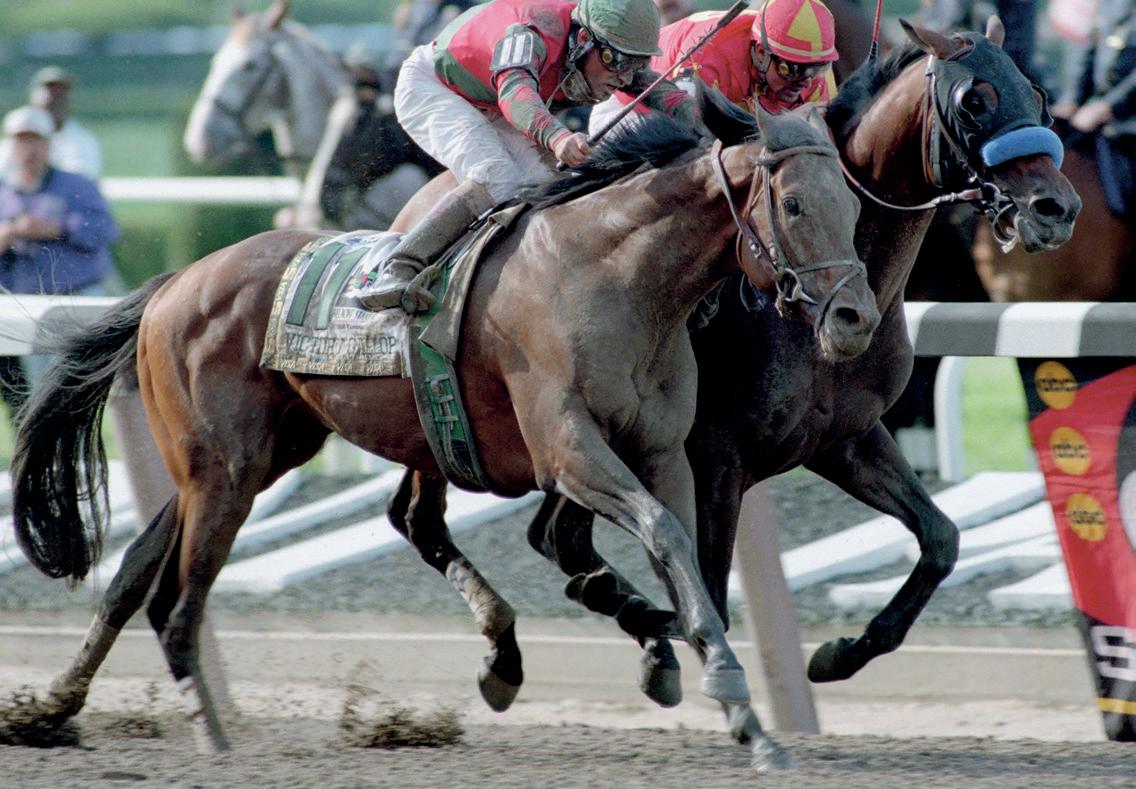
Belmont Stakes – Grade 1 | Whitney Handicap – Grade 1 | Arkansas Derby – Grade 2 Stephen Foster Handicap – Grade 2 | Rebel Stakes – Grade 3 | Chenery Stakes | New Kent Stakes
BIOGRAPHY COURTESY JOCKEY CLUB OF TURKEY
Joe Frazier had Muhammad Ali.
The Los Angeles Lakers had the Boston Celtics.
The Calgary Flames have the Edmonton Oilers.
And, like Sunday Silence and Easy Goer, there was Real Quiet and Victory Gallop.
In 1998, Victory Gallop was defeated by Real Quiet in the Kentucky Derby by a half-length after racing from far back and extremely wide around the final turn. Real Quiet again prevailed in the Preakness Stakes, this time by 2 1/4 lengths.
Then came the Belmont Stakes. In one of the most stirring stretch drives ever, Victory Gallop got up in the final strides to win their photo finish by a nose, denying Real Quiet of what would have been the first Triple Crown in 20 years.
In the heart-beating finish that track announcer Dave Johnson said was too close to call, Victory Gallop became the first Canadian-bred to win the Belmont.
Bred in Ontario by the Tall Oaks Farm of Ivan Dalos, Victory Gallop truly was one of racing’s exceptional stars. An extremely late foal by 1987 Florida Derby winner Cryptoclearance out of the stakes-winning Vice Regent mare Victorious Lil, he was also gorgeous, earning the nickname “Cruise” after film star Tom Cruise.
Victory Gallop won three of his first five starts as a two-year old, including the New Kent Stakes and Chenery Stakes at Colonial Downs, before finishing second in the important Grade 3 Laurel Futurity.
Starting his 1998 Triple Crown trail at Oaklawn Park, Victory Gallop won the Grade 3 Rebel Stakes and the Grade 2 Arkansas Derby – both by a scant head – and stamped himself as a legitimate Kentucky Derby contender.
After the Triple Crown, Victory Gallop’s next two outings were in two prestigious Grade 1 contests, the Buick Haskell Invitational Handicap and the Travers Stakes. He finished second in both of them to $2 million winner Coronado’s Quest – by a length and a quarter in the Haskell, and a bobbing nose in the Travers after having to deal with a slow pace and racing wide.
In his final three-year old race, Victory Gallop finished fourth against one of the greatest fields ever assembled for the Breeders’ Cup Classic, losing to fellow Canadian legend Awesome Again by just one length.
The handsome bay was then third in the Dubai World Cup after winning an allowance race at Gulfstream Park in his four-year old debut. Victory Gallop concluded his racing career with rousing victories in the Stephen Foster Handicap and the Whitney Handicap, both Grade 1s. Coming from way back, he won the Stephen Foster by five widening lengths in track record time (1:47.28) for a mile and an eighth at Churchill Downs. He got the nod in the Whitney by a head over Behrens before being named the Eclipse Champion Older Male of 1999.
Victory Gallop was retired to stud because of a torn suspensory and stands at Izmit Stud Farm in Turkey. Still covering 20 mares at age 28, he has progeny worldwide, with approximately 600 starters and 385 winners, and progeny earnings exceeding 190 million Turkish lira (over U. S. $9,600,000) according to the Turkish Jockey Club.
Among Victory Gallop’s leading runners are graded/group stakes winners Anak Nakal, Eishin Dover, Eishin Lombard, Victory U. S. A., Prince Will I Am, Victory Choice, and Kettleoneup.
In 2010, Victory Gallop was inducted into the Canadian Horse Racing Hall of Fame.
OWNER
Gustav Schickedanz
BREEDER
Gustav Schickedanz
PEDIGREE
2000 ch. h.
Langfuhr – Kathie’s Colleen, by Woodman
CAREER RECORD
Starts 1st 2nd 3rd Earnings
23 11 2 2 $2,563,038

Grey Breeders’ Cup Stakes – Grade 2 | Marine Stakes – Grade 3 | Breeders’ Stakes Mt. Sassafras Stakes | Prince of Wales Stakes | Queen’s Plate Stakes | Vandal Stakes | Woodstock Stakes
The gallant chestnut was front page news; literally an equine athlete who captured a nation’s attention during a remarkable three-race run.
On June 22, 2003, Wando, with Patrick Husbands in the irons, loaded into the gate for the 144th running of The Queen’s Plate, played out in front of an electric, jam-packed Woodbine Racetrack grandstand.
Little did anyone – fans, connections, pundits, and others –know that it would be the start of a compelling journey, one that would culminate in Canadian Triple Crown glory.
After a nine-length romp as the 7-5 choice over stablemate Mobil in the Plate, a wave of Wando-mania began. It seemed to grow exponentially after a four-length score at Fort Erie in the Prince of Wales. In the days leading up to the Breeders’ Stakes, it was sheer pandemonium.
A multiple stakes winner as a two-year old, Wando, trained by Mike Keogh for owner and breeder Gus Schickedanz, was one victory away from adding his name to a select group of greats.
The final path to racing immortality would not be an easy task. Among others, Wando and Husbands had to contend with three Sam-Son Farm horses in the form of Shoal Water, Colorful Judgement, and Parasail, who set out to deny the colt victory in the 1 1/2 mile Breeders’, contested over the E. P. Taylor Turf Course. Despite their best efforts, Wando found daylight three-wide in upper stretch, dug down deep, and crossed the wire 1 1/2 lengths ahead of Shoal Water, all to the deafening, appreciative roar of the thousands watching the drama unfold.
Schickedanz bred his award-winning homebred stallion Langfuhr (a grandson of Northern Dancer) to his stakes-winning mare Kathie’s Colleen, producing Wando.
Wando broke his maiden in his first start in July 2002 and then dominated the Vandal Stakes. It was the first of 12 straight stakes starts, of which he would win seven. After a head defeat in the Grade 2 Summer Stakes, he was back on the winning track in the Grade 2 Grey Breeders’ Cup Stakes. Running in the Grade 1 Breeders’ Cup Juvenile in Chicago, from a demanding post 12, he would finish twelfth. His sophomore season started with a neck loss in the Achievement Handicap before producing a narrow victory in the Woodstock Stakes. In his final Plate prep, the Grade 3 Marine Stakes, he wired his rivals in another strong performance. Following the Triple Crown, he was fourth in the Grade 1 Atto Mile and third in the Grade 3 Indiana Derby. His brilliance was recognized with two Sovereign Awards as Champion Three-year Old Colt and Horse of the Year.
At four, Wando won a pair of allowance races and the Mt. Sassafras Stakes. The following year, his best finish was a third in the Jacques Cartier Stakes at Woodbine. In his final start, he struggled home last in the Grade 3 Westchester Handicap at Belmont. After the Westchester run, Keogh found a slight tear in the suspensory ligament of his star’s left hind leg. The decision was made to retire him.
Wando first stood at stud at Lane’s End Farm in Versailles, Kentucky, along with his sire, Langfuhr. Eventually brought back to Schickedanz’s Schonberg Farm in Nobleton, Ontario, he died there January 22, 2014 of a suspected heart attack.
Sire of Turallure, winner of the 2011 Grade 1 Woodbine Mile and runner-up in the Grade 1 Breeders’ Cup Mile that same year, Wando also sired Grade 1-placed Associate, and stakes winners Shake Down Baby, Veaisha, Wando Woman, and Will She.
One of Canadian racing’s most beloved figures, Wando was inducted into the Canadian Horse Racing Hall of Fame in 2014.
OWNER
Sam-Son Farm (Ernest L Samuel)
BREEDER
Sam-Son Farms
PEDIGREE
1988 b. m.
Wild Again – Nalee’s Rhythm, by Nalees Man
CAREER RECORD
Starts 1st 2nd 3rd Earnings
37 15 12 2 $1,482,033
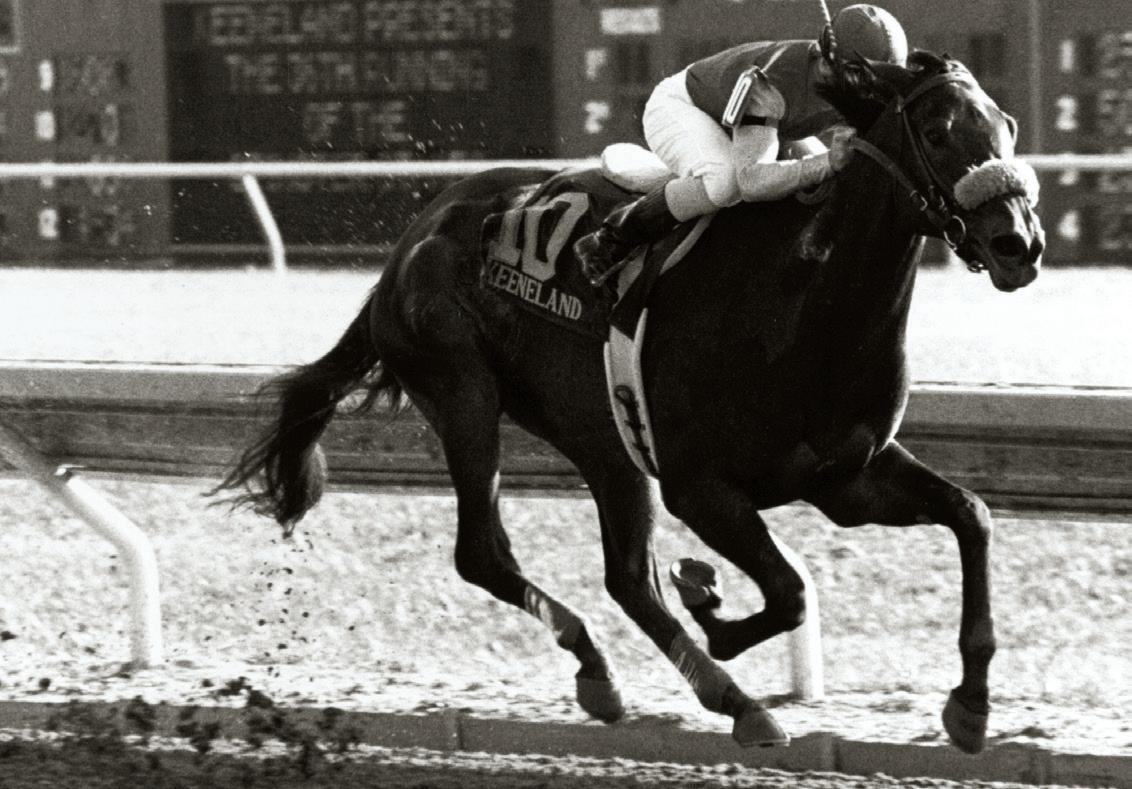
Spinster Stakes – Grade 1 | Churchill Downs Budweiser Breeders’ Cup Handicap – Grade 2 Molly Pitcher Handicap – Grade 2 | Mazarine Stakes – Grade 3
Monmouth Park Budweiser Breeders’ Cup Handicap – Grade 3 | Belle Mahone Stakes | Bison City Stakes Fury Stakes | Pimlico Distaff Handicap | Princess Elizabeth Stakes
BIOGRAPHY
Although she ran in the shadow of her superstar Sam-Son Farm stablemate, Wilderness Song would find her way into the spotlight.
Foaled in 1988, the same year as future champion and dual Hall of Fame inductee Dance Smartly, Wilderness Song may have been viewed as a second fiddle, but the daughter of Wild Again and Nalee’s Rhythm no doubt had soloist flair.
Accomplishing that was no easy feat, considering Dance Smartly would retire as Canada’s first Breeders’ Cup champion and hold status as the only filly to win Canada’s Triple Crown en route to Horse of the Year recognition in Canada and an Eclipse Award in the United States.
Wilderness Song broke her maiden at first asking, in June of a two-year old season which would see her capture four of her seven starts. Among those wins were the Grade 3 Mazarine Stakes and Princess Elizabeth Stakes. The only time she finished off the board was in the Grade 1 Breeders’ Cup Juvenile Fillies at Belmont Park, a race that saw Dance Smartly claim third.
Wilderness Song would capture the Fury Stakes at three before she and Dance Smartly would meet up again in the Canadian Oaks and Queen’s Plate, with the former settling for second to her high-profile barn mate in each contest.
But it wasn’t all bridesmaid moments for Wilderness Song. In 18 Canadian starts, she posted an 8-6-2 mark.
The bay was equally impactful in her U. S. engagements. Trained by future Hall of Fame inductee Jim Day, Wilderness Song earned the distinction of being SamSon’s first Grade 1 winner when she took the 1991 Spinster Stakes at Keeneland with legendary Pat Day in the irons, a racetrack where she would win three of four starts.
Over 19 appearances in the U. S., she won on seven occasions, including the Grade 2 Churchill Downs Budweiser Breeders’ Cup Handicap, the Grade 2 Molly Pitcher Handicap, the Grade 3 Monmouth Park Budweiser Breeders’ Cup Handicap, and the Pimlico Distaff Handicap. She also placed in stakes at Churchill Downs, Hawthorne, and Detroit.
In 1992, Wilderness Song earned her connections a Sovereign Award as Canada’s Champion Older Filly or Mare.
Her career earnings of $1,482,033 put her in ninth spot among all leading money-winning Canadian-breds when she retired following the 1993 season.
A granddam of 2013 Canadian Horse of the Year Up With the Birds and stakes winners Mulmur and Speightsong, Wilderness Song produced nine foals, six of which were winners, including stakes-placed Go to the Sun.
Pensioned since 2008, the same year she was inducted into the Canadian Horse Racing Hall of Fame, Wilderness Song passed away in 2011 at the age of 23.
OWNER
Kinghaven Farms BREEDER
Kinghaven Farms, Ltd. PEDIGREE
1986 gr./ro. h.
Caro (IRE) – Passing Mood, by Buckpasser
CAREER RECORD
Starts 1st 2nd 3rd Earnings
23 13 5 1 $2,863,540

Bowling Green Handicap – Grade 2 | Tidal Handicap – Grade 2 | Breeders’ Stakes | Connaught Cup Stakes Display Stakes | Marine Stakes | Plate Trial Stakes | Prince of Wales Stakes | Queen’s Plate Stakes
He was nicknamed Snoopy around the barn because he was inquisitive and laid-back. Although he was often too easygoing – infuriatingly pulling himself up and loafing when he got the lead – With Approval swept the 1989 Triple Crown.
With Approval won 13 of his 23 career starts, but he also had five close, heart-breaking seconds in several of North America’s top races, leaving his owner and breeder, Kinghaven Farms, and trainer Roger Attfield wondering what could have been.
Extremely talented, With Approval narrowly won the Queen’s Plate and the Prince of Wales Stakes, the first two legs of the Canadian Triple Crown, doing only as much as he had to do both times.
In the Queen’s Plate, With Approval had a tough trip, winning by a nose after being bumped, shuffled back some 15 lengths, and then trapped on the rail. He won the Prince of Wales by a scant head. The Breeders' Stakes was a completely different story, as With Approval, for one of the few times in his illustrious career, won by open lengths. It was the first Canadian Triple Crown sweep in 26 years and came with a $1 million bonus from the Bank of Montreal.
As a two-year old, With Approval won both starts, including the Display Stakes, and won six of his 10 starts as a threeyear old. Along with the Triple Crown, he won the Marine Stakes and Plate Trial Stakes en route to earning Sovereign Awards as Champion Three-year Old and Canada’s Horse of the Year.
He was arguably even better as a four-year old. Following three starts in the U. S., he won the Connaught Cup Stakes at Woodbine. Those races were completely overshadowed by his victory in the June 17 Grade 2 Bowling Green Handicap over Belmont Park’s turf course when he shattered the world record for a mile and three-eighths,
getting the distance in 2:10 1/5, almost a full second faster than the previous mark.
With Approval followed that majestic performance with another course record while winning the Grade 2 Tidal Handicap, also at Belmont Park.
But, again, there were the close calls. After finishing second in the Grade 1 Sword Dancer Handicap and returning to Woodbine for an allowance score, he was second, by a length, to Golden Pheasant in the Grade 1 Arlington Million.
With Approval returned to Belmont Park for his final two starts, the Grade 1 Turf Classic Handicap, in which he finished third – losing a photo for second, and the Breeders’ Cup Turf, which resulted in the most painful outcome: after opening a clear lead in the stretch, he was caught by In the Wings in the final strides.
Retiring with a then-Canadian earnings record of $2.8 million, With Approval was inducted into the Canadian Horse Racing Hall of Fame in 1993.
A son of Caro out of Passing Mood, he started stud duty at Live Oak Stud in Florida, then moved to Brookdale Farm before being privately purchased to stand at Lanwades Stud in the United Kingdom.
With Approval’s top offspring include 1994 Sovereign Award Champion Two-year Old Male, Talkin Man, Grade 1 winner Mission Approved, Grade 2 winners Allende, Lasting Approval, T. H. Approval, and Group 2 winner Eishin Cameron. As a broodmare sire, he is represented by the outstanding Win Approval, dam of four millionaires in Eclipse Award 2006 Champion Grass Horse and NetJets Breeders’ Cup Mile winner, Miesque’s Approval, Revved Up, Eclipse Award 2017 Champion Turf Male and Breeders’ Cup Mile winner, World Approval, and Za Approval.
Canadian Horse Racing Hall of Fame Honoured Member
Number of Sovereign Awards
Horse
Age/colour/gender/Breeding
A Bit O’ Gold (ON)
(2001 ch. g. Gold Fever – Annasan, by Corporate Report)
Alljazz (ON) (ON)
(1992 b. m. Stop the Music – Bounteous, by Master Derby)
Apelia (ON)
(1989 dk. b./br. m. Cool Victor – Arbela, by Conquistador Cielo)
Benburb (ON)
(1989 ro. g. Dr. Carter – Rosedon, by Vice Regent)
Bold ‘n Flashy (ON)
(1989 b. h. Bold Ruckus – Flashy Chestnut, by Briartic)
Brooklynsway (ON)
(2012 dk. b./br. m. Giant Gizmo – Explosive Story, by Radio Star)
Delta Colleen (BC)
(1985 dk. b./br. m. Golden Reserve – Great Poise, by Delta Judge)
Escape Clause (MB)
(2014 b. m. Going Commando – Danger Pay, by Circulating)
Eye of the Sphynx (ON)
(2001 b. m. Smart Strike – Queen of Egypt, by Vice Regent)
Fancy As (MB)
(1998 b. g. Dignitas – Fancy Lucky, by Sevastopol)
Far North (ON)
(1973 b. h. Northern Dancer – Fleur, by Victoria Park)
Flameaway (ON)
(2015 ch. h. Scat Daddy – Vulcan Rose, by Fusaichi Pegasus)
Glenorum (ON)
(1977 b. h. Prove Out – Cailey Jane, by Right Combination)
Hard Not to Love (ON)
(2016 b. m. Hard Spun – Loving Vindication, by Vindication)
Holy Helena (ON)
(2014 dk. b./br. m. Ghostzapper – Holy Grace, by Holy Bull)
Imperial Choice (ON)
(1982 dk. b./br. h. Gregorian – Your My Choice, by Barachois)
Infinite Patience (BC)
(2017 b. m. Sungold – Montero, by Louis Quatorze)
Inglorious (ON)
(2008 b. m. Hennessy – Noble Strike, by Smart Strike)
Irish Mission (ON)
(2009 ch. m. Giant’s Causeway – Misty Mission, by Miswaki)
Kamar (ON)
(1976 b. m. Key to the Mint – Square Angel, by Quadrangle)
Kathie’s Colleen (ON)
(1992 ch. m. Woodman – Royal Colleen, by Viceregal)
L’Alezane (ON)
(1975 ch. m. Dr. Fager – Northern Willow, by Northern Dancer)
La Lorgnette (ON)
(1982 b. m. Val de l’Orne (FR) – The Temptress, by Nijinsky II)
La Voyageuse (ON)
(1975 dk. b./br. m. Tentam – Fanfreluche, by Northern Dancer)
Loudrangle (ON)
(1974 ch. m. Quadrangle – Lady Known as Lou, by Nearctic)
Love Smitten (ON)
(1981 b. m. Key to the Mint – Square Angel, by Quadrangle)
Mobil (ON)
(2000 b. h. Langfuhr – Kinetigal, by Naskra)
Mr Havercamp (ON)
(2014 dk. b./br. g. Court Vision – Tennessee Lamb, by Medaglia d’Oro)
Mt. Sassafras (ON)
(1992 ch. g. Mt. Livermore – Charming Sassafras, by Sassafras (FR))
My Boy Prince (ON)
(2021 gr./ro. c. Cairo Prince – Hopping Not Hoping, by Silent Name (JPN))
Norcliffe (ON)
(1973 b. h. Buckpasser – Drama School, by Northern Dancer)
Northern Baby (ON)
(1976 b. h. Northern Dancer – Two Rings, by Round Table)
One for Rose (ON)
(1999 dk. b./br. m. Tejano Run – Saucyladygaylord, by Lord Gaylord)
One From Heaven (ON)
(1984 ch. m. Affirmed – L’Enjolie, by L’Enjoleur)
Parose (AB)
(1994 ch. g. Parlay Me – Roses for Classy, by Son of Briartic)
Pool Play (ON)
(2005 dk. b./br. h. Silver Deputy – Zuri Ridge, by Cox’s Ridge)
Rahy’s Attorney (ON)
(2004 b. g. Crown Attorney – Rahy’s Hope, by Rahy)
Regal Gal (ON)
(1973 ch. m. Viceregal – Impetuous Lady, by Hasty Road)
Ruling Angel (ON)
(1984 ch. m. Vice Regent – Loudrangle, by Quadrangle)
Sand Cove (ON)
(2005 gr./ro. h. Bold Executive – Mythical Status, by Mythical Ruler)
Sergei Prokofiev (ON)
(2016 dk. b./br. h. Scat Daddy – Orchard Beach, by Tapit)
Sintrillium (ON)
(1978 b. m. Sinister Purpose – Paisley Pal, by Golden Ruler)
Society’s Chairman (ON)
(2003 b. h. Not Impossible (IRE) – Athena’s Smile, by Olympio)
Son of Briartic (ON)
(1979 ch. h. Briartic – Tabola, by Round Table)
Steady Growth (ON)
(1976 ch. h. Briartic – Crelita, by Crepello (GB))
Stellarette (ON)
(1978 b. m. Tentam – Square Angel, by Quadrangle)
Sweet Briar Too (ON)
(1986 b. m. Briartic – Prima Babu Gum, by Gummo)
Thornfield (ON)
(1994 ch. g. Sky Classic – Alexandrina, by Conquistador Cielo)
Timely Ruckus (AB)
(1993 dk. b./br. g. Bold Executive – Shy Beauty, by Great Gladiator)
Van Beethoven (ON)
(2016 dk. b./br. h. Scat Daddy – My Sister Sandy, by Montbrook)
Victor Cooley (ON)
(1993 dk. b./br. g. Cool Victor – Willow Flight, by Lend Lease)
Wonder Gadot (ON) (2015 dk. b./br. m. Medaglia d’Oro – Loving Vindication, (ON) by Vindication)
Zadracarta (ON)
(1985 dk. b./br. m. Bold Ruckus – Montmorency, by Selari)
The Jockey Club of Canada — Le Club Jockey du Canada was incorporated on October 23, 1973, by Edward Plunket Taylor, Charles Baker, and John James Mooney. Throughout the years, The Jockey Club has evolved, but at its core remain the purposes for which it was formed:
a to promote by all lawful means improvements in the breeding, raising, and racing of thoroughbred horses throughout Canada;
b generally, to improve the quality of thoroughbred racing in Canada for the benefit of all those interested in the sport, including the general public;
c to promote and encourage outstanding races for thoroughbred horses not only against Canadian competition but against horses bred and raised in other countries, and generally to promote Canadian thoroughbred racing both in Canada and elsewhere;
d to maintain records of pedigrees of thoroughbred horses and such other records as may be considered desirable; and
e generally, to do such things as are incidental or conducive to the attainment of the foregoing objectives and the exercise of the powers of the Corporation (JCC).
The Jockey Club of Canada roster of members reflects the strength of racing in Canada and the importance of the JCC to horse racing across the country.
Some of the important undertakings of The Jockey Club of Canada include:
• conducting racing’s most prestigious annual gathering, the Sovereign Awards for outstanding achievement in thoroughbred racing in Canada;
• maintaining an international standard for Graded Stakes races in Canada;
• working to change the current Federal Tax guidelines for the racing industry in Canada;
• supporting industry participants and operating a field office of The Jockey Club (USA); and
• representing Canada at the annual International Federation of Horse Racing Authorities Conference.
BOARD OF STEWARDS
Glenn Sikura – Chief Steward
David Anderson
Douglas Anderson
Hazel Bennett
Catherine Day Phillips
Don Ferguson
Mike Ambler
Barry Anderson
Kevin Attard
Roger Attfield
Lisa Balaz
Michael Balaz
Rick Balaz
James Bannon
Jeffrey Begg
Russell J. Bennett
Craig Bernick
Peter Berringer
Ian Black
Ray Bouchard
Paul Braverman
John Brnjas
Andrij Brygidyr
Barbara Burke
Theodore Burnett
Josie Carroll
Mark Casse
Derek Chin
David Clancy
Tom Cosgrove
Katherine Curry
Colleen Dalos
Don Danard
Rolph Davis
Richard Day
Michael P. De Paulo
Frank Di Giulio
Joseph Di Scola
William Diamant
Darren Dunn
Sue Leslie
Bernard McCormack
Vicki Pappas
Frank Romeo
Michael Vanin
Arika Everatt-Meeuse
John Fielding
Charles Fipke
Sean Fitzhenry
Nicholas Gonzalez
Jeff Goy
Gabe Grossberg
Adolf Gust
George Hendrie
Andrew Hudson
Rene Hunderup
Ben Hutzel
Keith Johns
Horatio Kemeny
Steven Kemp
Robert Krembil
Robert Mark Krembil
Mitchell Kursner
Robert Landry
Greg Lang
Donato Lanni
Patrick Lawley-Wakelin
James J. Lawson
Michael Lay
George Ledson
Wally Leong
Gordon Lickrish
Michael Loughry
Bruce Lunsford
Mark Mache
Earle I. Mack
Rajendra Maharajh
Ross McKague
Sherry McLean
Robert McMartin
John Menary
David Milburn
Barbara Minshall
Shawn Minshall
Dan Mooney
Peter Mosakos
Adrian Munro
Liam O’Rourke
Charles Overland
John C. Oxley
Mike Rogers
Jaime Roth
Tom Ryan
Paul Ryneveld
Mark Samuel
Yvonne Schwabe
Michael Secker
Suzi Shoemaker
John G. Sikura
Steven Smith
George Strawbridge Jr.
Andrew Stronach
Frank Stronach
Robert Tiller
Lou Tucci
Howard Walton
Wesley Ward
David Willmot
Gail Wood
The Jockey Club of Canada wishes to extend its gratitude to the following individuals and organizations for their valuable contributions in bringing this book to life. It wouldn’t have been possible without you.
This collaborative endeavour was steered from its inception by the Sovereign Awards Committee, chaired by Doug Anderson, with fellow members Jim Bannon, Colleen Dalos, Glenn Sikura, and Mike Vanin. With the addition of Jockey Club of Canada member Tom Cosgrove, the committee became the selection committee for managing the process of selecting the horses for inclusion.
Our award-winning writers, Chris Lomon, Jennifer Morrison, and Curtis Stock, crafted the stories of the distinguished horses.
Many individuals and organizations provided the stunning photographs which grace the pages of this book, such as Benoit Photo, Breeders' Cup Photo ©, Michael Burns, Churchill Downs, Bob Coglianese Photo, Jason Halstead, David Landry, The Tony Leonard Collection, Keeneland Library Foundation, National Horseracing Museum, and The Racing Post.
Linda Rainey of the Canadian Horse Racing Hall of Fame provided important material and information.
Our outstanding and dedicated graphic designer, Deanne Penny, and publisher The Aylmer Express Ltd. designed and produced this attractive compilation.
Megan Allan, general manager of The Jockey Club of Canada, worked tirelessly – engaging the writers, sourcing the photographs, guiding our design and production partners, and much more – to bring this all together.